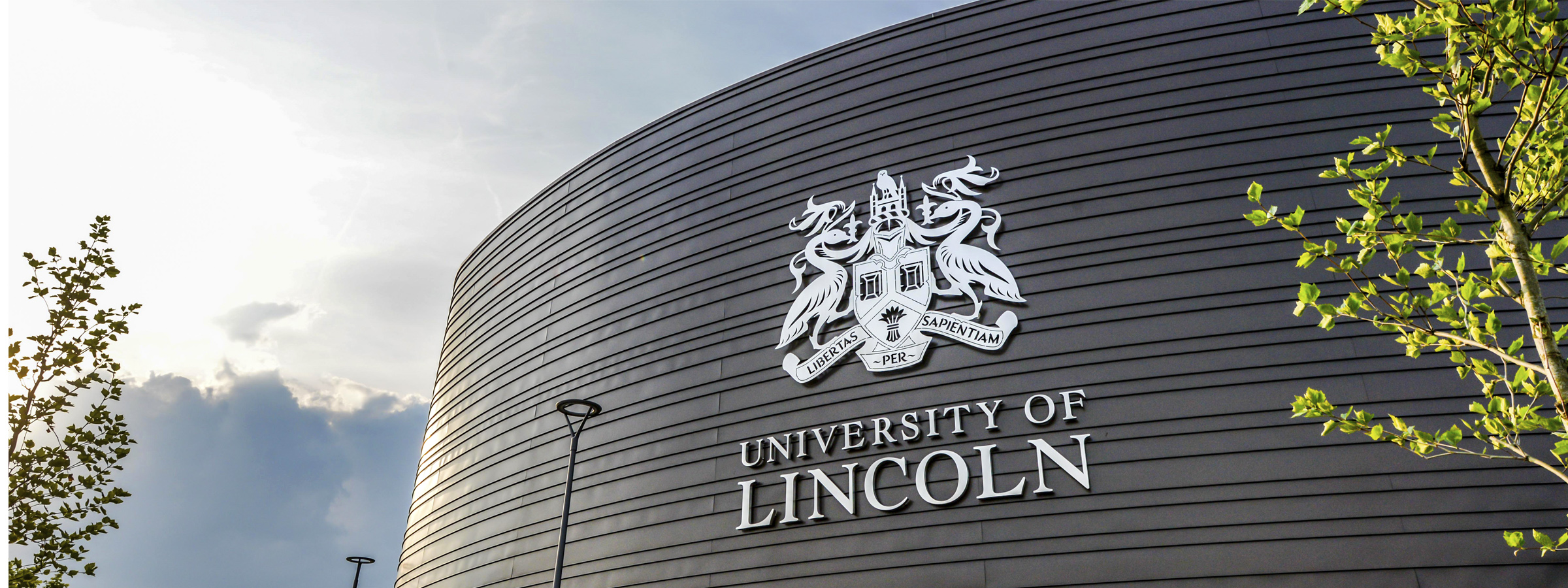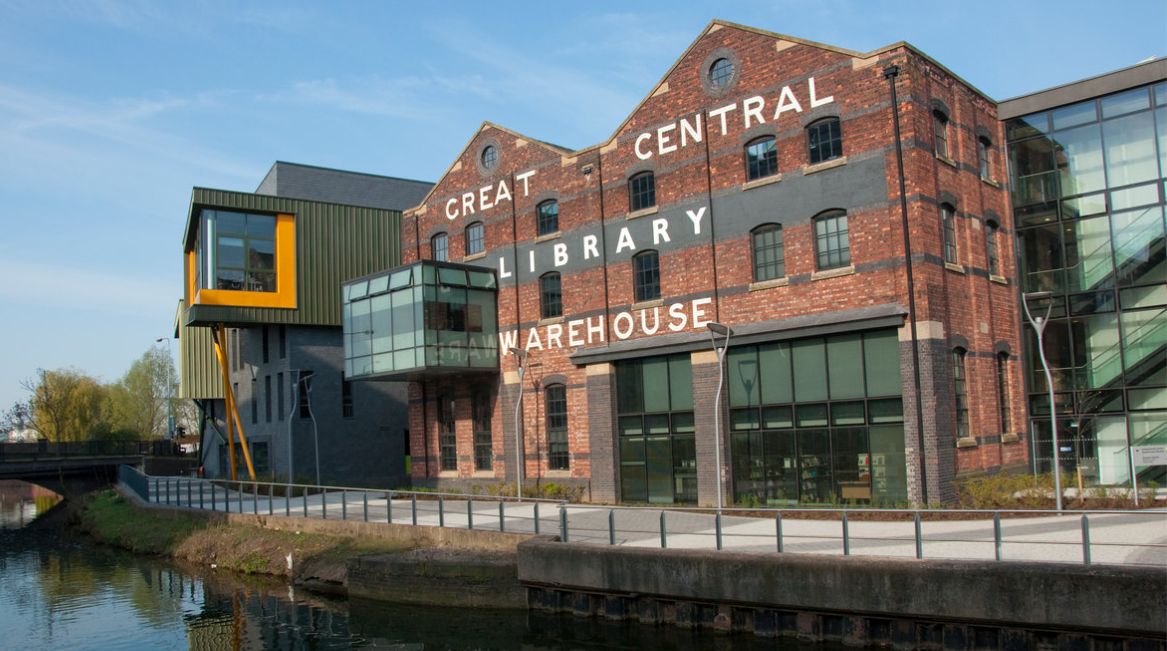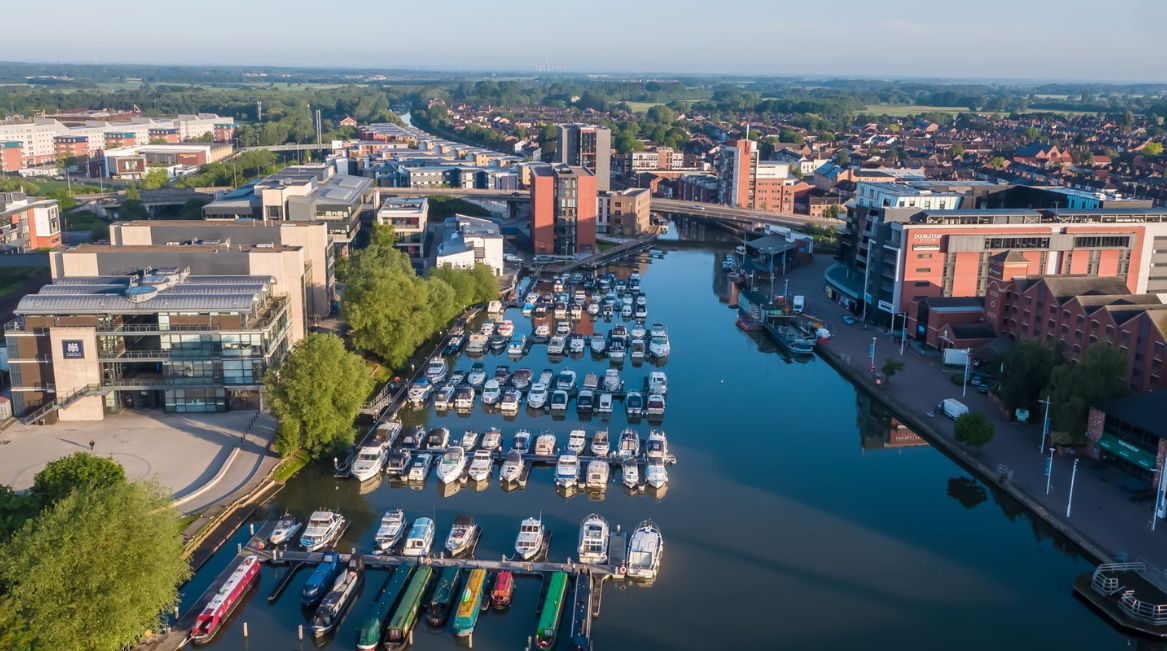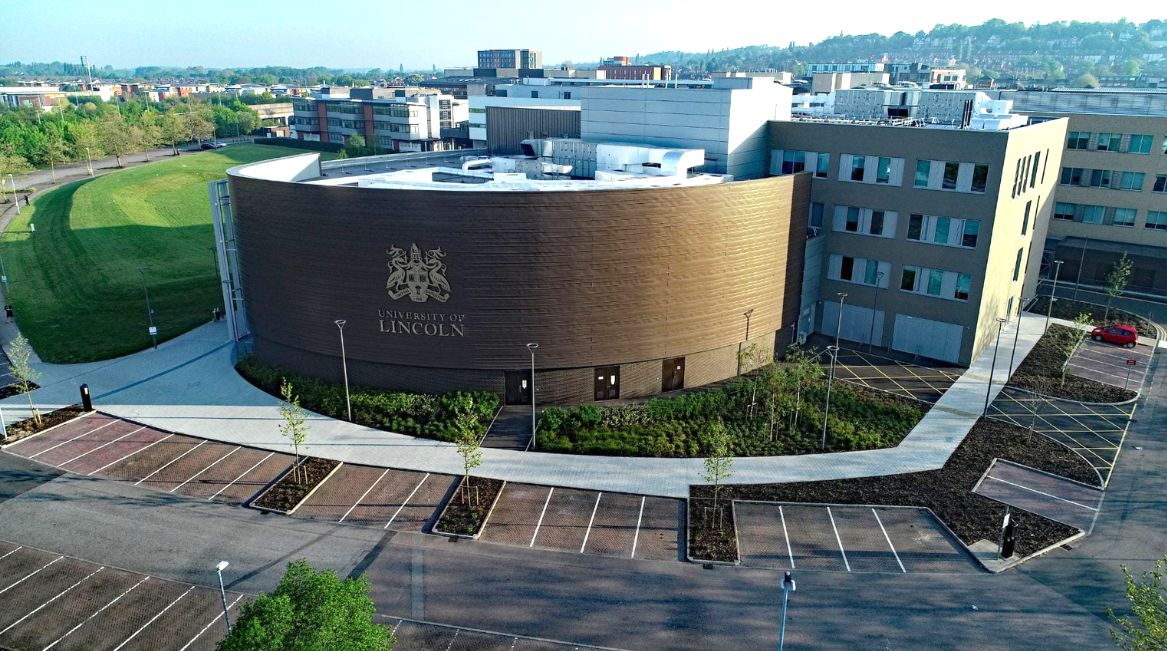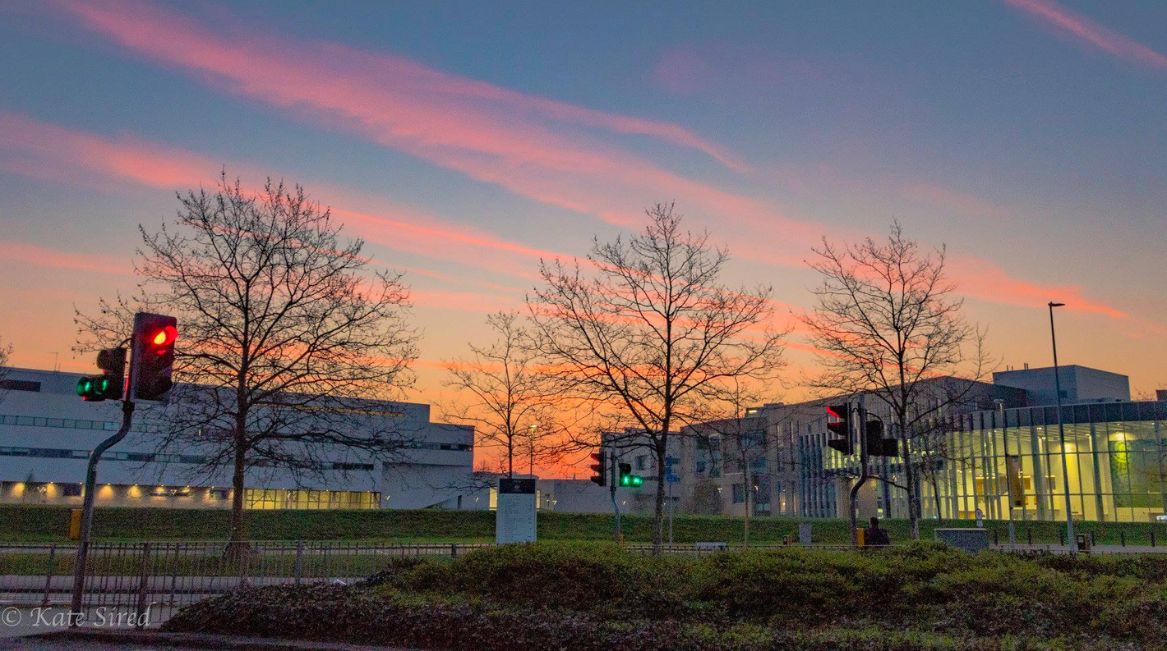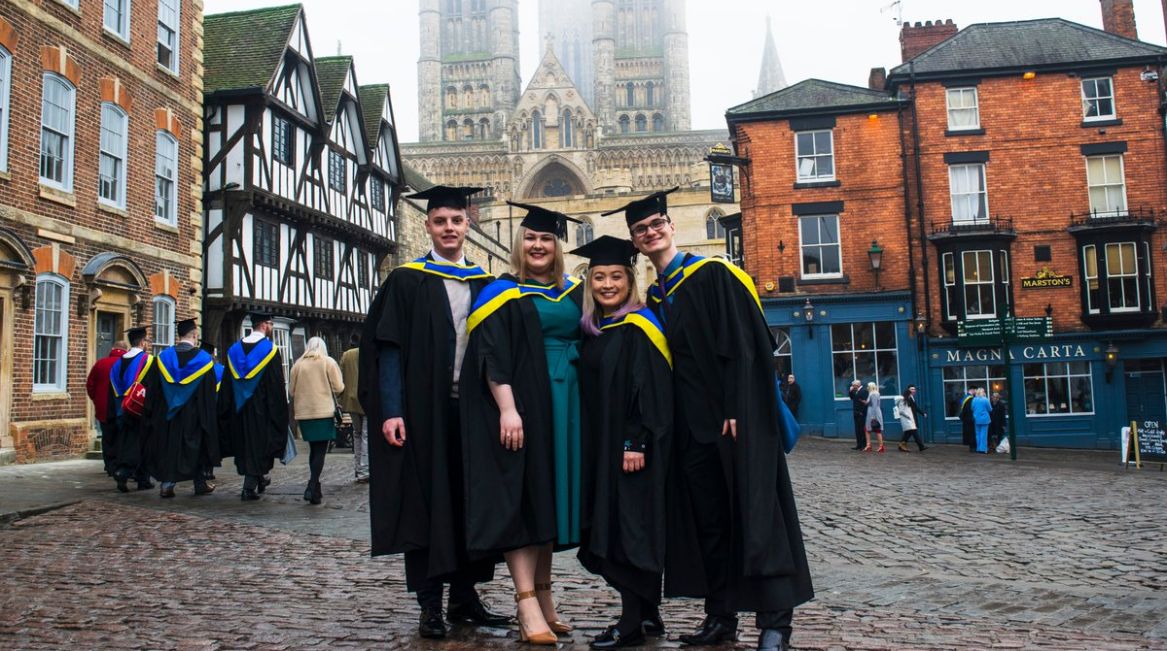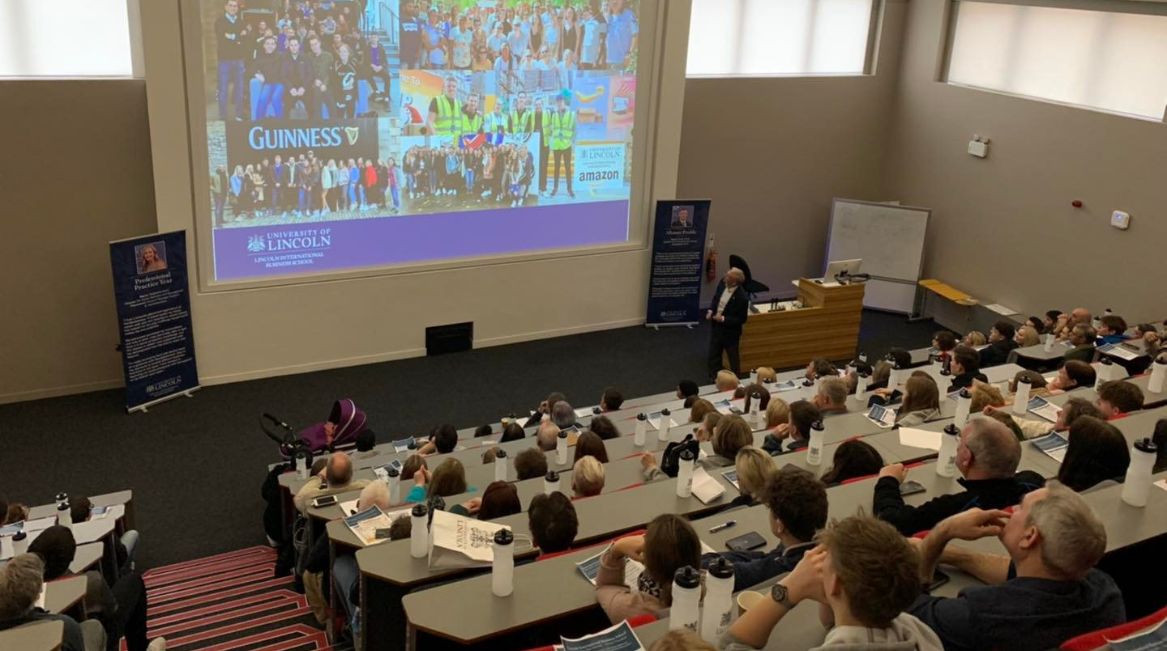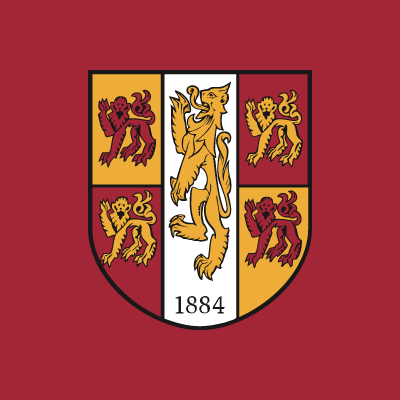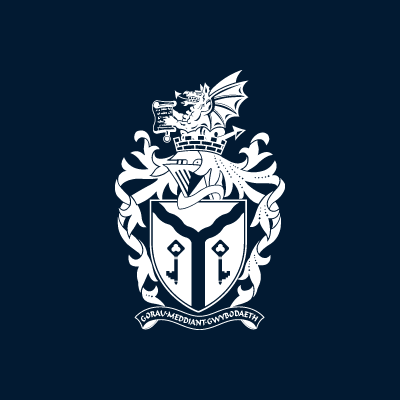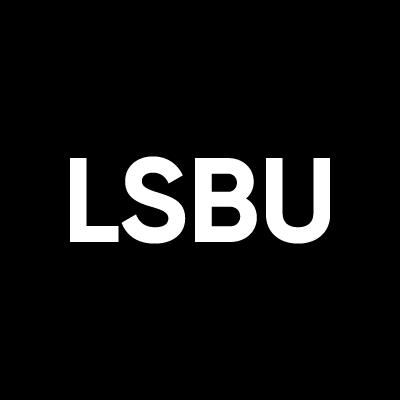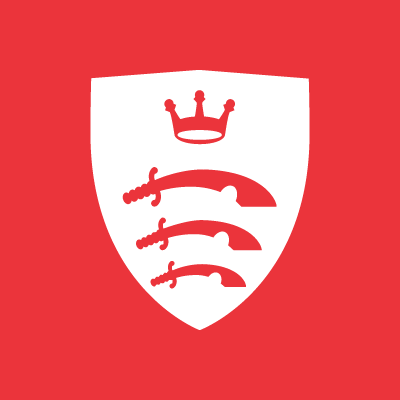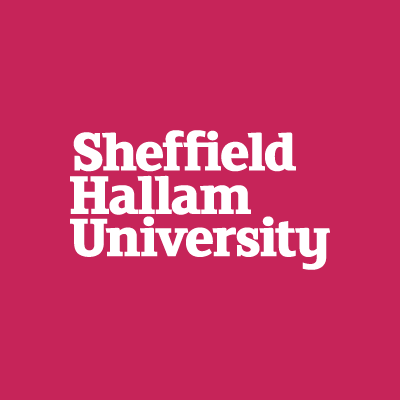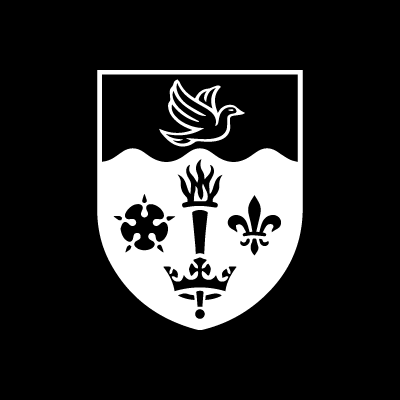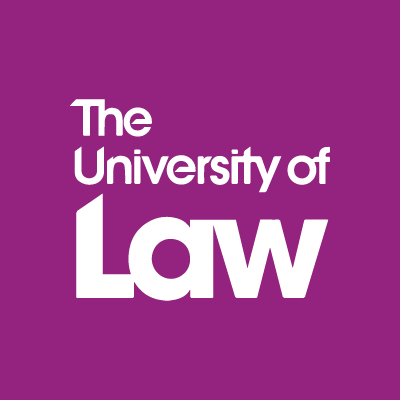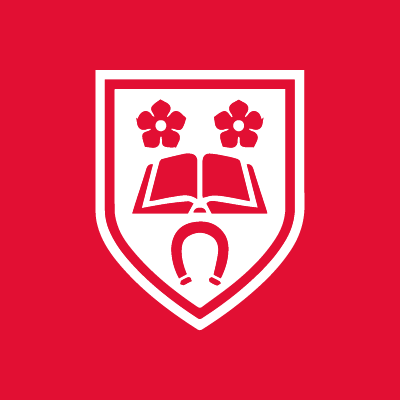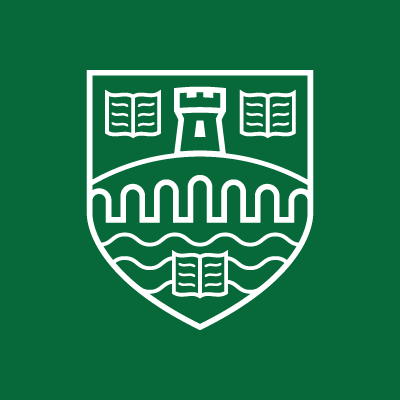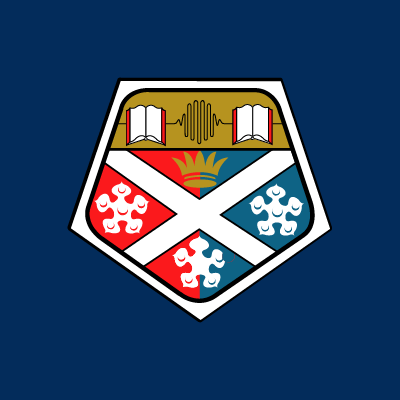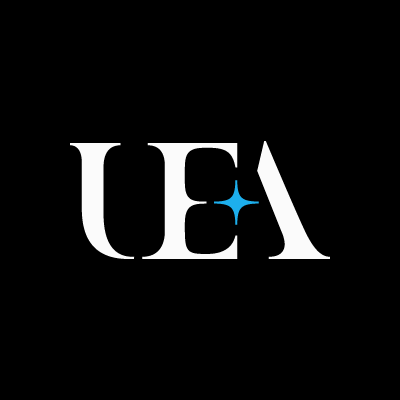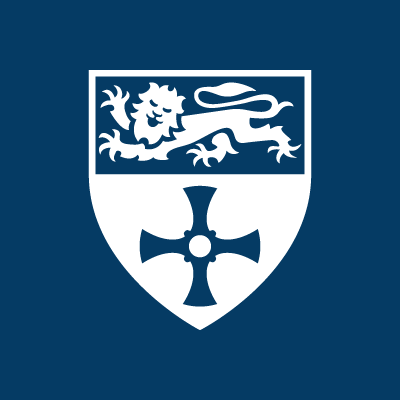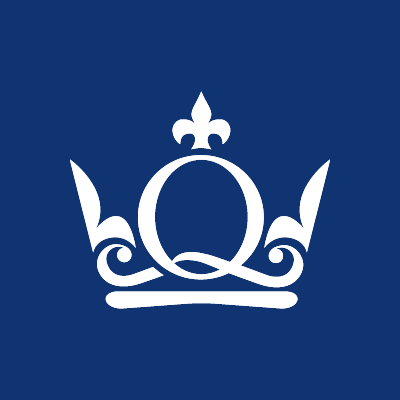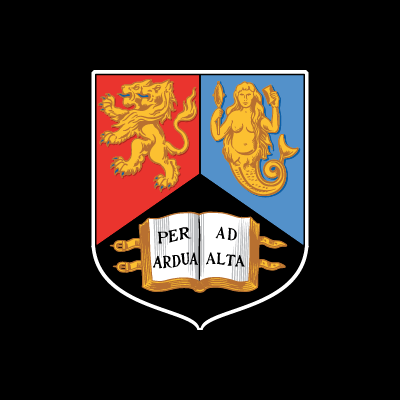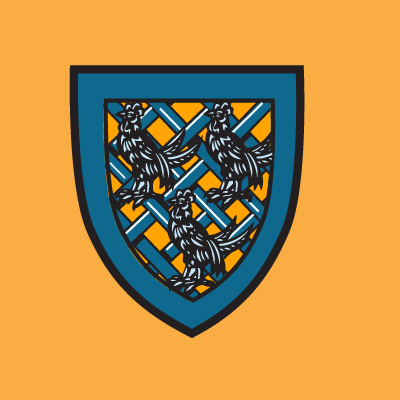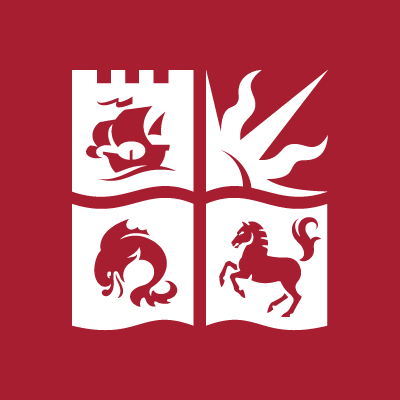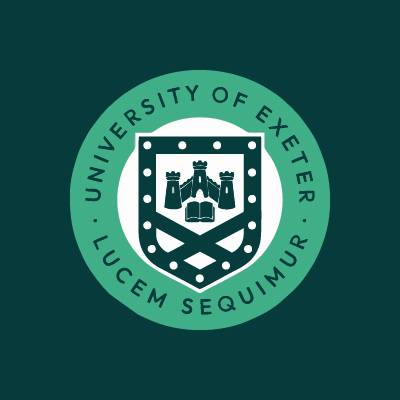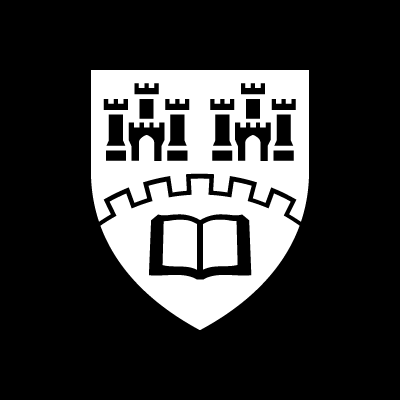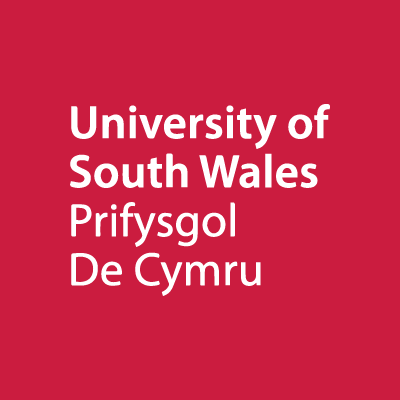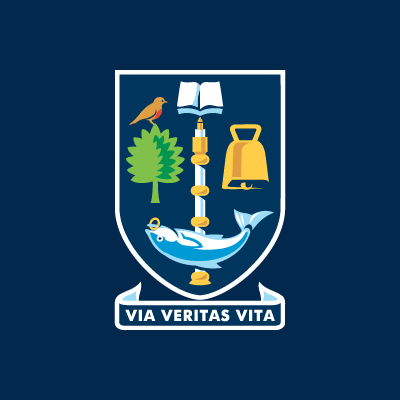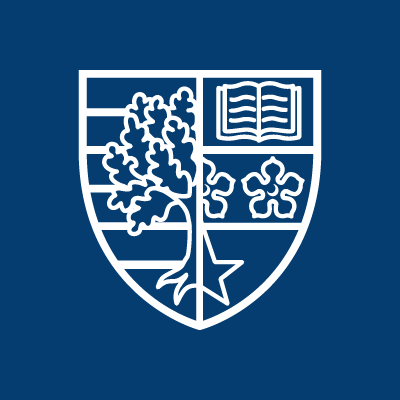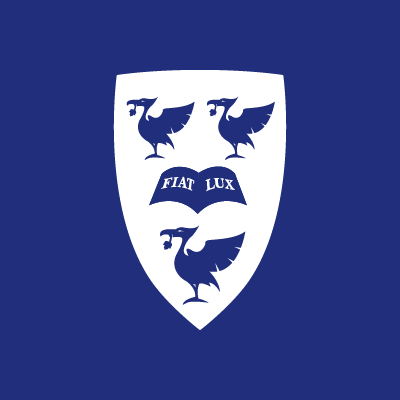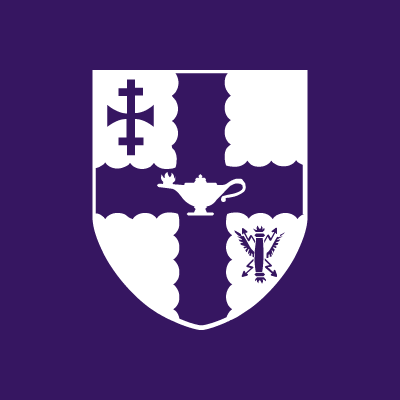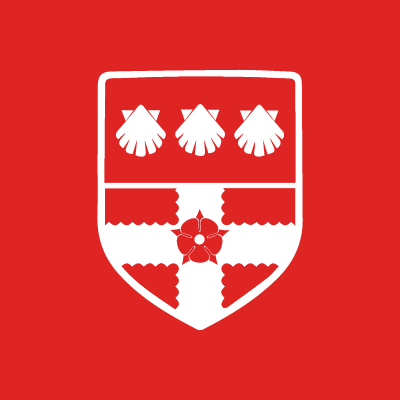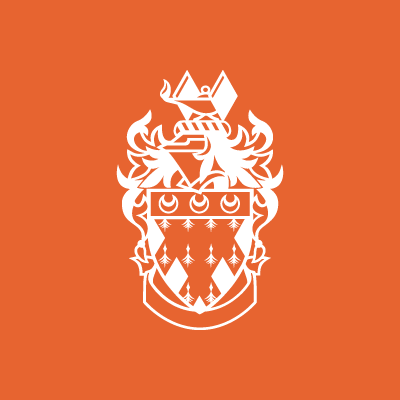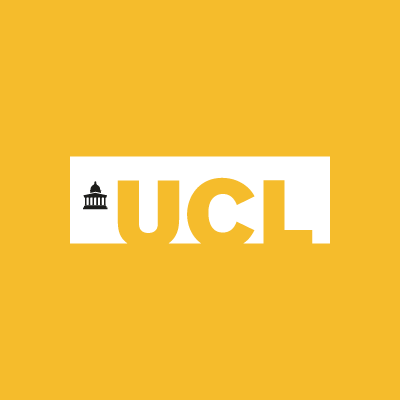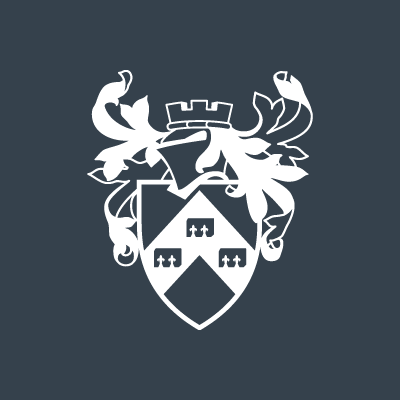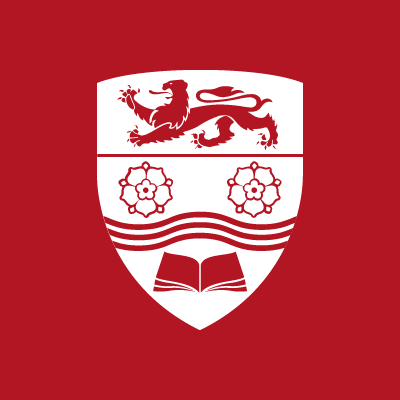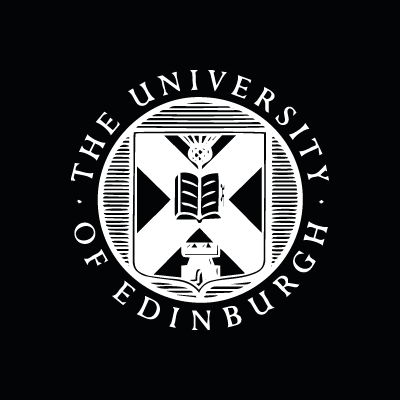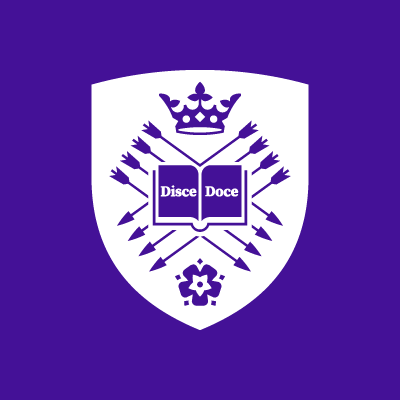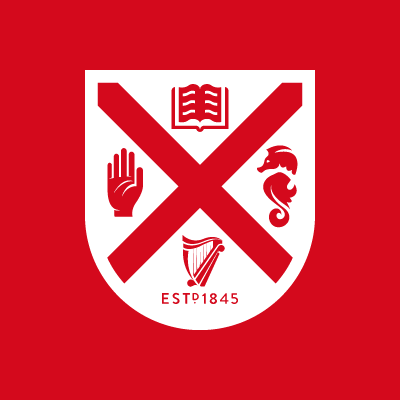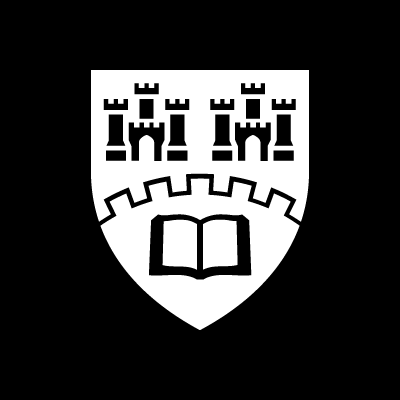University of Lincoln là một trường đại học công lập lâu đời được thành lập vào năm 1861 với tên gọi ban đầu là Hull School of Art. Trải qua nhiều thời kỳ lịch sử, trường cũng đổi tên gọi nhiều lần. Đến năm 1996, University of Lincoln được Nữ hoàng Elizabeth II chính thức khánh thành và ngày nay là mái nhà của hơn 16,000 sinh viên đến từ hơn 100 quốc gia. The Times Good University Guide mô tả University of Lincoln là trường đại học có sự chuyển đổi mạnh mẽ nhất trong thời gian gần đây. Trường có nhiều mối liên kết chặt chẽ với các doanh nghiệp cung cấp cho các sinh viên cơ hội thực tập và việc làm rộng mở. Các cựu sinh viên của Lincoln hiện đang làm việc tại những tập đoàn đa quốc gia như Rolls-Royce, BBC, Rockstar Games và Siemens.
Thành phố
University of Lincoln tọa lạc tại Lincoln - một thành phố hội tụ đủ các yếu tố về lịch sử, văn hóa nhưng vẫn không kém phần hiện đại; Lincoln chắc chắn không chỉ là một thành phố giúp bạn học tập mà còn là nơi lý tưởng để bạn nghiệm cuộc sống như một người Anh bản địa thực thụ.
Các thông tin nổi bật
["#50 \u0110H t\u1ed1t nh\u1ea5t UK (The Guardian University Guide 2025)","#150 \u0110H tr\u1ebb h\u00e0ng \u0111\u1ea7u TG (THE Young University Rankings 2023)","79% nghi\u00ean c\u1ee9u \u0111\u01b0\u1ee3c x\u1ebfp h\u1ea1ng h\u00e0ng \u0111\u1ea7u TG (REF 2021)","#1 UK v\u1ec1 K\u00ed t\u00fac x\u00e1 (WhatUni Student Choice Awards 2024)","#851-900 \u0110H t\u1ed1t nh\u1ea5t th\u1ebf gi\u1edbi (QS World University Ranking 2024)","Ch\u1ee9ng nh\u1eadn V\u00e0ng cho ch\u1ea5t l\u01b0\u1ee3ng gi\u1ea3ng d\u1ea1y (TEF 2023)"]Cơ sở vật chất
Trong hai thập kỷ qua, Trường đã đầu tư khoảng 400 triệu bảng Anh vào Cơ sở Brayford Pool, với các kế hoạch tiếp theo là đầu tư vào cơ sở vật chất bổ sung và tân trang lại các tòa nhà hiện có. Sau khi khánh thành Tòa nhà Isaac Newton dành cho sinh viên ngành khoa học máy tính, kỹ thuật, toán học, vật lý trị giá 28 triệu bảng Anh và Tòa nhà Sarah Swift là nơi có các dãy phòng lâm sàng mô phỏng môi trường bệnh viện và gia đình trị giá 19 triệu bảng Anh, hiện trường đang tiếp tục xây dựng trường Y khoa để giúp đào tạo thế hệ bác sĩ tiếp theo. Ngoài ra, thư viện Great Central Warehouse của trường có hơn 260,000 tạp chí và 750,000 sách in và điện tử, cũng như cơ sở dữ liệu và bộ sưu tập chuyên ngành, phục vụ cho việc học tập và nghiên cứu của sinh viên theo học tại đây.
.jpg)
- Dành cho sinh viên năm nhất
- Căn hộ dành cho 10 - 12 sinh viên
- Nhà bếp đầy đủ tiện nghi
- Phòng đơn có phòng tắm riêng
- Giá phòng: £186.00/tuần
(1).jpg)
- Căn hộ dành cho 5 - 8 sinh viên
- Nhà bếp đầy đủ tiện nghi
- Mỗi phòng được trang bị giường đơn, tủ quần áo, bàn làm việc
- Giá phòng: £99.00 - £126.00/tuần
(1).jpg)
- Nhà bếp đầy đủ tiện nghi
- Phòng studio hoặc phòng tắm riêng cho một người
- Wi-Fi 24 giờ miễn phí
- Giá phòng: £175.00 - £199.00/tuần
(1).jpg)
- Ký túc xá truyền thống
- 19 studio khép kín
- Nhà bếp đầy đủ tiện nghi
- Giá phòng: £186.00 - £199.00/tuần
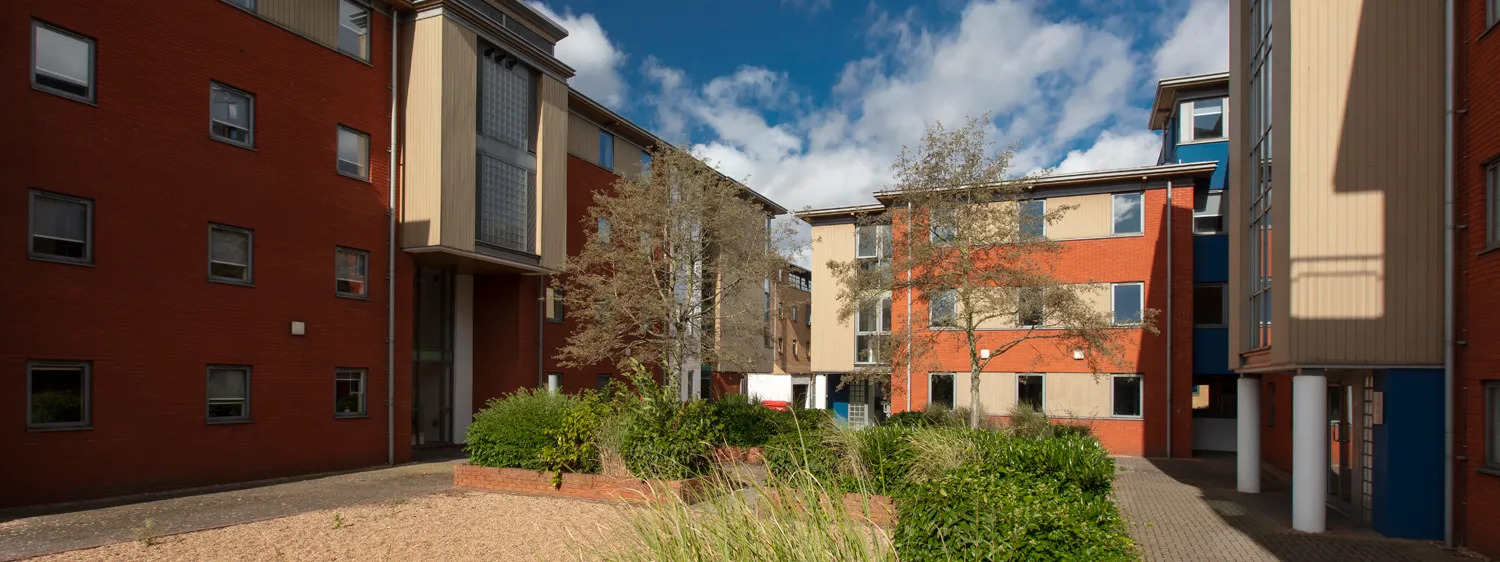
- Gồm 1222 phòng ngủ có phòng tắm riêng trong các căn hộ từ 6 đến 12 phòng ngủ
- Mỗi căn hộ đều có nhà bếp đầy đủ tiện nghi
- Giá phòng: £186,00/tuần
Chương trình giảng dạy
Trường đại học Lincoln được các sinh viên ưu ái và đánh giá cao bởi chất lượng và những liên kết với các doanh nghiệp, các chuyên gia nhiều kinh nghiệm công tác tại các tập đoàn, công ty danh tiếng: BBC, Siemens, Microsoft, Panasonic và Roll Royce để tạo cơ hội cho học sinh có những trải nghiệm quý giá và thực tiễn nhất. Trường chia ra làm 02 khoa chính:
| College of Arts, Social Sciences and Humanities | College of Health and Science |
Học phí
| Phân loại | Mức chi phí trên năm |
| Học phí | £15,900 |
| Nhà ở | £4,752 |
| Ăn uống | £2,500 |
| Tổng chi phí | £23,152 |
| Phân loại | Mức chi phí trên năm |
| Học phí | £16,400 |
| Nhà ở | £4,752 |
| Ăn uống | £2,500 |
| Tổng chi phí | £23,652 |
Học bổng
The Global Leaders Scholarship (50%)
Who is it for? The Global Leaders Scholarship is competitive. In order to apply for the scholarship, students must have an offer from the University of Lincoln for an undergraduate programme, or postgraduate taught programme, commencing in September 2024 or January 2025. Please note that this scholarship is not available to students with home fee status.
For an undergraduate programme, the transcripts should have grades that are equivalent to 128 UCAS points or above, so we can accurately assess the student’s academic potential. For a postgraduate taught programme, the transcripts should have grades equivalent of a 2:1 or higher.
Please visit your country webpage for more detail regarding regional entry requirements that are equivalent to a 2:1.
How much is it worth? 50%
How do I apply?
Students who are in the process of completing their studies at the time of submitting a scholarship application will need to provide us with their most recent academic transcripts.
In addition to meeting the above academic requirements, students must complete an International Scholarship Application Form. The form must be completed and submitted by one of the following closing dates:
For a programme of study commencing in September 2024:
Round 1: Friday 1 December 2023
Round 2: Friday 1 March 2024
Round 3: Saturday 1 June 2024
For a programme of study commencing in January 2025:
Round 1: Tuesday 1 October 2024
Round 2: Friday 1 November 2024
South East Asia Scholarship (£5,000)
Who is it for? The University of Lincoln’s South East Asia Scholarship is designed to help students from across South East Asia to access postgraduate level study at the University of Lincoln. The South East Asia Scholarship is offered as a tuition fee discount against the cost of a postgraduate taught programme commencing in the 2024/25 academic year.
In order to be eligible to receive the South East Asia Scholarship, prospective students must meet the following criteria:
- Be a national of, or have permanent residence in, Brunei, Cambodia, East Timor, Indonesia, Laos, Malaysia, Myanmar, Philippines, Singapore, Thailand, or Vietnam. Hold a Conditional or Unconditional Offer from the University of Lincoln for a full-time postgraduate taught programme commencing in September/October 2024 or January 2025.
- Have completed a Bachelor’s degree (or an equivalent qualification that leads to postgraduate study) from a recognised institution, and have obtained a minimum of a 2:1 classification (or an equivalent).
How much is it worth? The South East Asia Scholarship is valued at £5,000 and will be awarded to eligible students as a tuition fee discount during the first year of their studies.
How do I apply? You do not need to apply for this scholarship. You will automatically be considered for a South East Asia Scholarshi once you have submitted your application to study at the University of Lincoln.
Global Undergraduate Scholarships (£2,000)
Who is it for? The University of Lincoln is delighted to offer Global Undergraduate Scholarships to suitably qualified international applicants for undergraduate programmes commencing in September 2024.
How much is it worth? The Global Undergraduate Scholarship is valued at £2,000 and will be awarded to eligible students as a tuition fee discount for each year of the Undergraduate Programme at the University of Lincoln.
How do I apply? You do not need to apply for this scholarship. You will automatically be considered for a Global Undergraduate Scholarship once you have submitted your application to study at the University of Lincoln.
Global Postgraduate Scholarship (£1,000)
Who Is It for? The University of Lincoln is delighted to offer Global Postgraduate Scholarships to suitably qualified international applicants for postgraduate programmes commencing in September 2024 or January 2025.
How much is it worth? The Global Postgraduate Scholarship is valued at £1,000 and will be awarded to eligible students as a tuition fee discount in the first year of their studies.
How do I apply? Students are not required to apply for this scholarship. You will automatically be considered for a Global Postgraduate Scholarship once you have submitted your application to study at the University of Lincoln.
Khóa học
BA (Hons) Animation and Visual Effects
Animation and Visual Effects at Lincoln offers an introduction to the innovative world of animation and visual effects through moving image, digital visualisation, and contemporary narrative.
The course enables students to develop into creative animators and artists with the flexibility to practise their craft in a variety of media. It covers a range of skills, including the fundamentals of animation, storytelling, performance, design, drawing, 3D modelling, 2D and computer-generated animation, compositing, animation theory, and the production of short films.
The Lincoln School of Film and Media has had success at the Royal Television Society awards. In 2019, student film Papier won Best Animation at the awards. The animation was made by students Tabitha Lay, Emily Leaning, Katie Thomas, Natasha Ray, and Charlie Bartlett. Student animations Harlem Nocturne and Uplifted were also nominated in the Best Animation category at the awards.
BSc (Hons) Agri-Produce and Supply Chain Management
This course can be undertaken as part of a Degree or Higher Apprenticeship. The BSc (Hons) Agri-Produce and Supply Chain Management has been developed in order to prepare students for managing multi-disciplined teams in today's fast-paced food manufacturing environments. Students are introduced to both the theoretical and practical aspects of management within the food manufacturing sector including planning, logistics, technical support and resource management.
The course aims to provide students with the necessary technical knowledge in order to support the safe production of food within their roles.
The programme also aims to equip students with the essential practical and professional transferable skills to enable them to reach their potential within the food sector as well as academic, industrial, commercial, government and environmental settings. The course places considerable emphasis on enhancing intellectual, critical analysis, problem solving, project and time management, report writing, teamwork, ethics, health and safety, intellectual property, information technology and career management.
FdSc Agri-Produce and Supply Chain Management
This course can be undertaken as part of a Degree or Higher Apprenticeship. The FdSc in Agri-Produce and Supply Chain Management has been developed in order to best prepare students for managing multi-disciplined teams in today's fast-paced food manufacturing environments. Students are introduced to both the theoretical and practical aspects of management within food manufacturing sector including planning, logistics, technical support, and resource management.
The course aims to provide the students with the necessary technical knowledge in order to support the safe production of food within their roles.
The FdSc in Agri-Produce and Supply Chain Management also aims to equip undergraduates with the essential practical and professional transferable skills to enable them to reach their potential within the food sector as well as academic, industrial, commercial, government, and environmental settings. To achieve this, the course places considerable emphasis on enhancing intellectual, critical analysis, problem solving, project and time management, report writing, teamwork, ethics, health and safety, intellectual property, information technology, and career management.
BSc (Hons) Animal Behaviour and Welfare
The scientific study of animal behaviour and welfare furthers our understanding of why animals behave in the way that they do, and helps us learn how best to respond to the challenges that animals face when living in captive and wild environments.
This degree employs a multi-disciplinary, research-driven approach to the study of animal behaviour and welfare. The course aims to help students develop the knowledge and skills needed to understand animal behaviour and welfare, working, for example, with insects, reptiles, birds, and mammals.
It is informed by academics who are considered to be at the forefront of their respective fields in welfare assessment, animal management, evolutionary biology, and animal cognition. This includes leading experts Professor Daniel Mills, who specialises in clinical animal behaviour; Professor Anna Wilkinson, who specialises in animal cognition; and Professor Oliver Burman, who specialises in assessment of animal welfare.
Students can participate in a residential field trip in the UK, enabling them to study animals in their natural habitats and develop their academic and professional skills in the field. For UK based field trips, the University will cover costs of transport, accommodation, and meals at the field site.
There is also an overseas field trip available in the third year as part of the optional 'Overseas Field Course' module.
MSci Applied Pharmaceutical Science
Pharmaceutical Science encompasses a range of scientific disciplines, introducing students to the exciting world of drug discovery, development, and management. Our aim at Lincoln is to produce passionate pharmaceutical scientists who are adept in addressing the healthcare challenges of the future and are well prepared for careers as leaders in the pharmaceutical and biotechnology industries.
The MSci Applied Pharmaceutical Science programme begins by offering an insight into the structure, function, and mechanisms of drugs; how different drugs can act on the human body; and how their potentially lifesaving effects can be harnessed safely. During the programme, students will have the opportunity to lead on projects solving real-world problems that the pharmaceutical industry is currently facing.
At Lincoln our academic staff include experienced researchers and practitioners. This innovative programme and curriculum is closely aligned with the pharmaceutical industry and has been developed with employer input to produce high quality work-ready graduates that are actively sought by the pharmaceutical and biotechnology industries.
BA (Hons) Architecture
The BA (Hons) Architecture explores multiple approaches and design practices and aims to assist students in discovering their own voice as a designer. Much of the assessment is through project-based assignments, integrating theoretical, technical and design work. Students are supported in developing written papers, technical studies and design proposals in the studio environment.
Learning and teaching in the studio is informed by current research and the School promotes the exploration of drawing as a tool of observation, analysis and communication across a range of techniques from hand sketching to sophisticated computer representations. The School's computer aided design and workshop facilities allow students the opportunity to explore and communicate design using the most up-to-date techniques, both real and virtual.
Professional standards of exhibition presentation are fostered by the course's association with the School's Design for Exhibition and Museums course. The evolution of their sketchbook and portfolio can help students to reflect upon their personal and professional development.
This programme is delivered at both our Brayford Pool Campus, Lincoln and the School of Higher and Professional Education (SHAPE), Vocational Training Council (VTC) in Hong Kong. Prospective candidates can apply to study either at either the Lincoln campus or at Hong Kong SHAPE campus. Visiting and exchange opportunities are provided regularly.
BArch (Hons) Architecture
The BArch (Hons) degree aims to prepare students for a career in the exciting field of architectural practice, placing a strong emphasis on design and creativity. Based in the historic city of Lincoln with roots in Roman Britain, the University's location provides an inspiring context in which to explore architecture.
The Lincoln School of Architecture and the Built Environment is a cooperative, multidisciplinary environment for sharing ideas, which aims to support students in discovering their own design approach. There is a strong emphasis on design and creativity and the course aims to prepare students for a global career in the exciting field of architectural practice.
The course forms the first stage of a three-part programme of education and training for aspiring architects. The University of Lincoln also runs RIBA / ARB Parts 2 and 3 programmes, and all three parts are required to register as an architect in the UK.
BSc (Hons) Banking and Finance
Lincoln's Banking and Finance degree is aimed at those who aspire to a career in range of industry roles including securities analyst, financial or investment manager, or as a private, commercial, or investment banker.
During this course, students are encouraged to examine how the economy works, how decisions are made, and how financial systems and capital markets operate in an international context. Students are asked to explore how government policies influence stock markets and prices, as well as how private and corporate wealth is created.
A number of our academics teaching Banking and Finance at Lincoln have knowledge and practical expertise gained from experience in the sector, which gives students the opportunity to learn about real-world scenarios.
BSc (Hons) Biochemistry
Biochemistry offers an understanding of the biological and chemical processes that allow life to thrive, giving us the tools we need to solve key challenges in cell biology, pathology, pharmacology, physiology, and genetics. Advances in the field have revolutionised our knowledge of how biochemistry works and the mechanisms that underpin a wide range of cellular processes. This enables us to respond to human health problems and diseases by rationally designing new strategies and drugs as treatments.
Our BSc (Hons) Biochemistry degree takes a research-centred approach to teaching and learning, providing the opportunity to work closely with academics on collaborative research projects. The course examines the chemistry of life at a molecular level and reflects the University's expertise in pharmacology, biomedical science, biology, and biotechnology. Students have the opportunity to develop skills in practical laboratory techniques, data interpretation, critical analysis, computational skills allied to biochemistry, and scientific writing.
There is an optional overseas field trip available in the final year. This provides the opportunity to study and test biological phenomena in their natural environment.
MBio Biochemistry
Biochemistry offers an understanding of the biological and chemical processes that allow life to thrive, giving us the tools we need to solve key challenges in cell biology, pathology, pharmacology, physiology, and genetics.
Advances in the field have revolutionised our knowledge of how biochemistry works and the mechanisms that underpin a wide range of cellular processes. This enables us to respond to human health problems and diseases by rationally designing new strategies and drugs as treatments.
Our BSc (Hons) Biochemistry degree takes a research-centred approach to teaching and learning, providing the opportunity to work closely with academics on collaborative research projects. The course examines the chemistry of life at a molecular level and reflects the University's expertise in pharmacology, biomedical science, biology, and biotechnology. Students have the opportunity to develop skills in practical laboratory techniques, data interpretation, critical analysis, computational skills allied to biochemistry, and scientific writing.
There is an optional overseas field trip available in the final year. This provides the opportunity to study and test biological phenomena in their natural environment.
BSc (Hons) Biology
Biology is the science of life itself, exploring the structure, function, growth, origin, evolution, and distribution of living organisms.
The BSc (Hons) Biology degree at Lincoln covers a diverse range of subject areas while allowing students to develop their own specialisms. The course includes opportunities for overseas field work to study living organisms in their natural environments.
Students join a vibrant academic community in the Department of Life Sciences and can benefit from research-focused teaching by academics. There is an emphasis on practical work, with students conducting their own projects alongside academics and practising researchers.
Students can participate in a residential field trip in the UK, enabling them to study animals and plants in the wild. For UK based field trips the University will cover costs of transport, accommodation and meals at the field site.
There is also an overseas field trip available in the final year as part of the optional 'Overseas Field Course' module. Further details can be found in the Field Trips section.
MBio Biology
Biology is the science of life itself, exploring the structure, function, growth, origin, evolution, and distribution of living organisms.
The BSc (Hons) Biology degree at Lincoln covers a diverse range of subject areas while allowing students to develop their own specialisms. The course includes opportunities for overseas field work to study living organisms in their natural environments.
Students join a vibrant academic community in the Department of Life Sciences and can benefit from research-focused teaching by academics. There is an emphasis on practical work, with students conducting their own projects alongside academics and practising researchers.
Students can participate in a residential field trip in the UK, enabling them to study animals and plants in the wild. For UK based field trips the University will cover costs of transport, accommodation and meals at the field site.
There is also an overseas field trip available in the final year as part of the optional 'Overseas Field Course' module. Further details can be found in the Field Trips section.
BEng (Hons) Biomedical Engineering
Biomedical engineering is a multidisciplinary field that combines biology and engineering, applying engineering principles and materials to medicine and healthcare. From developing and improving new machinery, such as robotic surgery equipment, to creating better and more reliable replacement limbs, the work of biomedical engineers is helping to pave the way for new methods of treating injuries and diseases.
This research-informed programme aims to develop industry-ready graduates with product design and innovative sense who are highly skilled and creative biomedical engineers, able to adapt to new challenges and deliver sustainable solutions for modern society.
Project-based learning is a key feature of the programme and students can undertake group product design and development projects in the first and second years. Students will also have the opportunity to design and develop a working medical device.
BSc (Hons) Biomedical Science
Biomedical scientists play a key role in improving human health. By exploring life processes in humans they lay the foundations for understanding and investigating health, disease, treatment, and prevention. Biomedical Science at Lincoln offers a broad scientific base, taking a multi-disciplinary approach that incorporates lectures, seminars, and laboratory-based work. The course emphasises the development of transferable skills in information retrieval, data analysis, problem solving, and critical thinking, as well as hands-on experience.
This degree is accredited by the Institute of Biomedical Science (IBMS). Completion of a Biomedical Science degree accredited by the IBMS, together with successful completion of a portfolio of competencies after gaining six to 12 months' experience in an NHS laboratory and gaining HCPC registration are all essential steps to becoming a qualified biomedical scientist.
Our teaching team includes specialist staff from local and regional hospitals, research scientists, and pharmaceutical industry experts. Their areas of speciality currently cover diabetes, inflammation, cancer, and neurodegenerative and cardiovascular disease.
Students on this programme are able to undertake an optional overseas field trip in their third year. Those who choose to participate must cover the cost of their own flights, but accommodation and meals at the field site are covered by the University. Previously, students have visited the Andean Cloud Forest in Ecuador, the Atacama Desert in Chile, the Mankwe Wildlife Reserve in South Africa, and Peniche in Portugal.
MBio Biomedical Science
Biomedical scientists play a key role in improving human health. By exploring life processes in humans they lay the foundations for understanding and investigating health, disease, treatment, and prevention.
Biomedical Science at Lincoln offers a broad scientific base, taking a multi-disciplinary approach that incorporates lectures, seminars, and laboratory-based work. The course emphasises the development of transferable skills in information retrieval, data analysis, problem solving, and critical thinking, as well as hands-on experience.
This degree is accredited by the Institute of Biomedical Science (IBMS). Completion of a Biomedical Science degree accredited by the IBMS, together with successful completion of a portfolio of competencies after gaining six to 12 months' experience in an NHS laboratory and gaining HCPC registration are all essential steps to becoming a qualified biomedical scientist.
Our teaching team includes specialist staff from local and regional hospitals, research scientists, and pharmaceutical industry experts. Their areas of speciality currently cover diabetes, inflammation, cancer, and neurodegenerative and cardiovascular disease.
Students on this programme are able to undertake an optional overseas field trip in their third year. Those who choose to participate must cover the cost of their own flights, but accommodation and meals at the field site are covered by the University. Previously, students have visited the Andean Cloud Forest in Ecuador, the Atacama Desert in Chile, the Mankwe Wildlife Reserve in South Africa, and Peniche in Portugal.
BSc (Hons) Bioveterinary Science
The BSc (Hons) Bioveterinary Science degree at Lincoln gives students the opportunity to explore the science that underlies animal health and disease.
The degree combines key concepts in animal science with relevant laboratory, field, and computer analysis. Students are introduced to the processes surrounding animal health including life histories of pathogens and parasites, infection and immunity, preventative measures, diagnosis, and treatments. There is the opportunity to study these issues in a range of animal species, including exotic, companion, livestock and wild animals, as well as in humans.
Students also have the option of a field trip in their final year as part of the optional 'Overseas Field Course' module. This will provide the opportunity to do research in a novel environment and to study local plants and animals. Destinations may vary, but have previously included the cloud forests of Ecuador, the Mankwe Wildlife Reserve in South Africa, and Peniche in Portugal.
BA (Hons) Business
Graduates with a broad knowledge base in finance, marketing, management, and economics are well-placed to embrace opportunities in a range of exciting business contexts.
Business at Lincoln combines elements of all of these disciplines. It offers students the opportunity to develop the critical-thinking, problem-solving, and analytical skills needed to enter the competitive world of business.
The course takes an international perspective to help prepare students for the global nature of modern business practice, offering the opportunity to specialise in areas of particular interest and acquire workplace experience.
The University of Lincoln is proud of its approach to nurturing entrepreneurialism in its students. Lecturers and visiting practitioners provide insights into current practice and global issues, while real-life projects help challenge students to develop problem-solving skills.
As part of this course, students can choose a one-year work placement following the second year. They are expected to source their own paid placement, and tutors can provide support during the process if required. Students who successfully complete their studies with a year on work placement will receive the award title BA (Hons) Business (with Work Placement). Those who do not will receive a BA (Hons) Business award, or equivalent exit award.
There are no tuition fees for the work placement year, but students will need to pay for their own travel, accommodation, and general living costs.
BA (Hons) Business Economics
The ability to analyse and solve business problems in market economies is highly sought after in many types of careers, both in the UK and around the world.
BA (Hons) Business Economics at Lincoln combines topics in business and economics with the opportunity to develop the skills and problem-solving abilities needed to tackle the multi-faceted problems faced by today's business managers. The course explores business, industrial, macro-economic, and international economic contexts from an economist's analytic perspective. It enables students to develop key skills in economics, finance, and business.
The programme has been designed to provide a theoretical understanding of the economic decisions faced by businesses, with a focus on application within national and international settings. It is aimed at students who wish to study an economics degree, but who have not followed economics or mathematics at A Level, or its equivalent, and who are looking for a business-focused programme without a considerable mathematics component.
BA (Hons) Business Management
The BA (Hons) Business Management programme offers students the opportunity to advance their career through engaging in personal and professional development, with the aim of increasing management competence and enhancing overall employability.
This work-based distance learning programme is designed to provide those working within an appropriate environment, and commonly already holding professional qualifications, the management skills to effectively and efficiently manage their work areas.
The degree draws upon specialised knowledge and skills you have already developed during the course of your employment.
The degree encourages the development of lifelong learners and offers the following key features:
- A blended learning approach, drawing on University of Lincoln's expertise in delivering online programmes to part-time students in full-time employment
- An innovative and creative approach in teaching, learning and assessment, drawing on a range of digital and technological learning tools
- A learning experience, offering students a wider critical perspective on the consequences of individual decisions and actions and on the ethics of being socially responsible, including corporate social responsibility, part of the Lincoln International Business School's 'responsible futures principles'.
- A clear focus on the student experience and academic, pastoral and professional support and care.
BA (Hons) Business and Finance
Adaptability and a wide range of industry skills offer graduates a strong platform to target careers in a variety of business sectors.
BA (Hons) Business and Finance at Lincoln aims to equip students with the tools and knowledge to operate in a range of business environments, and to develop a broad understanding of business and finance from an international perspective.
The course introduces business and finance theory, including the importance of data analysis, legal knowledge, marketing, and operations. Modules have been designed to enable students to develop the ability to apply learning to practical situations.
BA (Hons) Business and Management
At the heart of every successful business are people with the expertise to use physical and human resources effectively, leading teams to embrace the challenges they face and find the best way forward.
Business and Management at Lincoln is designed for students who want to work in the fast-paced global world of business, whether it is in a private, public, or a third sector organisation.
The course aims to help students to develop the capacity to address the challenges of business practice by managing complexity, being confident in conditions of uncertainty, and positively responding to unintended consequences. Students are encouraged to think and act as managers, developing their critical-thinking skills, and building a broad knowledge of core business subject areas.
It aims to produce enterprising, highly employable graduates with an international perspective who are ready to work in a variety of settings, co-ordinating teams, managing projects, and delivering business strategies.
Students who successfully complete their degree with a one year placement will receive the award title BA (Hons) Business and Management (with Work Placement). Those who choose not to complete a placement will receive a BA (Hons) Business and Management award, or equivalent exit award.
BA (Hons) Business and Marketing
The BA (Hons) Architecture explores multiple approaches and design practices and aims to assist students in discovering their own voice as a designer. Much of the assessment is through project-based assignments, integrating theoretical, technical and design work. Students are supported in developing written papers, technical studies and design proposals in the studio environment. Learning and teaching in the studio is informed by current research and the School promotes the exploration of drawing as a tool of observation, analysis and communication across a range of techniques from hand sketching to sophisticated computer representations. The School's computer aided design and workshop facilities allow students the opportunity to explore and communicate design using the most up-to-date techniques, both real and virtual. Professional standards of exhibition presentation are fostered by the course's association with the School's Design for Exhibition and Museums course. The evolution of their sketchbook and portfolio can help students to reflect upon their personal and professional development. This programme is delivered at both our Brayford Pool Campus, Lincoln and the School of Higher and Professional Education (SHAPE), Vocational Training Council (VTC) in Hong Kong. Prospective candidates can apply to study either at either the Lincoln campus or at Hong Kong SHAPE campus. Visiting and exchange opportunities are provided regularly.
BA (Hons) Business with English
BA (Hons) Business with English is designed for students whose first language is not English. The programme allows students the opportunity to explore a range of business topics designed to enable them to understand and develop the skills needed to work for a business operating in a global context. The programme is made up of three main streams of academic thought: Management, Marketing, and Business English. During the programme students can develop knowledge, understanding, and capability in key business functions. Students also study modules in English language designed to develop skills not only in communication, but also in negotiation. The programme aims to prepare students for a career in international business and to increase their geographical mobility.
BA (Hons) Business with Entrepreneurship
Great businesses begin with great ideas, and they have a better chance of flourishing with guidance from experienced professionals in a supportive environment. BA (Hons) Business with Entrepreneurship at Lincoln is designed for students who want to learn about business management and theory to help them start their own business or acquire the key employability skills desired by industries and organisations. This course offers the opportunity to study business law, ethical and socially responsible entrepreneurship, the principles of business and operational management, e-business, and marketing. It encourages students to put their learning into practice within a structured programme of theoretical scholarship.
BSc (Hons) Chemistry
Concerned with the study of matter, its properties and reactions, chemistry plays a key role in tackling global challenges such as energy production, health and wellbeing, food security and the use of natural resources. The programme aims to develop the analytical and practical skills required to prepare students for a wide range of science-related careers.
At Lincoln, we aim to integrate the core chemistry disciplines with advanced topics aligned to the major scientific challenges of the 21st Century. These include nanoscience for new materials and devices, the chemistry/biology interface for drugs discovery, nuclear chemistry for safe energy generation, biotechnology for new manufacturing methods, and sensors for forensic medical and environmental applications.
Students have the opportunity to engage with staff in research projects and this research-focused environment can enable students to develop practical expertise and apply theoretical knowledge to the role of chemistry in the modern world.
MChem Chemistry
Concerned with the study of matter, its properties and reactions, chemistry plays a key role in tackling global challenges such as energy production, health and wellbeing, food security and the use of natural resources. The programme aims to develop the analytical and practical skills required to prepare students for a wide range of science-related careers.
The MChem Chemistry degree aims to integrate the core chemistry disciplines with advanced topics aligned to the major scientific challenges of the 21st Century. These include nanoscience for new materials and devices, the chemistry/biology interface for drugs discovery, nuclear chemistry for safe energy generation, biotechnology for new manufacturing methods, and sensors for forensic medical and environmental applications.
Students have the opportunity to engage with staff in research projects and this research-focused environment can enable students to develop practical expertise and apply theoretical knowledge to the role of chemistry in the modern world.
BSc (Hons) Chemistry for Drug Discovery and Development
Join the fight against disease by learning how to create better and safer drugs for society with a degree in Chemistry for Drug Discovery and Development.
Our BSc (Hons) Chemistry for Drug Discovery and Development aims to develop skills in the design and development of active molecules, all the way through to the final pharmaceutical products available to patients. Students can gain knowledge of synthetic chemistry and develop experience in drug formulation and manufacture within the regulatory context of the pharmaceutical industry. This will involve substantial practical experience of advanced laboratory techniques.
On this programme, students have the opportunity to develop a comprehensive knowledge of chemistry alongside subject-specific and generic skills to develop a strong understanding of how chemistry is applied to problems with direct impact on society. Our programmes are designed to produce highly employable graduates with a broad background in academic chemistry and significant experience of the application of chemistry in contexts relevant to society and industry.
MChem Chemistry for Drug Discovery and Development
Join the fight against disease by learning how to create better and safer drugs for society with a degree in Chemistry for Drug Discovery and Development.
The MChem Chemistry for Drug Discovery and Development is designed to develop skills in the design and development of active molecules, all the way through to the final pharmaceutical products available to patients. Students can gain knowledge of synthetic chemistry and develop experience in drug formulation and manufacture within the regulatory context of the pharmaceutical industry. This will involve substantial practical experience of advanced laboratory techniques.
On this programme, students have the opportunity to develop a comprehensive knowledge of chemistry alongside subject-specific and generic skills to develop a strong understanding of how chemistry is applied to problems with direct impact on society. Our programmes are designed to produce highly employable graduates with a broad background in academic chemistry and significant experience of the application of chemistry in contexts relevant to society and industry.
BSc (Hons) Chemistry with Education
By offering a thorough grounding in chemistry along with the intellectual and research skills needed for a career in teaching, this course aims to develop students with the skills to teach the next generation about the fundamental importance of chemistry.
The programme has been developed in collaboration with the University's School of Education. This School works closely with primary and secondary schools, creating a curriculum and mode of teaching that is in line with employer expectations. As part of the degree, there may be the opportunity to undertake a teaching placement with a local school in addition to other educational experiences. Students are responsible for their own travel, accommodation, and general living costs when undertaking these placements.
The course is designed to encourage a collaborative approach with students engaging with one another, academics and teachers. This can support critical reading, debate, reflection on experience and research into topics of interest.
MChem Chemistry with Education
By offering a thorough grounding in chemistry along with the intellectual and research skills needed for a career in teaching, this course aims to develop students with the skills to teach the next generation about the fundamental importance of chemistry.
The programme has been developed in collaboration with the University's School of Education. This School works closely with primary and secondary schools, creating a curriculum and mode of teaching that is in line with employer expectations.
As part of the degree, there may be the opportunity to undertake a teaching placement with a local school in addition to other educational experiences. Students are responsible for their own travel, accommodation, and general living costs when undertaking these placements.
The course is designed to encourage a collaborative approach with students engaging with one another, academics and teachers. This can support critical reading, debate, reflection on experience, and research into topics of interest.
BSc (Hons) Chemistry with Mathematics
Knowledge of advanced mathematics provides a key to understanding the diversity and complexity of the chemical world. This joint honours degree integrates these fundamental subjects, providing students with the chance to examine the relationship between the disciplines and the important roles they play in different contexts.
The chemistry curriculum on this programme has been devised to integrate the main sub-disciplines of chemistry effectively, relating physical chemistry concepts to aspects of organic and inorganic chemistry, and to the methods used for analysing substances. The programme provides the opportunity to gain a comprehensive knowledge of chemistry alongside subject-specific and generic skills with the aim of developing a strong understanding of how chemistry is applied to problems with direct impact on society.
Chemistry at Lincoln is designed to produce employable graduates with a broad background in academic chemistry and significant experience of the application of chemistry in contexts relevant to society and industry.
MChem Chemistry with Mathematics
Knowledge of advanced mathematics provides a key to understanding the diversity and complexity of the chemical world. This joint honours degree integrates these fundamental subjects, providing students with the chance to examine the relationship between the disciplines and the important roles they play in different contexts.
The chemistry curriculum on this programme has been devised to integrate the main sub-disciplines of chemistry effectively, relating physical chemistry concepts to aspects of organic and inorganic chemistry, and to the methods used for analysing substances. The programme provides the opportunity to gain a comprehensive knowledge of chemistry alongside subject-specific and generic skills with the aim of developing a strong understanding of how chemistry is applied to problems with direct impact on society.
Chemistry at Lincoln is designed to produce employable graduates with a broad background in academic chemistry and significant experience of the application of chemistry in contexts relevant to society and industry.
BA (Hons) Classical Studies
Classical Studies at Lincoln offers the opportunity to explore and examine the history, culture, and language of the ancient Greek and Roman worlds to discover how they have influenced and shaped the society in which we live today.
BA (Hons) Classical Studies is an interdisciplinary degree programme. Students have the opportunity to study the ancient world alongside experts in history and archaeology, the history of art and architecture, heritage and conservation, literary and cultural studies, philosophy, and English and drama. The curriculum reflects the variety and richness of research and teaching within the School of History and Heritage, and the College of Arts more widely.
The city of Lincoln takes its name from Lindum Colonia: a Roman legionary fortress established in the middle of the first century AD which became a settlement for retired soldiers a generation later. Above and below ground it preserves traces of this history, from fragments of walls and aqueducts to the street plan itself. Traffic still travels through the Newport Arch, its third-century gate, while the University is situated on the Brayford Pool, an inland port with remains of the Roman-period waterfront, connected to the River Trent.
Staff at the University of Lincoln teaching on the Classical Studies programme work in exciting areas, from the making of Roman London to the fall of the Empire in the West, from the historiography of the Hellenistic world to language and literacy in the western Mediterranean. Research informs teaching on all our courses, and staff aim to support students as they access specialist resources for their own studies, such as the built environment of Lincoln itself and the excavated artefacts housed in The Collection, the city's archaeological museum to which we have privileged access.
BSc (Hons) Computer Science
Society is in the midst of a digital revolution, from the smartphones we use to navigate our daily lives to the advances in artificial intelligence set to transform global industries. The BSc (Hons) Computer Science degree provides students with the opportunity to develop the experience, skills, and knowledge to design and develop a variety of software and hardware computing solutions for real-world problems. Particular attention is paid to cutting-edge topics, such as artificial intelligence and machine learning, in addition to core computer science disciplines. This aims to ensure that students' studies are at the forefront of research in the field and meeting the needs of the computing industry. In addition, students are encouraged to work with academics on research projects. The course is designed to provide a broad foundation in computer science and provides students with the chance to develop the mathematical, analytical, and problem-solving skills required to succeed in the challenging and exciting modern computing industry. The degree covers digital technologies such as big data, cloud computing, artificial intelligence, and robotics, which are currently driving advances in all aspects of the modern world. Those with expertise in these areas of computer science are finding employment and developing careers in a wide range of sectors such as finance, healthcare, telecommunications, power and energy, and cyber security.
MComp Computer Science
Society is in the midst of a digital revolution, from the smartphones we use to navigate our daily lives to the advances in artificial intelligence set to transform global industries.
The MComp Computer Science degree is a four-year, integrated Master's degree designed to develop the experience, skills, and knowledge to research, design, and develop a variety of software and hardware computing solutions for real-world problems.
Particular attention is paid to cutting-edge topics, such as artificial intelligence and machine learning, in addition to core computer science disciplines. As an integrated Master's student you can undertake advanced studies in topics such as artificial intelligence, programming, and computer vision. This aims to ensure that your studies are at the forefront of research in the field and meeting the needs of the computing industry. In addition, students are encouraged to work with academics on research projects as well as developing research skills that contribute toward independent project work with a significant research component.
This degree aims to provide a broad foundation in computer science and provides students with the chance to develop the mathematical, analytical, and problem-solving skills required to succeed in the challenging and exciting modern computing industry. The degree covers digital technologies such as big data, cloud computing, artificial intelligence, and robotics, which are currently driving advances in all aspects of the modern world. As such, those with expertise in these areas of computer science may find employment and develop careers in a wide range of sectors such as finance, healthcare, telecommunications, power and energy, and cyber security.
BSc (Hons) Computer Science with Artificial Intelligence
Artificial intelligence (AI) is an exciting and wide-ranging branch of computer science concerned with building smart machines capable of performing tasks that typically require human intelligence. There is a growing requirement and reliance on computer science and artificial intelligence in modern organisations around the world in areas such as data analysis and behavioural patterns, as well as technologies such as home assistants, mobile platforms, and transportation.
Our BSc (Hons) Computer Science with Artificial Intelligence programme aims to develop confident and informed graduates who will be able to contribute to and develop these and new technologies of the future. The artificial intelligence theme will focus upon developing knowledge and practice in highly relevant areas such as natural language processing; nature inspired computing; deep learning and its applications; and the ethics of artificial intelligence systems.
BA (Hons) Conservation of Cultural Heritage
Conservators play a key role in the protection and care of cultural heritage, preserving artworks, architecture, archaeology, and museum collections for future generations to enjoy.
The BA (Hons) Conservation of Cultural Heritage degree offers the chance to gain extensive, hands-on experience working on a range of genuine historic materials provided by museums, historic houses, and private collections.
You can work in high-specification, purpose-built laboratories in the University's Peter de Wint Building. During your studies you'll have the opportunity to become familiar with different materials, time periods, and collections within their historical context.
BSc (Hons) Construction Science and Management
Globally we are facing unprecedented challenges in our built environment from changes in climate, technology, urbanisation, and population. This degree aims to produce professionals with the creativity and skills needed to identify and deliver solutions.
The global construction market is forecast to grow by 70 per cent by 2025 and it will require skilled professionals to lead the industry through future challenges.
This programme is accredited by the Chartered Institute of Building. It reflects the international and interdisciplinary nature of the construction industry. It is an industry-guided course and the School's Professional Advisory Board contains representatives from Lindum Group, Henry Boot Construction, Bowmer & Kirkland, and Longhurst Group, among others.
This innovative course reflects the University's belief that future construction professionals need an equal understanding of the science of buildings and the management of the construction process. This broad view of construction management aims to provide our students with the technical knowledge and leadership skills needed for embracing a whole life-cycle perspective to construction project production and value delivery.
The programme embraces areas of importance to the built environment, including responding to climate change, digital engineering and technology, industrial innovation, urban growth, and population composition.
BA (Hons) Creative Writing
Live the Writing Life at the University of Lincoln. If you love to read and write and want to explore the boundaries of your own creativity, Creative Writing at Lincoln can provide you with a new appreciation of literature.
Students can develop their own distinctive voice as an author and philosophy of composition, as well as explore the theory and practice of building a diverse portfolio of work across forms and styles. As a Creative Writing student at the University of Lincoln, you have the opportunity to work with, and become part of, an international community of writers who will aim to help you develop your skills in genres as diverse as prose fiction, psychological thrillers, scriptwriting, poetry, creative non-fiction, audio dramas, young adult fiction, multi-modal writing and the graphic novel. Our aim is to help you to develop your writing in innovative and exciting ways, becoming the best writer you can be.
The course has a strong focus on employability and aims to prepare you for a professional writing or publishing career. Our teaching team consist of highly experienced and enthusiastic professional writers whose work has been internationally published, broadcast, and staged. They include science fiction writer Chris Dows, poet and literary translator Daniele Pantano, novelists Sarah Stovell, Guy Mankowski and Robert Weston, poet Fee Griffin, playwright Sue Healy, multi-modal author Sherezade Rangel, and copywriter Andrew Boulton, most of which are award-winning in their own genres and writing formats.
You may also have opportunities to take part in readings, workshops, masterclasses, and events; to serve as editors for 'The Lincoln Review' (www.lincolnreview.org), an international literary journal edited exclusively by undergraduate and postgraduate students; and to benefit from the experience of a range of writers, editors, dramaturges, producers, and directors who come to the University of Lincoln as visiting lecturers, such as Ann Cleeves, Andrew Graham-Dixon, Chris Packham, and the former Poet Laureate Carol Ann Duffy, who became a Visiting Artist at the University in 2015 and regularly visits Lincoln to engage with students and read a selection of her works.
BA (Hons) Criminology
Criminologists use theory to explore some of the most contentious issues in contemporary society, working to understand the causes of crime and the way in which criminal justice agencies respond to offenders.
Criminological theory forms a key part of this course, enabling students to develop the critical tools needed to understand and explain relevant issues concerning crime, criminality, harm, criminalisation, and criminal justice in contemporary society.
Teaching is research-informed and draws upon many aspects of the social sciences. Staff specialisms include research in the areas of prisons and policing, drugs markets and recovery programmes, the sex industry, youth violence and justice, counter-terrorism policy, environmental harm, and gender-based violence.
Academics regularly contribute to national policy debates and encourage students to engage with key issues in the study of crime and criminal justice. Lecturers work closely with local criminal justice agencies and professionals, representatives of which visit the University to give guest lectures and collaborate with staff and students on projects.
BA (Hons) Criminology and Social Policy
Drawing on insights from sociology, policy, law, and the social sciences more generally, criminologists specialising in social policy not only consider how crime is defined, experienced, or explained: they explore society's responses to it, tackling the complex social problems that can lead to crime.
This degree enables students to study the nature, causes, control, and prevention of crime, alongside an examination of how social policy is developed and how it influences the way we live. Students may use a variety of approaches to examine crime, criminal justice, poverty, social exclusion and inequality, and other social issues, tackling difficult and often controversial topics.
Throughout the course, students can explore issues such as identity, citizenship, and social justice in order to evidence the ways in which criminal justice approaches are dependent on a broad network of political, economical, and social controls. These subjects draw on links with local employers, such as criminal justice agencies and councils, to enable students to learn from real-world knowledge and practices.
Teaching is informed by the research expertise of academic staff, who regularly contribute to national policy debates in these fields.
BA (Hons) Criminology and Sociology
Criminologists use theory to explore some of the most contentious issues in contemporary society, working to understand the causes of crime and the way in which criminal justice agencies respond to offenders.
Criminology and Sociology at Lincoln aims to give students the skills needed to evaluate the strengths and weaknesses of social, cultural, and political responses to crime and deviance. Students are asked to apply their knowledge to real-life issues, and have an opportunity to analyse the different social constructions of everyday life in order to better understand the diverse groups and structures that make up modern society.
BA (Hons) Dance
The University of Lincoln's BA (Hons) Dance degree explores the link between creative practice and the theoretical study of dance with the opportunity to examine disciplines including technique, choreography, performance, teaching, and research.
Dance training at Lincoln focuses on contemporary techniques and works to develop and nurture creative practice. A variety of modules aim to help students to develop transferable skills in preparation for their future career.
The course offers a daily dance class in contemporary techniques, contemporary ballet, commercial-based practices, anatomy and fitness, choreography and performance (live, digital, and site specific) and dance management and production. The course aims to equip students with the knowledge essential to become self-producing artist operating within the dance industry as well as those interested in pursuing a portfolio career within the arts after graduation.
The practice-based curriculum reflects the vocational needs of professional dancers. It gives students the opportunity to engage with practical and theoretical methods to become stronger dancers and more dynamic dance-makers.
This degree is founded in professional practice, and the School of Fine and Performing Arts is proud to be part of a vibrant community of academics and professional artists. Students can benefit from a visiting artists programme and participate in professional company workshops.
BA (Hons) Design for Event, Exhibition and Performance
Design for Event, Exhibition and Performance specialises in creating 'storytelling spaces', whether for a brand, a collection, or an idea.
This ambitious and wide-ranging programme aims to prepare you for a future career in the 21st Century experience economy and offers opportunities to work on a wide range of creative briefs. The course is multi-disciplinary and collaborative in nature and will appeal to students with a wide range of interests in all aspects of the arts.
You may design brand experiences, exhibition projects for museums, visitor attractions and theme parks, commercial trade stands, and temporary environments for theatrical live events and festivals.
There are opportunities to undertake projects that integrate aspects of spatial, interactive, and graphic design to create engaging, narrative environments.
You can find out more about the work of staff and students by following the course Instagram account at https://www.instagram.com/deep_lincoln/ or on Facebook at https://www.facebook.com/BA.DEEP.Lincoln/.
This programme is also available with an Arts Foundation Year, which can provide an alternative route of entry onto the full degree programme. Find out more at https://www.lincoln.ac.uk/home/course/afyafyub/.
BA (Hons) Drama and English
Combine your passion for theatre, performance and literature with the BA (Hons) Drama and English degree at the University of Lincoln.
This interdisciplinary joint honours programme allows students to engage with the vast majority of modules available on the Drama and English degrees and offers full access to the range of unique opportunities developed by both programmes.
English considers literature from a variety of theoretical, historical, and cultural perspectives, while the theatre and performance components of the course allow students to encounter creative practice, technical theatre, and performance skills together with a critical study of drama and theatre.
Led by experts in drama and English literature, professional performers, theatre makers, and industry specialists, this course will help prepare you for a range of careers. Through a mixture of core and optional modules, both practical and theoretical, you'll be able to curate your own journey through the programme. While the English side of the course covers poetry, fiction, and drama, as well as less traditional literary forms such as life-writing and graphic novels, in Drama students can choose to focus on script work, play analysis, live performance, technical theatre, devised work, and more.
As part of your studies you may also choose to study abroad through one of our many international schemes, or take up a placement in a professional setting, working alongside a theatre company, arts organisation, school, or other education setting.
The course also provides opportunities for you to perform, create, and participate in a variety of performances, trips, and events with a range of partners including interdisciplinary students, professional artists and performers, and external organisations. Recently we've worked with organisations including the BBC, National Youth Theatre, Nottingham Playhouse, and the Royal Air Force.
BA (Hons) Drama and Theatre
Our Drama and Theatre degree gives you the opportunity to create, perform, and examine innovative theatre and performance.
Led by experts in drama and theatre research, professional performers, theatre makers and industry specialists, this course will help prepare you for a range of careers in drama, theatre, and the cultural industries.
Exploring theatre and performance from a variety of current and global perspectives, including different cultures, histories, politics, aesthetics and ethics, you can develop a detailed understanding of theatre and its important place in our modern lives.
Through a mixture of core and optional modules, both practical and theoretical, you have the opportunity to curate your own journey through the programme, and can choose to focus on Contemporary Theatre Practice, Theatre and Performance Studies, and Technical Theatre and Production.
As part of your studies, you may also choose to study abroad through one of our many international schemes, or take up a placement in a professional setting, working alongside a theatre company, arts organisation, school or other education setting.
Our course also provides opportunities for you to perform, create and participate in a variety of performances, trips, and events with a range of partners including interdisciplinary students, professional artists and performers, and external organisations. Recently we've worked with organisations including the BBC, National Youth Theatre, Nottingham Playhouse, and the Royal Air Force.
BSc (Hons) Ecology and Conservation
Conserving biodiversity and avoiding the extinction of species are huge global challenges. It has never been more important for scientists to understand organisms and ecosystems, and how they respond to the threats they face.
Ecology and Conservation at Lincoln seeks to explore the natural world, from individuals to populations, and communities to ecosystems. Students are able to examine how organisms interact with each other and their environment, and how these processes are affected by human activities. This helps them to understand the planetary ecosystem and how it responds to environmental change. Students can learn key practical skills that professional ecologists and conservation practitioners are looking for in graduates.
The course offers a diverse programme that aims to provide a firm grounding in the principles of ecology and conservation. It aims to enable students to specialise in the areas that interest them. It is taught by research-active staff in both the Department of Life Sciences and Department of Geography, who specialise in a wide range of disciplines across evolution, ecology, zoology, and environmental health. Key industry-relevant skills are taught by practitioners that have included guests from Lincolnshire Wildlife Trust and Forestry England, as well as speakers from a range of employers from across the sector.
Alongside fully-funded day trips throughout the degree to locations which have previously included Kew Gardens and the Millennium Seed Bank, this course also includes a residential field trip in the UK to study ecology in a field setting. There is an additional optional overseas field trip in the final year where previous students have visited the Andean Cloud Forest in Ecuador, the Mankwe Wildlife Reserve in South Africa, and boreal forests in Finland.
MBio Ecology and Conservation
Conserving biodiversity and avoiding the extinction of species are huge global challenges. It has never been more important for scientists to understand organisms and ecosystems, and how they respond to the threats they face.
Ecology and Conservation at Lincoln seeks to explore the natural world, from individuals to populations, and communities to ecosystems. Students are able to examine how organisms interact with each other and their environment, and how these processes are affected by human activities. This helps them to understand the planetary ecosystem and how it responds to environmental change. Students can learn key practical skills that professional ecologists and conservation practitioners are looking for in graduates.
The course offers a diverse programme that aims to provide a firm grounding in the principles of ecology and conservation. It aims to enable students to specialise in the areas that interest them. It is taught by research-active staff in both the Department of Life Sciences and Department of Geography, who specialise in a wide range of disciplines across evolution, ecology, zoology, and environmental health. Key industry-relevant skills are taught by practitioners that have included guests from Lincolnshire Wildlife Trust and Forestry England, as well as speakers from a range of employers from across the sector.
Alongside fully-funded day trips throughout the degree to locations which have previously included Kew Gardens and the Millennium Seed Bank, this course also includes a fully-funded residential field trip in the UK to study ecology in a field setting. There is an additional optional overseas field trip in the third year where previous students have visited the Andean Cloud Forest in Ecuador, the Mankwe Wildlife Reserve in South Africa, and boreal forests in Finland.
BSc (Hons) Economics
Employment, inflation, house prices, wealth, and poverty affect us all in different and dynamic ways, and the key to understanding why often lies in economics.
BSc (Hons) Economics aims to equip students with the tools and frameworks to analyse economic issues, as well as the skills necessary to explore and explain new trends as they emerge in the current dynamic economic environment.
Fundamental to the study of the subject is a commitment to fostering respect for good academic practice and standards. We encourage students to develop the confidence to challenge established wisdom.
BSc (Hons) Economics and Finance
Making the right decisions at the right time in finance requires foresight and understanding of the factors at work, and these skills are integral to a course that aims to develop economists with a specialism.
The Economics and Finance programmes at Lincoln aim to equip students with the skills to analyse financial and economic events and their impact on markets. It enables students to develop an understanding of advanced financial techniques, including pricing and portfolio management.
Teaching is designed to equip students with a theoretical and practical understanding of the economy and the crucial role played by the financial sector across the world. Students are encouraged to develop the advanced analytical skills that are valued in the business and financial industries for decision-making, portfolio planning, risk management, and working within financial markets.
The programme is available as either a three-year BSc degree or a four-year Master's programme. Those who enrol on the MEcon, and meet the progression requirements at the end of their third year, can go on to undertake a substantive research project in an area of particular interest.
BA (Hons) Education
Education professionals make a difference to the lives of children and young people, inspiring them to learn and developing their knowledge and skills to prepare them for their future.
Our BA (Hons) Education degree invites students to consider education within different learning environments and review education systems across the world.
The study of education provides an insight into how children and young people learn and the ways in which this is shaped and delivered. This degree looks at learning and teaching through four key areas: philosophy, sociology, history, and psychology.
The programme considers the different ways in which education is implemented and understood throughout the UK and globally. The aim of the degree is to support our students to understand and question current and historical education systems, and to consider how these systems align with policy, practice, and social expectations.
Students will have the opportunity to consider education in compulsory schools and in other learning environments not associated with typical classrooms.
BA (Hons) Education at Lincoln aims to incorporate research-based opportunities. Throughout their degree, students are encouraged to undertake small-scale research projects in an area of education, such as learning or teaching approaches, comparisons of global education systems, studies of curricula, or special educational needs.
BSc (Hons) Education and Digital Learning
This degree has been designed to help prepare students to develop as digitally-trained educational professionals who are able to innovate, solve problems, and adapt to the changing demands of education.
Students can gain practical experience that can be applied in the real world. They will have the chance to undertake work experience in every year of study where they will be able to work closely with peers and academic staff during personal tutorial sessions, as well as undertaking put-it-into-practice (PiiP) weeks. We encourage students to challenge themselves through problem-based throughout their studies.
The course aims to provide an innovative environment and students will be able to explore new approaches to digital education and digital learning tools. Subject to annual approval, students will be given their own electronic device to use alongside School equipment including VR headsets, digital tablets, and content-recording tools (e.g. green screens and cameras) to ensure they are equipped for a variety of both digital and workplace contexts.
Students will have the opportunity to learn about a wide range of topics, structured by the four pillars of education: history, sociology, psychology, and philosophy. They can select modules tailored to their interests, including special educational needs and disability (SEND) or studies of childhood, for example. As well as this grounding in education, they will receive dedicated core modules focused on digital learning and surrounding issues such as globalisation, social justice in education, and ethical practice.
BSc (Hons) Education and Psychology
Education professionals make a difference to the lives of children and young people, inspiring them to learn and developing their knowledge and skills to prepare them for their future.
The way that children and young people learn can shape their entire lives. Those who are passionate about the future of learning can deepen their understanding of education by applying psychology to understand the connection between the brain and behaviour.
The BSc (Hons) Education and Psychology degree looks at the way in which children and young people develop and learn. It uses the application of psychology to support a broader understanding of education, enabling students to gain an insight into the ways in which learning is shaped and delivered.
At Lincoln students have the opportunity to gain an insight into the ways in which learning is shaped and delivered. The course explores how psychological theory can be related to a variety of educational environments, as well as considering a range of psychological issues.
Learning and teaching are explored through four areas: philosophy, sociology, history, and psychology - with a strong focus on how psychology can support a broad understanding of education. Education systems in compulsory schools and other learning environments can also be examined throughout the degree.
The programme considers the different ways in which education is implemented and understood throughout the UK, and globally. The course aims to support students to understand and question current and historical education systems, and to consider how these systems align with policy, practice and social expectations. The psychology aspects of the programme aim to support students to understand how brain processes can support function, and approaches to measuring abilities such as intelligence. Students can also explore contemporary theories in relation to personality development, and social psychology.
Research based learning is an important part of this course and students will be encouraged to use enquiry and investigative approaches to learn more about education and psychology throughout their three-year study.
BEng (Hons) Electrical and Electronic Engineering
Electrical engineering is essential to the modern world, encompassing everything from energy and automation through to communications and transport. The BEng (Hons) Electrical and Electronic Engineering programme is designed to equip students with the skills needed by industry to deliver sustainable solutions, and to succeed as the engineers of the future.
Founded in collaboration with Siemens, the University of Lincoln's School of Engineering has a core philosophy of research-led teaching. Our innovative industrial collaborations have led to a rich programme of work experience opportunities, including at Siemens Energy in Lincoln.
Throughout the course, there are extensive opportunities at each level of study to engage in hands-on projects and benefit from learning in an environment where our academics and researchers are at the forefront of the industry and have expertise in a variety of electrical and electronic engineering disciplines. The curriculum support students to bridge the gap between university and the professional world by developing skills that are essential within the industry.
Strong links exist between our Mechanical and Electrical programmes, enabling our students to develop the strong cross-disciplinary focus necessary for the modern engineer, and an understanding of industry perspectives.
MEng (Hons) Electrical and Electronic Engineering
Electrical engineering is essential to the modern world, encompassing everything from energy and automation through to communications and transport. The MEng (Hons) Electrical and Electronic Engineering programme is designed to equip students with the skills needed by industry to deliver sustainable solutions, and to succeed as the engineers of the future.
Founded in collaboration with Siemens, the University of Lincoln's School of Engineering has a core philosophy of research-led teaching. Our innovative industrial collaborations have led to a rich programme of work experience opportunities, including at Siemens Energy in Lincoln.
Throughout the course, there are extensive opportunities at each level of study to engage in hands-on projects and benefit from learning in an environment where our academics and researchers are conducting research. The curriculum is designed to support students to bridge the gap between university and the professional world by developing skills that are essential within industry.
Strong links exist between our Mechanical and Electrical programmes, enabling our students to develop the strong cross-disciplinary focus necessary for the modern engineer, and an understanding of industry perspectives.
BSc (Hons) Engineering Management
Our BSc (Hons) Engineering Management degree is a work-based distance learning programme which offers you the opportunity to gain a recognised university qualification whilst remaining in employment.
This work-based distance learning (WBDL) programme is designed to provide those working within the technical environment, and commonly already holding technical qualifications, the management skills to effectively and efficiently manage their work areas.
Engineering Management has parallels with Industrial and Systems Engineering which is concerned with the design, improvement and installation of integrated systems of people, materials, information, equipment and energy. The degree draws upon specialised knowledge and skill in the mathematical, physical, and social sciences together with the principles and methods of engineering analysis and design, to specify, predict, and evaluate the results to be obtained from such systems (IISE, 2017).
The programme offers the following key features:
- A blended learning approach, drawing on University of Lincoln expertise in delivering online programmes to part-time students in employment
- An innovative and creative approach in teaching, learning and assessment, drawing on a range of digital and technological learning tools
- A learning experience offering students a wider critical perspective on the consequences of individual decisions and actions and on the ethics of being socially responsible, including corporate social responsibility, part of Lincoln International Business School's 'responsible futures principles'.
- A clear focus on the student experience and academic, pastoral and professional support and care.
The BSc (Hons) Engineering Management degree has been designed to allow students who have completed a Higher National Diploma (HND) in an Engineering subject or equivalent to undertake the programme. It presents a distance-learning framework designed to enable students to complete the programme within a two year period. The duration will reflect each individual's personal circumstances, accredited experience, prior learning and work commitments.
BA (Hons) English
Explore a lively and varied collection of texts, from medieval literature and the Renaissance through to postcolonialism and postmodernism, with an English degree at Lincoln. Students will benefit from research-led teaching in all modules, with particular areas of strength in nineteenth-century literature and the literary and visual culture of the 21st century.
The BA (Hons) English course covers poetry, fiction, and drama, as well as less traditional forms of "text" such as life-writing and contemporary television.
Throughout the course students are encouraged to consider literature within a variety of theoretical, historical and cultural contexts. There are opportunities to study texts from a range of historical periods - from the medieval to the modern - from regional and global perspectives.
The broad range of topics enables students to pursue areas of particular interest, while individual research projects are designed to develop critical thinking skills. Students on the course will gain a range of highly transferable skills, including research, writing, and project management.
Literary study at Lincoln is enhanced by talks from visiting speakers and contemporary writers. These have included: the previous Poet Laureate, Dame Carol Ann Duffy; the writer and cultural critic Will Self; TV presenter and naturalist Chris Packham; and Andrew Graham-Dixon, a TV presenter, art historian, and Visiting Professor at the University.
BA (Hons) English and Creative Writing
Study world literature, explore your talents, and build a solid technical foundation as a writer with this joint honours degree.
BA (Hons) English and Creative Writing enables students to consider literature from a variety of theoretical, historical, and cultural perspectives. These include poetry, fiction, and drama, as well as less traditional literary forms, such as non-fiction, audio drama, and graphic novels.
Throughout their studies, students can develop their craft as authors, building their own portfolio of creative writing pieces across a wide range of popular formats.
Teaching on the programme is enhanced by workshops, readings, and masterclasses with visiting authors. This gives students practical experience and enables them to learn from experts in the field. Recent students have enjoyed visits from Poet Laureate Dame Carol Ann Duffy, author and TV presenter Chris Packham, and art historian Andrew Graham-Dixon.
BA (Hons) English and History
The BA (Hons) English and History programme invites students to study history, combined with literature in English from the medieval period to the 21st Century.
The study of these closely related fields encourages students to analyse a range of literary approaches while exploring questions about the past, enabling you to better understand and interpret the world around you.
Students are able to study a broad range of writers, taking a global approach to the study of literature. They can choose to study periods ranging from the Roman to the modern day, and explore world histories.
BSc (Hons) Events Management
Successful events breed brand loyalty, customer satisfaction, and repeat business, and this degree aims to help aspiring professionals understand the theory behind them.
The Events Management programme at Lincoln takes a cross disciplinary approach that gives students the opportunity to gain an understanding of events in a physical, social, and cultural context. Students have the chance to participate in live projects and undertake work placements to gain practical hands-on event experience.
BA (Hons) Fashion
Fashion is a career built on an expression of style, sustainability, problem solving, and the ability to make people want, and wear, your designs. The course focuses on the essential partnership between innovative design and technical excellence, and is continually looking for audacious creative thinkers with the precision and craft to match.
We'll help you develop the skills and techniques you need to produce professional garments and design portfolios, exploring everything from tailoring and pattern cutting (including zero waste approaches), to digital fabric printing, fashion visualisation and animation. You'll create portfolio projects using all kinds of media, working with technology and traditional methods side by side, and have the opportunity to enter international creative competitions through our membership of the British Fashion Council Colleges Council, Arts Thread, and the FTC.org.
This programme is also available with an Arts Foundation Year, which can provide an alternative route of entry onto the full degree programme. Find out more at https://www.lincoln.ac.uk/home/course/afyafyub/.
BA (Hons) Film Production
Explore the fundamentals of film-making from narrative right through to post-production, with a degree designed to develop the next generation of innovative filmmakers. Film Production at Lincoln is taught by award-winning industry practitioners and research-active academics.
The degree offers students the opportunity to gain extensive experience in all areas of the film production process, working with contemporary industry-standard facilities, equipment, and software. Students can apply for paid work experience with external clients to develop their CV and showreel, and may have the opportunity to learn on professional film sets with industry-active staff.
Facilities include industry-specification cameras; prime lenses; video editing suites with Avid Media Composer, Da Vinci Resolve and Adobe Creative Cloud; audio editing suites with ProTools and Adobe software; digital imaging, design and multi-media suites; a sound dubbing theatre with foley room; a high-end post-production finishing suite with Flame software; writers' room; and production offices.
BA (Hons) Film and Television Studies
Film and television inform, entertain, reflect, and also shape society, and this course examines the power behind these key mediums. This course at Lincoln is a theoretically oriented critical studies degree, enhanced by opportunities for creative and professional development. It gives students the opportunity to undertake practical work, enabling them to deepen their understanding of the critical issues and key concepts of the discipline.
The course is taught by research-active staff working on a diverse range of topics, including the documentary, heritage cinema, children's film and TV, representations of difference, Hollywood, and marginal cinemas. Meanwhile, practical modules are delivered by active media professionals using industry-standard facilities and equipment.
BA (Hons) Fine Art
Fine Art focuses on the artist as a socially responsive, publicly-aware practitioner, operating within physical, intellectual, and digital networks and referencing local, national, and global artistic platforms.
At Lincoln, the Fine Art programme offers the expertise and environment to nurture students' creative development and expression. It aims to enable students to extend their creative work and ideas into new areas, including publicly engaged art.
Students on the course are introduced to a range of professional and transferable skills. Academic staff are often practising artists and writers with national and international reputations, such as Dr Steve Klee whose work has been shown at LAM Gallery, Los Angeles, and Dr Alice Bell who has collaborated on projects with Damien Hirst and Sir Peter Blake among others.
A range of artists and professionals are also invited to deliver guest lectures and tutorials as part of the School's visiting artists' programme. Recent speakers include Assemble (2015 Turner Prize Winners), Mark Titchner, Jordan Baseman, Cath Keay, and Joshua Sofaer.
The programme explores contemporary art that moves within and beyond the traditional gallery to embrace a range of non-traditional sites, with assessments designed to prepare students for professional life. The course emphasises individual creativity and artistic intelligence, and aims to introduce students to the fields of Live Art, installation and digital media, as well as catering for painting, sculpture, drawing, and printmaking.
At Lincoln, students have the opportunity to work both with and beyond a dynamic studio culture. The course aims to enable students to extend their creative work and ideas into new areas, including publicly engaged art. Students can choose to join study trips, which introduce significant artworks and the ideas behind them. Previous study trips have visited destinations in the UK and overseas.
This programme is also available with an Arts Foundation Year, which can provide an alternative route of entry onto the full degree programme. Find out more at https://www.lincoln.ac.uk/home/course/afyafyub/.
Why Choose Lincoln
Subject ranked in the top 20 overall in the UK*
Staff include practising artists and writers with international reputations
Visiting artists deliver guest lectures and tutorials
Access to studios, workshops, and an on-campus public gallery
Join study visits to destinations in the UK and abroad
Opportunities to exhibit your work
*Complete University Guide 2023 (out of 87 ranking institutions).
BEng Food Engineering
This course can be undertaken as part of a Degree or Higher Apprenticeship. The BEng (Hons) Food Engineering programme is tailored to the needs of individuals embarking on careers in food and drink organisations, from infrastructure, asset care, production management, and process development. Food Engineers deliver efficient, effective, and high performance food and drink production processes and systems, many of which are specific to the industry.
Students typically complete the Foundation course in two and a half years and have the option to enrol on level three of the Bachelor's degree, following a short bridging course, to pursue more in-depth study for an additional two years. Direct enrolment on to the Bachelor's degree is available for students who meet the entry requirements.
Applications should be made direct to the University using the part-time application form:
http://www.lincoln.ac.uk/apply
We welcome visitors to the NCFM, to organise a visit contact us on 01406 493000 or email: ncfm@lincoln.ac.uk
FdEng Food Engineering
This course can be undertaken as part of a Degree or Higher Apprenticeship. The FdEng Food Engineering programme is tailored to the needs of individuals embarking on careers in food and drink organisations, from infrastructure, asset care, production management, and process development. Food Engineers deliver efficient, effective, and high performance food and drink production processes and systems, many of which are specific to the industry.
Students typically complete the Foundation course in two and a half years and have the option to enrol on level three of the Bachelor's degree, following a short bridging course, to pursue more in-depth study for an additional two years. Direct enrolment on to the Bachelor's degree is available for students who meet the entry requirements.
Applications should be made direct to the University using the part-time application form:
http://www.lincoln.ac.uk/apply
We welcome visitors to the NCFM, to organise a visit contact us on 01406 493000 or email: ncfm@lincoln.ac.uk
BSc (Hons) Food Operations and Supply Chain Management
This course can be undertaken as part of a Degree or Higher Apprenticeship. The BSc (Hons) in Food Operations and Supply Chain Management has been developed to prepare students for managing multi-disciplined teams in today's fast-paced food manufacturing environments. Students are introduced to both the theoretical and practical aspects of management within the food manufacturing sector including planning, logistics, technical support, and resource management.
The course aims to provide students with the necessary technical knowledge in order to support the safe production of food within their roles. The course acknowledges the importance of a holistic, all-encompassing farm-to-fork supply chain focus across the food sector.
The course also aims to equip students with the essential practical and professional transferable skills to enable them to reach their potential within the food sector as well as academic, industrial, commercial, government, and environmental settings. The course places considerable emphasis on enhancing intellectual, critical analysis, problem solving, project and time management, report writing, teamwork, ethics, health and safety, intellectual property, information technology, and career management.
Applications should be made direct to the University using the part-time application form:
http://www.lincoln.ac.uk/apply
We welcome visitors to the NCFM, to organise a visit contact us on 01406 493000 or email: ncfm@lincoln.ac.uk
Accounting - MPhil/PhD
Normally, PhD students register for an MPhil, and within 12 months (24 months for part-time study) they are expected to transfer to the PhD programme. This transfer requires the production of a detailed research proposal, which the candidate will be expected to defend at a transfer viva. The formal transfer is subject to approval by the University's Research Committees
Students are assigned a supervision team consisting of a Director of Studies (first supervisor) and usually one second supervisor. Students are expected to work independently on their research projects under the advice and direction of the supervision team.
Due to the nature of postgraduate research programmes, the vast majority of your time will be spent in independent study and research. You will have meetings with your academic supervisors, however the regularity of these will vary depending on your own individual requirements, subject area, staff availability, and the stage of your programme.
FdSc Food Operations and Supply Chain Management
This course can be undertaken as part of a Degree or Higher Apprenticeship. The FdSc in Food Operations and Supply Chain Management has been developed in order to best prepare students for managing multi-disciplined teams in today's fast-paced food manufacturing environments. Students are introduced to both the theoretical and practical aspects of management within food manufacturing sector including planning, logistics, technical support, and resource management.
BSc (Hons) Food Science and Technology
This course can be undertaken as part of a Degree or Higher Apprenticeship. The BSc (Hons) Food Science and Technology programme is tailored to the needs of individuals embarking on a scientific or technical career in food and drink manufacturing or those working in and seeking to advance their careers in quality, technical, hygiene, or product development roles.
FdSc Food Science and Technology
This course can be undertaken as part of a Degree or Higher Apprenticeship. The FdSc Food Science and Technology foundation degree aims to help students develop the skills and knowledge needed to be a leader in technical and quality management or in new product or process development.
MSc Advanced Clinical Practice
The MSc Advanced Clinical Practice offers registered practitioners a student-centred programme of study that aims to meet their personal and professional development needs as they progress within their role towards advanced expert practice.
MPhil/PhD Advanced Technology and Applications
As a researcher in the School of Mathematics and Physics, students can benefit from specialist computational facilities, training programmes to enhance research skills, and support from dedicated academic supervisors.
MSc Agri-food Technology
The globally important agri-food sector is intrinsically linked to challenges around land and water use, climate change, sustainability, health, and wellbeing. This industry-guided programme aims to equip students with the advanced skills, knowledge, and expertise needed to undertake technical and production management roles within this growing industry.
LLM International Corporate and Commercial Law
In today's globalised world, the significance of national boundaries is diminishing and a comprehensive knowledge of the law governing international trade and commercial relationships is of critical importance.
LLM International Law
The LLM International Law programme enables students to develop an in-depth understanding of the law in relation to key international subjects. Students are encouraged to consider the role of the law in international affairs and to develop a critical understanding of how the law affects all aspects of international activity, from trade and prosecuting crimes, to the use of force in international relations, human rights, and protecting the environment.
BSc (Hons) Food and Drink Operations and Manufacturing Management
This course can be undertaken as part of a Degree or Higher Apprenticeship. Shaped by major food industry employers, this degree offers a strategic overview of this innovative and fast-moving industry. The course aims to provide students with specialist knowledge of food factory processing and automation, management, quality assurance, and new process development.
MSc Agri-food Technology with Professional Practice
The globally important agri-food sector is intrinsically linked to challenges around land and water use, climate change, sustainability, health, and wellbeing. This industry-guided programme aims to equip students with the advanced skills, knowledge, and expertise needed to undertake technical and production management roles within this growing industry.
MPhil/PhD Agricultural Science and Technology
Lincoln's MPhil/PhD in Agricultural Science and Technology offers prospective students advanced research opportunities in transdisciplinary research combining studies on agriculture, people, and technology. The programme brings together the opportunity to study scientific, technological, and social innovations and how they can be developed, applied and reimagined to address global agricultural challenges at local or international scales.
MSc by Research Agricultural Science and Technology
Lincoln's MSc by Research in Agricultural Science and Technology offers prospective students advanced research opportunities in multidisciplinary research combining agriculture and technology. The programme brings together scientific and technological innovations to address global agricultural challenges.
MSc Analytical Sciences
The MSc in Analytical Sciences is designed to provide graduates in science and related subjects with systematic training in the application of modern analytical methods. It aims to develop the necessary practical, interpretative analytical skills to apply a wide range of analytical techniques to key areas of application.
MPhil/PhD Animal Behaviour and Welfare
The scientific study of animal behaviour and welfare furthers our understanding of why animals behave in the way that they do, and helps us learn how best to respond to the challenges that animals face when living in captive and wild environments. This programme provides students with the opportunity to conduct research in areas such as welfare assessment, animal management, evolutionary biology, and animal cognition.
MSc Banking and Finance
The MSc Banking and Finance programme at Lincoln, while extending an existing knowledge and skills base, aims to stimulate students intellectually. It is an intensive course that combines advanced study and research, preparing students for a career in banking and finance. Not only is there an opportunity to acquire a deeper understanding of finance theory but also it places particular emphasis on banking structures and institutions.
MSc Digital Marketing
The evolution of the internet and the way technology is forever revolutionising the way products and services are consumed in both their ideology and their functionality has fundamentally changed the strategies and tactics used within marketing. The connected consumer is the new norm where people constantly split their attention between devices and the world around them. Human attention is now at a premium as advertisements vie for visibility in a landscape populated by an expanse of everyday people passing on their own ideas and persuading others to think the same way. Building and growing a brand is not just a challenge of visibility, it is also creating something that resonates with the consumer.
MSc Economics
Intended for students with a prior degree in the economics field, the MSc in Economics aims to extend an existing knowledge and skills base in economics and quantitative methods while enhancing critical and analytical skills. It is an intensive course combining advanced study and research.
MSc Economics and Finance
MSc Economics and Finance at Lincoln aims to provide students with a thorough grounding in many of the key concepts, modelling approaches, and research methods deployed in current mainstream economics thinking, which also have important applications within finance.
MA Education
The MA Education offers practicing and aspiring educators opportunities to learn, apply and produce critical knowledge in the interdisciplinary field of Education, and to use this to inform and transform future educational practice, theory, policy and institutions.
MSc Events Management
The events sector is a multi-billion pound industry, providing a significant contribution to regional, national, and global economies. It requires adaptable and highly skilled professionals who understand the processes of event planning and have the ability to manage in challenging, yet highly rewarding, environments.
MSc Finance
Deregulation, globalisation, and the effect of the worldwide economic crisis across international stock markets have led to a growing interest in the subject of finance. Professionals in today's market need to be adept at managing investments of both a financial and economic nature, and use sound and informed judgement in order to make crucial decisions.
MSc International Business
Knowledge across a range of disciplines is required by students looking to understand business operations in an international context, and this course aims to help students develop the necessary knowledge and qualities to compete effectively in both the domestic and international labour markets.
Through classes and seminars, students are able to gain a firm grounding in the theories and practice of international business, enabling them to contribute to the performance of various kinds of organisations all over the world.
MSc Management
MSc Management at the University of Lincoln is designed to prepare students for a career in business and management. The programme covers the fundamental subjects needed to manage a business successfully. Incorporating a range of innovative learning activities to develop leadership, decision-making, and problem-solving skills, the course has been developed to meet the needs of employers.
MSc Marketing
MSc Marketing at the University of Lincoln gives students the opportunity to prepare themselves for a career in marketing by developing their understanding of marketing theory and acquire important skills that are necessary in today's marketing environment, such as team working, written and oral presentations, and analysis of data for strategic thinking.
MSc by Research Zoology
The study of zoology is an exploration of how animals have evolved, how they function, and the ways in which they interact with their environment. This programme provides students with the opportunity to conduct research on animal anatomy, physiology, behaviour, ecology, evolution, and conservation, to help us better understand the amazing diversity of animal life on Earth.
MPhil/PhD Zoology
The study of zoology is an exploration of how animals have evolved, how they function, and the ways in which they interact with their environment. This programme provides students with the opportunity to conduct research on animal anatomy, physiology, behaviour, ecology, evolution, and conservation, to help us better understand the amazing diversity of animal life on Earth.
MPhil/PhD Tourism
Doctoral candidates pursue original research with the goal of making a significant contribution to knowledge in, and understanding of, their chosen field. As a postgraduate researcher you can become an integral part of our research community, working with leading academics whose research has gone on to impact business, policy, and society on an international scale.
MPhil/PhD Theoretical Physics
Staff in the School of Mathematics and Physics conduct cutting-edge research in fundamental and applied mathematics and physics, ranging from pure mathematics to applied nano-science at the interface between biology, chemistry, physics, and mathematics. The School collaborates with top research institutions in Germany, Japan, Norway, the Netherlands, Singapore, Spain, and the USA.
MSc by Research Animal Behaviour and Welfare
The scientific study of animal behaviour and welfare furthers our understanding of why animals behave in the way that they do, and helps us learn how best to respond to the challenges that animals face when living in captive and wild environments. This programme provides students with the opportunity to conduct research in areas such as welfare assessment, animal management, evolutionary biology, and animal cognition.
MPhil/PhD Applied Mathematics
As a researcher in the School of Mathematics and Physics, students can benefit from specialist computational facilities, training programmes to enhance research skills, and support from dedicated academic supervisors.
MSc by Research Applied Mathematics
As a researcher in the School of Mathematics and Physics, students can benefit from specialist computational facilities, training programmes to enhance research skills, and support from dedicated academic supervisors.
MPhil/PhD Architecture- Research Opportunities
Researchers in the Lincoln School of Architecture and the Built Environment contribute to an interdisciplinary community working to advance architectural knowledge and address emerging issues facing professionals in the sector. These can include cultural, social, and spatial characteristics of the built environment and communities, history and theory of architecture, urban design, environmental design, and sustainable built environments.
MA by Research Art
MA by Research Art is designed to allow independent research in an area of personal choice, supervised and supported by a team of academics. Research proposals are welcomed in contemporary fine art practice, current theoretical issues in art, as well as its histories, live art, and socially engaged practice.
MPhil/PhD Art
The University of Lincoln offers research programmes at MPhil and PhD level in a range of fine and contemporary art specialisms in a vibrant artistic community. Research students can benefit from a variety of training opportunities to develop their research skills.
MPhil/PhD Astrophysics
Staff in the School of Mathematics and Physics conduct cutting-edge research in fundamental and applied mathematics and physics, ranging from pure mathematics to applied nano-science at the interface between biology, chemistry, physics, and mathematics. The School collaborates with top research institutions in Germany, Japan, Norway, the Netherlands, Singapore, Spain, and the USA.
Accountancy and Finance - BA (Hons)
Accountants play an integral role in the business world, providing the financial information needed to inform decisions at all levels of an organisation.
Blending the fundamental elements of accountancy and finance, this course can open up a world of exciting careers in finance and business around the globe. It allows students to target jobs in fast-moving industries that make the modern world work.
Taught by professionally qualified accountants with a range of experience and industry links you can develop the latest knowledge from those that have applied it in the business world.
This programme is accredited by the main UK professional accountancy bodies including ICAS, ICAEW, ACCA, and CIMA. As a professionally accredited programme, our approach to learning, teaching and assessment is tailored to the needs of the profession and the requirements of the professional bodies.
This degree offers the opportunity for exemptions from elements of examination for a number of these professional accountancy bodies.
MPhil/PhD Biochemistry and Molecular Biology
Biochemistry and molecular biology offer an understanding of the biological and chemical processes that allow life to thrive, giving us the tools we need to solve key challenges in cell biology, pathology, pharmacology, physiology, and genetics. This programme provides students with the opportunity to conduct research into a range of human health problems and diseases through interventions at the molecular and biochemical level.
MSc by Research Biochemistry and Molecular Biology
Biochemistry and molecular biology offer an understanding of the biological and chemical processes that allow life to thrive, giving us the tools we need to solve key challenges in cell biology, pathology, pharmacology, physiology, and genetics. This programme provides students with the opportunity to conduct research into a range of human health problems and diseases through interventions at the molecular and biochemical level.
MSc Biodiversity, Conservation and Nature Recovery
The next decades will be pivotal in reversing the current trend of biodiversity loss and expanding and restoring degraded ecosystems, while ensuring people and nature are resilient and able to adapt to a changing climate.
MPhil/PhD Biology
Biology is the science of life itself, exploring the structure, function, growth, origin, evolution, and distribution of living organisms. Biology covers a diverse range of subject areas and so this programme provides students with the opportunity to conduct research in their own specialisms.
MSc by Research Biology
Biology is the science of life itself, exploring the structure, function, growth, origin, evolution, and distribution of living organisms. Biology covers a diverse range of subject areas and so this programme provides students with the opportunity to conduct research in their own specialisms.
MSc Biotechnology
The MSc Biotechnology programme provides students with the opportunity to develop an advanced theoretical knowledge, understanding, and practical experience of modern molecular and systems biology approaches to emerging biotechnologies.
MPhil/PhD Bioveterinary Science
This programme provides students with the opportunity to research the science underlying animal health and disease. This could include the processes surrounding animal health, life histories of pathogens and parasites, infection and immunity, preventative measures, or diagnosis and treatments, and could look at issues affecting a wide range of animal species, including exotic, companion, livestock, and wild animals, as well as in humans.
MSc by Research Bioveterinary Science
This programme provides students with the opportunity to research the science underlying animal health and disease. This could include the processes surrounding animal health, life histories of pathogens and parasites, infection and immunity, preventative measures, or diagnosis and treatments, and could look at issues affecting a wide range of animal species, including exotic, companion, livestock, and wild animals, as well as in humans.
MPhil/PhD Chemistry
Chemistry is a fundamental science that underpins a vast array of topics. At Lincoln, the School of Chemistry is focused on advancing the chemical sciences to address real-world problems in society and industry.
MSc by Research Chemistry
Chemistry is a fundamental science that underpins a vast array of topics. At Lincoln, the School of Chemistry is focused on advancing the chemical sciences to address real-world problems in society and industry.
MA Theatre
The course aims to provide a 360-degree perspective on performance to reflect the need for a portfolio career in the 21st Century, with a designated focus on dramaturgy.
MA Theatre places an emphasis on the vast range of recent developments in drama, theatre, and performance practice and research. The programme makes full use of the expertise of staff across the Lincoln School of Creative Arts, which embodies in-depth knowledge of contemporary theatre-making.
MSc Sustainability
Sustainability is a cross-cutting theme found in a wide range of sectors, including those such as food production, farming, chemical production, construction, and retail, as well as at a policy level. The need for sustainable development is becoming increasingly important throughout the UK and globally, and organisations are now reflecting this in the decisions they make and the policies they put in place. To achieve these goals, a new generation of sustainability specialists are needed to support companies, public services, and non-profit organisations to identify and implement policies and strategies to manage the resources they use and the waste they generate.
MSc Sports Therapy
Lincoln's MSc Sports Therapy aims to prepare students for applying sports science knowledge and principles to the assessment and treatment of injuries within a sporting context. The programme has been developed in collaboration with The Society of Sports Therapists, an accrediting regulatory body for Sports Therapy programmes.
MSc by Research Sport and Exercise Science/Sports Studies
This MSc by Research is designed to meet the career needs and personal aspirations of students with a particular interest in sport and exercise science.
The School offers the MSc by Research in a range of different subject areas, depending upon the specialist research interests of members of staff. The programme enables students to build their own specialism in sport and exercise science, whilst exploring and developing their research ideas. It is designed to prepare students for a career in research or academia.
MPhil/PhD Sport and Exercise Science/Sports Studies
The School of Sport and Exercise Science offers a wide range of research degree opportunities across various disciplines within sport and exercise science and sports studies, drawing on the specialist research interests of members of our staff. Registration for the MPhil/PhD or PhD allows you to devise and pursue a chosen topic of enquiry under the supervision of staff with expertise in that area.
MSc Sport Science
With an emphasis on applied theory, practical work, and community engagement, this programme aims to provide students with a multidisciplinary understanding of sport science with an option to specialise in a particular area.
MSc Developmental Psychology
The MSc Developmental Psychology focuses on social, emotional, and cognitive aspects of development across the life-span (children, adolescents, young adults, older adults), and is designed for graduates who want to expand their knowledge in several different areas of development while also acquiring a specialism in this area.
MA by Research Classical Studies
The MA by Research in Classical Studies provides a supportive academic environment in which to conduct in-depth postgraduate study for one year, offering interested students research opportunities in ancient Greek and Roman history and Greek and Latin languages, literatures, and cultures.
MPhil/PhD Classical Studies
Lincoln's doctoral programme in Classical Studies offers interested students advanced research opportunities in ancient Greek and Roman history and Greek and Latin languages, literatures, and cultures. It is designed to prepare students to embark on careers in fields including academia, teaching, the heritage sector, and the civil service.
MSc Clinical Animal Behaviour
Clinical Animal Behaviourists work on veterinary referral, helping the owners of companion animals resolve behavioural problems through diagnosis of the problem behaviour and application of individual behaviour modification programmes.
MSc Cloud Computing
Our MSc Cloud Computing programme aims to provide students with an extensive learning experience that equips them with the cutting-edge skillsets required within the fast-growing cloud computing industry. Students will have the opportunity to gain in-demand skills for professional roles such as Cloud Developers, Solution Architects, DevOps, and Data specialists.
MSc Speech and Language Therapy (Pre-registration)
Speech and Language Therapy (SLT) is a growing profession which offers a range of career options; from working with children, adults, people with learning disabilities, and in education and healthcare settings such as hospitals, schools, clinics, in the community, and in people's own homes.
MPhil/PhD Sociology
Sociology provides a framework for the study of human behaviour, examining how societies are organised, how social identities are con-structed, and the issues facing some of society's most marginalised people.
Postgraduate research in the School of Social and Political Sciences is informed by the expertise of its team of academics, who have long-standing links to government, research organisations, and the voluntary sector.
MSc Social Work
Social work provides an opportunity to ensure fair and just treatment for those who might not be able to do so for themselves and can be a hugely rewarding career for anyone with an interest in safeguarding the human rights of others.
MPhil/PhD Social Sciences
Postgraduate research in the School of Social and Political Sciences is informed by the expertise of its team of academics, who have long-standing links to industry, government, research organisations, and the voluntary sector.
MPhil/PhD Social Policy
Social policy is concerned with how society provides for human needs and responds to social problems such as poverty, inequality, unemployment and crime. It focuses on the responses offered by a range of social actors including government, civil society, families, the market, the voluntary and third sectors.
FdSc Food and Drink Operations and Manufacturing Management
This course can be undertaken as part of a Degree or Higher Apprenticeship. Students opting for this foundation degree can aim to specialise in an operations management role spanning a range of areas, including factory or supply chain management.
Shaped by major food industry employers, Lincoln's Food and Drink Operations and Manufacturing Management degree offers a strategic overview of this innovative and fast-moving industry. This course aims to provide students with specialist knowledge of food factory processing and automation, management, quality assurance and new process development.
It focuses on the operations management of food manufacturing in local, regional and global food supply chains and considers the impact of economic and environmental drivers on food markets, while providing modules designed to develop key skills in leadership, critical analysis, and creative thinking.
Students typically complete the Foundation course in two and a half years and have the option to enrol on level three of the Bachelor's degree, following a short bridging course, to pursue more in-depth study for an additional two years. Direct enrolment on to the Bachelor's degree is available for students who meet the entry requirements.
Applications should be made direct to the University using the part-time application form:
http://www.lincoln.ac.uk/apply
We welcome visitors to the NCFM, to organise a visit contact us on 01406 493000 or email: ncfm@lincoln.ac.uk
MPhil/PhD Computational Physics
Computational physics is a fundamental area of study that underpins a vast array of topics. This research programme offers the opportunity to work with specialists in the field and the chance to develop strong national and international collaborations.
MSc by Research Computational Physics
Computational physics is a fundamental area of study that underpins a vast array of topics. This programme offers the opportunity to work with specialists in the field and the chance to develop strong national and international collaborations.
MPhil/PhD Computer Science
This programme offers the opportunity to work alongside academic staff whose research has been internationally recognised. Academics staff at all levels of seniority and research students, can benefit from a supportive community and environment in which to share ideas and experiences with the aim of advancing knowledge.
MA by Research Conservation
This MA by Research Conservation is designed to enable students to advance their knowledge in a particular field of conservation. Research areas include archaeological conservation, paint and pigment analysis, preventative conservation, material culture studies, and analysis of historic materials. This degree is best-suited for students who have a tightly defined research project that is achievable within the time frame.
Graduate Diploma Conservation Studies
The Graduate Diploma Conservation Studies is an intensive one-year conversion course which aims to enable graduates from a non-conservation background to advance their knowledge and skills.
MA Conservation of Cultural Heritage
Lincoln's MA Conservation of Cultural Heritage enables students to gain hands-on experience while being taught by experts in the field. Students have the opportunity to develop a wide range of practical, theoretical and research skills in preparation for a career in heritage conservation.
MPhil/PhD Conservation of Cultural Heritage
Lincoln's Conservation of Cultural Heritage MPhil/PhD offers advanced research opportunities across the fields of conservation and heritage studies. Students can benefit from the research expertise of specialists working in conservation science, preventative conservation, digital heritage, heritage and climate change, the conservation of historic interiors, and critical heritage studies.
MPhil/PhD Construction Science and Management
Researchers in the Lincoln School of Architecture and the Built Environment contribute to an interdisciplinary community working to advance knowledge and to address the emerging challenges facing the built environment industry. This programme is designed to support the career development of future construction science and management leaders.
MSc Construction Science and Management
Lincoln's MSc Construction Science and Management responds to the global challenges that built environments face: changes in climate, technology, urbanisation, population dynamics, and governance. These challenges require innovative leadership from built environment professionals in order to adapt appropriately.
MSc Contemporary Physiotherapy Practice
Physiotherapy is a scientific and evidence-based health profession that takes a 'whole person' approach to improving and maintaining wellbeing. Physiotherapists help people affected by injury, illness, or disability, using a range of interventions such as advice, education, exercise, and manual therapy and electrophysical agents.
MSc Counselling
This programme provides the opportunity for students to develop their knowledge and skills as a counsellor, and is especially suited to those considering a career as a practising counsellor. Counselling is a talking therapy with two major strands: firstly, helping people cope with emotional and relational difficulties and, secondly, facilitating personal growth.
PG Dip Counselling
This programme provides the opportunity for students to develop their knowledge and skills as a counsellor, and is especially suited to those considering a career as a practising counsellor. Counselling is a talking therapy with two major strands: firstly, helping people cope with emotional and relational difficulties and, secondly, facilitating personal growth.
MA Creative Writing
Our MA in Creative Writing is an innovative and exciting course that provides opportunities to work closely with practising creative writers and professionals from the publishing and creative industries. It is designed to encourage you to improve your craft as a writer, develop your philosophy of composition, and explore contemporary forms of literature, and the creative industries. The course has a strong focus on employability and aims to prepare you for a professional writing or publishing career.
MPhil/PhD Creative Writing
The Lincoln School of Creative Arts offers advanced research opportunities within the subject of creative writing. This research programme aims to provide training for a career in writing, from fiction to screen and radio adaptation.
MPhil/PhD Criminology
An interdisciplinary subject, criminology draws on a range of perspectives relating to crime looking at sociology, psychology, and law, and as such provides new opportunities for scholarship and advanced research.
MA Criminology and Criminal Justice
The MA Criminology and Criminal Justice challenges students to engage with contemporary issues faced by the criminal justice system from both a criminological and legal perspective.
MA Cultural Heritage Management
The MA Cultural Heritage Management aims to enhance students' knowledge of the demands of leadership roles in these closely-related sectors, including managing attractions and collections; analysing and anticipating sector-wide trends, nationally and internationally; exploring the possibilities of digital cultural heritage; and understanding visitors and users more effectively.
MPhil/PhD Culture and Heritage Management
As a doctoral student, you will pursue original research in the fields of culture and heritage management, with the goal of making a significant contribution to knowledge in, and understanding of, this field.
MSc Data Science and Applied Analytics
Over the last decade, there has been a huge increase in the amount of data generated from various fields, and the volume, diversity, and complexity of this data continues to increase dramatically. Organisations of all sizes are now facing a key challenge - how to make sense of this data and how to use it to inform business decisions.
MA Design
MA Design at the University of Lincoln is a studio practice based, multi-disciplinary programme that puts your self-initiated creative project at its heart.
The taught elements are geared towards consolidating and expanding your creative thinking, planning, and design execution. It aims to strengthen your reflective creative practice via explorations of the creative process itself, related to future-facing practical design applications in your chosen specialism.
MA by Research Design
The MA by Research in Design offers the opportunity to pursue research opportunities in all aspects of design practice, design scholarship, and research. The Lincoln School of Design provides a supportive academic environment in which to conduct postgraduate study and this course has been designed to prepare graduates to embark on further study at doctoral level, as well as for careers in teaching and a wide range of other fields.
MPhil/PhD Design
Lincoln School of Design brings together an engaged community of artists and creatives aiming to address applied design research problems in the profession, society, and more widely in the world. These include design for a changing population, new forms of production, and designing new cultural experiences.
MPhil/PhD Drama
While studying for an MPhil or PhD, students have the chance to undertake independent research in an area of their choice, supervised and supported by a team of academics. A range of training opportunities enables the development of key research skills.
MPhil/PhD Economics
Doctoral candidates pursue original research with the goal of making a significant contribution to knowledge in, and understanding of, their chosen field. As a postgraduate researcher you can become an integral part of our research community, working with leading academics whose research has gone on to impact business, policy, and society on an international scale.
PhD (Professional) Education
The PhD (Professional) Education is a doctoral research programme of equivalent standing to the traditional Doctor of Philosophy, with a focus on research and professional practice. The course is designed for current and future educators who wish to conduct original research relating to their professional context or area of educational practice, and aims to support the dissemination, development, and management of a range of professional practice and policy development.
MA by Research/MPhil/PhD Educational Research and Development
The MA/MPhil/PhD are research programmes aimed at those who wish to gain a postgraduate qualification by conducting primary research in education which is written up into a thesis. Each programme of study is run in the same way, by supervised independent research, but the depth and originality of research differs between the MA, MPhil and PhD. This is reflected in the length of study and thesis: for example, a part-time MA by Research typically takes two years to produce a 25,000 word thesis. A part-time PhD typically takes 5-6 years to produce an 80,000 word thesis. Full-time study usually takes about half the time of part-time study.
MBio Animal Behaviour and Welfare
The scientific study of animal behaviour and welfare furthers our understanding of why animals behave in the way that they do, and helps us learn how best to respond to the challenges that animals face when living in captive and wild environments.
This degree employs a multi-disciplinary, research-driven approach to the study of animal behaviour and welfare. The course aims to help students develop the knowledge and skills needed to understand animal behaviour and welfare, working, for example, with insects, reptiles, birds, and mammals.
It is informed by academics who are considered to be at the forefront of their respective fields in welfare assessment, animal management, evolutionary biology, and animal cognition. This includes leading experts Professor Daniel Mills, who specialises in clinical animal behaviour; Professor Anna Wilkinson, who specialises in animal cognition; and Professor Oliver Burman, who specialises in assessment of animal welfare.
Students can participate in a residential field trip in the UK, enabling them to study animals in their natural habitats and develop their academic and professional skills in the field. For UK based field trips, the University will cover costs of transport, accommodation, and meals at the field site.
There is also an overseas field trip available in the third year as part of the optional 'Overseas Field Course' module.
BA (Hons) Creative Advertising
Advertising is a career built on the power of your imagination and your ability to make people listen to, and care about, what you have to say. On this course you'll learn how to develop original ideas and bring them to life in the most compelling way while using your creativity and communication skills to change the way people think.
We'll explore conceptual thinking, copywriting, art direction, and the different types of media a professional advertising creative will need to know, as well as helping you present your ideas effectively and persuasively. The course has close relationships with advertising agencies and brands around the world, so you'll also get to practise your skills with briefs from real clients.
This programme is also available with an Arts Foundation Year, which can provide an alternative route of entry on to the full degree programme. Find out more at https://www.lincoln.ac.uk/home/course/afyafyub/.
MSc Computer Science By Research
This research programme offers the opportunity to develop your expertise in a particular area of computer science and to consolidate your skills in preparation for positions in research development or technology management.
BA (Hons) Animation and Visual Effects
Animation and Visual Effects at Lincoln offers an introduction to the innovative world of animation and visual effects through moving image, digital visualisation, and contemporary narrative.
The course enables students to develop into creative animators and artists with the flexibility to practise their craft in a variety of media. It covers a range of skills, including the fundamentals of animation, storytelling, performance, design, drawing, 3D modelling, 2D and computer-generated animation, compositing, animation theory, and the production of short films.
The Lincoln School of Film and Media has had success at the Royal Television Society awards. In 2019, student film Papier won Best Animation at the awards. The animation was made by students Tabitha Lay, Emily Leaning, Katie Thomas, Natasha Ray, and Charlie Bartlett. Student animations Harlem Nocturne and Uplifted were also nominated in the Best Animation category at the awards.
BSc (Hons) Agri-Produce and Supply Chain Management
This course can be undertaken as part of a Degree or Higher Apprenticeship. The BSc (Hons) Agri-Produce and Supply Chain Management has been developed in order to prepare students for managing multi-disciplined teams in today's fast-paced food manufacturing environments. Students are introduced to both the theoretical and practical aspects of management within the food manufacturing sector including planning, logistics, technical support and resource management.
The course aims to provide students with the necessary technical knowledge in order to support the safe production of food within their roles.
The programme also aims to equip students with the essential practical and professional transferable skills to enable them to reach their potential within the food sector as well as academic, industrial, commercial, government and environmental settings. The course places considerable emphasis on enhancing intellectual, critical analysis, problem solving, project and time management, report writing, teamwork, ethics, health and safety, intellectual property, information technology and career management.
FdSc Agri-Produce and Supply Chain Management
This course can be undertaken as part of a Degree or Higher Apprenticeship. The FdSc in Agri-Produce and Supply Chain Management has been developed in order to best prepare students for managing multi-disciplined teams in today's fast-paced food manufacturing environments. Students are introduced to both the theoretical and practical aspects of management within food manufacturing sector including planning, logistics, technical support, and resource management.
The course aims to provide the students with the necessary technical knowledge in order to support the safe production of food within their roles.
The FdSc in Agri-Produce and Supply Chain Management also aims to equip undergraduates with the essential practical and professional transferable skills to enable them to reach their potential within the food sector as well as academic, industrial, commercial, government, and environmental settings. To achieve this, the course places considerable emphasis on enhancing intellectual, critical analysis, problem solving, project and time management, report writing, teamwork, ethics, health and safety, intellectual property, information technology, and career management.
BSc (Hons) Animal Behaviour and Welfare
The scientific study of animal behaviour and welfare furthers our understanding of why animals behave in the way that they do, and helps us learn how best to respond to the challenges that animals face when living in captive and wild environments.
This degree employs a multi-disciplinary, research-driven approach to the study of animal behaviour and welfare. The course aims to help students develop the knowledge and skills needed to understand animal behaviour and welfare, working, for example, with insects, reptiles, birds, and mammals.
It is informed by academics who are considered to be at the forefront of their respective fields in welfare assessment, animal management, evolutionary biology, and animal cognition. This includes leading experts Professor Daniel Mills, who specialises in clinical animal behaviour; Professor Anna Wilkinson, who specialises in animal cognition; and Professor Oliver Burman, who specialises in assessment of animal welfare.
Students can participate in a residential field trip in the UK, enabling them to study animals in their natural habitats and develop their academic and professional skills in the field. For UK based field trips, the University will cover costs of transport, accommodation, and meals at the field site.
There is also an overseas field trip available in the third year as part of the optional 'Overseas Field Course' module.
BA (Hons) Architecture
The BA (Hons) Architecture explores multiple approaches and design practices and aims to assist students in discovering their own voice as a designer. Much of the assessment is through project-based assignments, integrating theoretical, technical and design work. Students are supported in developing written papers, technical studies and design proposals in the studio environment.
Learning and teaching in the studio is informed by current research and the School promotes the exploration of drawing as a tool of observation, analysis and communication across a range of techniques from hand sketching to sophisticated computer representations. The School's computer aided design and workshop facilities allow students the opportunity to explore and communicate design using the most up-to-date techniques, both real and virtual.
Professional standards of exhibition presentation are fostered by the course's association with the School's Design for Exhibition and Museums course. The evolution of their sketchbook and portfolio can help students to reflect upon their personal and professional development.
This programme is delivered at both our Brayford Pool Campus, Lincoln and the School of Higher and Professional Education (SHAPE), Vocational Training Council (VTC) in Hong Kong. Prospective candidates can apply to study either at either the Lincoln campus or at Hong Kong SHAPE campus. Visiting and exchange opportunities are provided regularly.
BArch (Hons) Architecture
The BArch (Hons) degree aims to prepare students for a career in the exciting field of architectural practice, placing a strong emphasis on design and creativity. Based in the historic city of Lincoln with roots in Roman Britain, the University's location provides an inspiring context in which to explore architecture.
The Lincoln School of Architecture and the Built Environment is a cooperative, multidisciplinary environment for sharing ideas, which aims to support students in discovering their own design approach. There is a strong emphasis on design and creativity and the course aims to prepare students for a global career in the exciting field of architectural practice.
The course forms the first stage of a three-part programme of education and training for aspiring architects. The University of Lincoln also runs RIBA / ARB Parts 2 and 3 programmes, and all three parts are required to register as an architect in the UK.
BSc (Hons) Banking and Finance
Lincoln's Banking and Finance degree is aimed at those who aspire to a career in range of industry roles including securities analyst, financial or investment manager, or as a private, commercial, or investment banker.
During this course, students are encouraged to examine how the economy works, how decisions are made, and how financial systems and capital markets operate in an international context. Students are asked to explore how government policies influence stock markets and prices, as well as how private and corporate wealth is created.
A number of our academics teaching Banking and Finance at Lincoln have knowledge and practical expertise gained from experience in the sector, which gives students the opportunity to learn about real-world scenarios.
BSc (Hons) Biochemistry
Biochemistry offers an understanding of the biological and chemical processes that allow life to thrive, giving us the tools we need to solve key challenges in cell biology, pathology, pharmacology, physiology, and genetics. Advances in the field have revolutionised our knowledge of how biochemistry works and the mechanisms that underpin a wide range of cellular processes. This enables us to respond to human health problems and diseases by rationally designing new strategies and drugs as treatments.
Our BSc (Hons) Biochemistry degree takes a research-centred approach to teaching and learning, providing the opportunity to work closely with academics on collaborative research projects. The course examines the chemistry of life at a molecular level and reflects the University's expertise in pharmacology, biomedical science, biology, and biotechnology. Students have the opportunity to develop skills in practical laboratory techniques, data interpretation, critical analysis, computational skills allied to biochemistry, and scientific writing.
There is an optional overseas field trip available in the final year. This provides the opportunity to study and test biological phenomena in their natural environment.
BSc (Hons) Biology
Biology is the science of life itself, exploring the structure, function, growth, origin, evolution, and distribution of living organisms.
The BSc (Hons) Biology degree at Lincoln covers a diverse range of subject areas while allowing students to develop their own specialisms. The course includes opportunities for overseas field work to study living organisms in their natural environments.
Students join a vibrant academic community in the Department of Life Sciences and can benefit from research-focused teaching by academics. There is an emphasis on practical work, with students conducting their own projects alongside academics and practising researchers.
Students can participate in a residential field trip in the UK, enabling them to study animals and plants in the wild. For UK based field trips the University will cover costs of transport, accommodation and meals at the field site.
There is also an overseas field trip available in the final year as part of the optional 'Overseas Field Course' module. Further details can be found in the Field Trips section.
BEng (Hons) Biomedical Engineering
Biomedical engineering is a multidisciplinary field that combines biology and engineering, applying engineering principles and materials to medicine and healthcare. From developing and improving new machinery, such as robotic surgery equipment, to creating better and more reliable replacement limbs, the work of biomedical engineers is helping to pave the way for new methods of treating injuries and diseases.
This research-informed programme aims to develop industry-ready graduates with product design and innovative sense who are highly skilled and creative biomedical engineers, able to adapt to new challenges and deliver sustainable solutions for modern society.
Project-based learning is a key feature of the programme and students can undertake group product design and development projects in the first and second years. Students will also have the opportunity to design and develop a working medical device.
BSc (Hons) Biomedical Science
Biomedical scientists play a key role in improving human health. By exploring life processes in humans they lay the foundations for understanding and investigating health, disease, treatment, and prevention. Biomedical Science at Lincoln offers a broad scientific base, taking a multi-disciplinary approach that incorporates lectures, seminars, and laboratory-based work. The course emphasises the development of transferable skills in information retrieval, data analysis, problem solving, and critical thinking, as well as hands-on experience.
This degree is accredited by the Institute of Biomedical Science (IBMS). Completion of a Biomedical Science degree accredited by the IBMS, together with successful completion of a portfolio of competencies after gaining six to 12 months' experience in an NHS laboratory and gaining HCPC registration are all essential steps to becoming a qualified biomedical scientist.
Our teaching team includes specialist staff from local and regional hospitals, research scientists, and pharmaceutical industry experts. Their areas of speciality currently cover diabetes, inflammation, cancer, and neurodegenerative and cardiovascular disease.
Students on this programme are able to undertake an optional overseas field trip in their third year. Those who choose to participate must cover the cost of their own flights, but accommodation and meals at the field site are covered by the University. Previously, students have visited the Andean Cloud Forest in Ecuador, the Atacama Desert in Chile, the Mankwe Wildlife Reserve in South Africa, and Peniche in Portugal.
BSc (Hons) Bioveterinary Science
The BSc (Hons) Bioveterinary Science degree at Lincoln gives students the opportunity to explore the science that underlies animal health and disease.
The degree combines key concepts in animal science with relevant laboratory, field, and computer analysis. Students are introduced to the processes surrounding animal health including life histories of pathogens and parasites, infection and immunity, preventative measures, diagnosis, and treatments. There is the opportunity to study these issues in a range of animal species, including exotic, companion, livestock and wild animals, as well as in humans.
Students also have the option of a field trip in their final year as part of the optional 'Overseas Field Course' module. This will provide the opportunity to do research in a novel environment and to study local plants and animals. Destinations may vary, but have previously included the cloud forests of Ecuador, the Mankwe Wildlife Reserve in South Africa, and Peniche in Portugal.
BA (Hons) Business
Graduates with a broad knowledge base in finance, marketing, management, and economics are well-placed to embrace opportunities in a range of exciting business contexts.
Business at Lincoln combines elements of all of these disciplines. It offers students the opportunity to develop the critical-thinking, problem-solving, and analytical skills needed to enter the competitive world of business.
The course takes an international perspective to help prepare students for the global nature of modern business practice, offering the opportunity to specialise in areas of particular interest and acquire workplace experience.
The University of Lincoln is proud of its approach to nurturing entrepreneurialism in its students. Lecturers and visiting practitioners provide insights into current practice and global issues, while real-life projects help challenge students to develop problem-solving skills.
As part of this course, students can choose a one-year work placement following the second year. They are expected to source their own paid placement, and tutors can provide support during the process if required. Students who successfully complete their studies with a year on work placement will receive the award title BA (Hons) Business (with Work Placement). Those who do not will receive a BA (Hons) Business award, or equivalent exit award.
There are no tuition fees for the work placement year, but students will need to pay for their own travel, accommodation, and general living costs.
BA (Hons) Business Economics
The ability to analyse and solve business problems in market economies is highly sought after in many types of careers, both in the UK and around the world.
BA (Hons) Business Economics at Lincoln combines topics in business and economics with the opportunity to develop the skills and problem-solving abilities needed to tackle the multi-faceted problems faced by today's business managers. The course explores business, industrial, macro-economic, and international economic contexts from an economist's analytic perspective. It enables students to develop key skills in economics, finance, and business.
The programme has been designed to provide a theoretical understanding of the economic decisions faced by businesses, with a focus on application within national and international settings. It is aimed at students who wish to study an economics degree, but who have not followed economics or mathematics at A Level, or its equivalent, and who are looking for a business-focused programme without a considerable mathematics component.
BA (Hons) Business Management
The BA (Hons) Business Management programme offers students the opportunity to advance their career through engaging in personal and professional development, with the aim of increasing management competence and enhancing overall employability.
This work-based distance learning programme is designed to provide those working within an appropriate environment, and commonly already holding professional qualifications, the management skills to effectively and efficiently manage their work areas.
The degree draws upon specialised knowledge and skills you have already developed during the course of your employment.
The degree encourages the development of lifelong learners and offers the following key features:
- A blended learning approach, drawing on University of Lincoln's expertise in delivering online programmes to part-time students in full-time employment
- An innovative and creative approach in teaching, learning and assessment, drawing on a range of digital and technological learning tools
- A learning experience, offering students a wider critical perspective on the consequences of individual decisions and actions and on the ethics of being socially responsible, including corporate social responsibility, part of the Lincoln International Business School's 'responsible futures principles'.
- A clear focus on the student experience and academic, pastoral and professional support and care.
BA (Hons) Business and Finance
Adaptability and a wide range of industry skills offer graduates a strong platform to target careers in a variety of business sectors.
BA (Hons) Business and Finance at Lincoln aims to equip students with the tools and knowledge to operate in a range of business environments, and to develop a broad understanding of business and finance from an international perspective.
The course introduces business and finance theory, including the importance of data analysis, legal knowledge, marketing, and operations. Modules have been designed to enable students to develop the ability to apply learning to practical situations.
BA (Hons) Business and Management
At the heart of every successful business are people with the expertise to use physical and human resources effectively, leading teams to embrace the challenges they face and find the best way forward.
Business and Management at Lincoln is designed for students who want to work in the fast-paced global world of business, whether it is in a private, public, or a third sector organisation.
The course aims to help students to develop the capacity to address the challenges of business practice by managing complexity, being confident in conditions of uncertainty, and positively responding to unintended consequences. Students are encouraged to think and act as managers, developing their critical-thinking skills, and building a broad knowledge of core business subject areas.
It aims to produce enterprising, highly employable graduates with an international perspective who are ready to work in a variety of settings, co-ordinating teams, managing projects, and delivering business strategies.
Students who successfully complete their degree with a one year placement will receive the award title BA (Hons) Business and Management (with Work Placement). Those who choose not to complete a placement will receive a BA (Hons) Business and Management award, or equivalent exit award.
BA (Hons) Business and Marketing
The BA (Hons) Architecture explores multiple approaches and design practices and aims to assist students in discovering their own voice as a designer. Much of the assessment is through project-based assignments, integrating theoretical, technical and design work. Students are supported in developing written papers, technical studies and design proposals in the studio environment. Learning and teaching in the studio is informed by current research and the School promotes the exploration of drawing as a tool of observation, analysis and communication across a range of techniques from hand sketching to sophisticated computer representations. The School's computer aided design and workshop facilities allow students the opportunity to explore and communicate design using the most up-to-date techniques, both real and virtual. Professional standards of exhibition presentation are fostered by the course's association with the School's Design for Exhibition and Museums course. The evolution of their sketchbook and portfolio can help students to reflect upon their personal and professional development. This programme is delivered at both our Brayford Pool Campus, Lincoln and the School of Higher and Professional Education (SHAPE), Vocational Training Council (VTC) in Hong Kong. Prospective candidates can apply to study either at either the Lincoln campus or at Hong Kong SHAPE campus. Visiting and exchange opportunities are provided regularly.
BA (Hons) Business with English
BA (Hons) Business with English is designed for students whose first language is not English. The programme allows students the opportunity to explore a range of business topics designed to enable them to understand and develop the skills needed to work for a business operating in a global context. The programme is made up of three main streams of academic thought: Management, Marketing, and Business English. During the programme students can develop knowledge, understanding, and capability in key business functions. Students also study modules in English language designed to develop skills not only in communication, but also in negotiation. The programme aims to prepare students for a career in international business and to increase their geographical mobility.
BA (Hons) Business with Entrepreneurship
Great businesses begin with great ideas, and they have a better chance of flourishing with guidance from experienced professionals in a supportive environment. BA (Hons) Business with Entrepreneurship at Lincoln is designed for students who want to learn about business management and theory to help them start their own business or acquire the key employability skills desired by industries and organisations. This course offers the opportunity to study business law, ethical and socially responsible entrepreneurship, the principles of business and operational management, e-business, and marketing. It encourages students to put their learning into practice within a structured programme of theoretical scholarship.
BSc (Hons) Chemistry
Concerned with the study of matter, its properties and reactions, chemistry plays a key role in tackling global challenges such as energy production, health and wellbeing, food security and the use of natural resources. The programme aims to develop the analytical and practical skills required to prepare students for a wide range of science-related careers.
At Lincoln, we aim to integrate the core chemistry disciplines with advanced topics aligned to the major scientific challenges of the 21st Century. These include nanoscience for new materials and devices, the chemistry/biology interface for drugs discovery, nuclear chemistry for safe energy generation, biotechnology for new manufacturing methods, and sensors for forensic medical and environmental applications.
Students have the opportunity to engage with staff in research projects and this research-focused environment can enable students to develop practical expertise and apply theoretical knowledge to the role of chemistry in the modern world.
BSc (Hons) Chemistry for Drug Discovery and Development
Join the fight against disease by learning how to create better and safer drugs for society with a degree in Chemistry for Drug Discovery and Development.
Our BSc (Hons) Chemistry for Drug Discovery and Development aims to develop skills in the design and development of active molecules, all the way through to the final pharmaceutical products available to patients. Students can gain knowledge of synthetic chemistry and develop experience in drug formulation and manufacture within the regulatory context of the pharmaceutical industry. This will involve substantial practical experience of advanced laboratory techniques.
On this programme, students have the opportunity to develop a comprehensive knowledge of chemistry alongside subject-specific and generic skills to develop a strong understanding of how chemistry is applied to problems with direct impact on society. Our programmes are designed to produce highly employable graduates with a broad background in academic chemistry and significant experience of the application of chemistry in contexts relevant to society and industry.
BSc (Hons) Chemistry with Education
By offering a thorough grounding in chemistry along with the intellectual and research skills needed for a career in teaching, this course aims to develop students with the skills to teach the next generation about the fundamental importance of chemistry.
The programme has been developed in collaboration with the University's School of Education. This School works closely with primary and secondary schools, creating a curriculum and mode of teaching that is in line with employer expectations. As part of the degree, there may be the opportunity to undertake a teaching placement with a local school in addition to other educational experiences. Students are responsible for their own travel, accommodation, and general living costs when undertaking these placements.
The course is designed to encourage a collaborative approach with students engaging with one another, academics and teachers. This can support critical reading, debate, reflection on experience and research into topics of interest.
BSc (Hons) Chemistry with Mathematics
Knowledge of advanced mathematics provides a key to understanding the diversity and complexity of the chemical world. This joint honours degree integrates these fundamental subjects, providing students with the chance to examine the relationship between the disciplines and the important roles they play in different contexts.
The chemistry curriculum on this programme has been devised to integrate the main sub-disciplines of chemistry effectively, relating physical chemistry concepts to aspects of organic and inorganic chemistry, and to the methods used for analysing substances. The programme provides the opportunity to gain a comprehensive knowledge of chemistry alongside subject-specific and generic skills with the aim of developing a strong understanding of how chemistry is applied to problems with direct impact on society.
Chemistry at Lincoln is designed to produce employable graduates with a broad background in academic chemistry and significant experience of the application of chemistry in contexts relevant to society and industry.
BA (Hons) Classical Studies
Classical Studies at Lincoln offers the opportunity to explore and examine the history, culture, and language of the ancient Greek and Roman worlds to discover how they have influenced and shaped the society in which we live today.
BA (Hons) Classical Studies is an interdisciplinary degree programme. Students have the opportunity to study the ancient world alongside experts in history and archaeology, the history of art and architecture, heritage and conservation, literary and cultural studies, philosophy, and English and drama. The curriculum reflects the variety and richness of research and teaching within the School of History and Heritage, and the College of Arts more widely.
The city of Lincoln takes its name from Lindum Colonia: a Roman legionary fortress established in the middle of the first century AD which became a settlement for retired soldiers a generation later. Above and below ground it preserves traces of this history, from fragments of walls and aqueducts to the street plan itself. Traffic still travels through the Newport Arch, its third-century gate, while the University is situated on the Brayford Pool, an inland port with remains of the Roman-period waterfront, connected to the River Trent.
Staff at the University of Lincoln teaching on the Classical Studies programme work in exciting areas, from the making of Roman London to the fall of the Empire in the West, from the historiography of the Hellenistic world to language and literacy in the western Mediterranean. Research informs teaching on all our courses, and staff aim to support students as they access specialist resources for their own studies, such as the built environment of Lincoln itself and the excavated artefacts housed in The Collection, the city's archaeological museum to which we have privileged access.
BSc (Hons) Computer Science
Society is in the midst of a digital revolution, from the smartphones we use to navigate our daily lives to the advances in artificial intelligence set to transform global industries. The BSc (Hons) Computer Science degree provides students with the opportunity to develop the experience, skills, and knowledge to design and develop a variety of software and hardware computing solutions for real-world problems. Particular attention is paid to cutting-edge topics, such as artificial intelligence and machine learning, in addition to core computer science disciplines. This aims to ensure that students' studies are at the forefront of research in the field and meeting the needs of the computing industry. In addition, students are encouraged to work with academics on research projects. The course is designed to provide a broad foundation in computer science and provides students with the chance to develop the mathematical, analytical, and problem-solving skills required to succeed in the challenging and exciting modern computing industry. The degree covers digital technologies such as big data, cloud computing, artificial intelligence, and robotics, which are currently driving advances in all aspects of the modern world. Those with expertise in these areas of computer science are finding employment and developing careers in a wide range of sectors such as finance, healthcare, telecommunications, power and energy, and cyber security.
BSc (Hons) Computer Science with Artificial Intelligence
Artificial intelligence (AI) is an exciting and wide-ranging branch of computer science concerned with building smart machines capable of performing tasks that typically require human intelligence. There is a growing requirement and reliance on computer science and artificial intelligence in modern organisations around the world in areas such as data analysis and behavioural patterns, as well as technologies such as home assistants, mobile platforms, and transportation.
Our BSc (Hons) Computer Science with Artificial Intelligence programme aims to develop confident and informed graduates who will be able to contribute to and develop these and new technologies of the future. The artificial intelligence theme will focus upon developing knowledge and practice in highly relevant areas such as natural language processing; nature inspired computing; deep learning and its applications; and the ethics of artificial intelligence systems.
BA (Hons) Conservation of Cultural Heritage
Conservators play a key role in the protection and care of cultural heritage, preserving artworks, architecture, archaeology, and museum collections for future generations to enjoy.
The BA (Hons) Conservation of Cultural Heritage degree offers the chance to gain extensive, hands-on experience working on a range of genuine historic materials provided by museums, historic houses, and private collections.
You can work in high-specification, purpose-built laboratories in the University's Peter de Wint Building. During your studies you'll have the opportunity to become familiar with different materials, time periods, and collections within their historical context.
BSc (Hons) Construction Science and Management
Globally we are facing unprecedented challenges in our built environment from changes in climate, technology, urbanisation, and population. This degree aims to produce professionals with the creativity and skills needed to identify and deliver solutions.
The global construction market is forecast to grow by 70 per cent by 2025 and it will require skilled professionals to lead the industry through future challenges.
This programme is accredited by the Chartered Institute of Building. It reflects the international and interdisciplinary nature of the construction industry. It is an industry-guided course and the School's Professional Advisory Board contains representatives from Lindum Group, Henry Boot Construction, Bowmer & Kirkland, and Longhurst Group, among others.
This innovative course reflects the University's belief that future construction professionals need an equal understanding of the science of buildings and the management of the construction process. This broad view of construction management aims to provide our students with the technical knowledge and leadership skills needed for embracing a whole life-cycle perspective to construction project production and value delivery.
The programme embraces areas of importance to the built environment, including responding to climate change, digital engineering and technology, industrial innovation, urban growth, and population composition.
BA (Hons) Creative Writing
Live the Writing Life at the University of Lincoln. If you love to read and write and want to explore the boundaries of your own creativity, Creative Writing at Lincoln can provide you with a new appreciation of literature.
Students can develop their own distinctive voice as an author and philosophy of composition, as well as explore the theory and practice of building a diverse portfolio of work across forms and styles. As a Creative Writing student at the University of Lincoln, you have the opportunity to work with, and become part of, an international community of writers who will aim to help you develop your skills in genres as diverse as prose fiction, psychological thrillers, scriptwriting, poetry, creative non-fiction, audio dramas, young adult fiction, multi-modal writing and the graphic novel. Our aim is to help you to develop your writing in innovative and exciting ways, becoming the best writer you can be.
The course has a strong focus on employability and aims to prepare you for a professional writing or publishing career. Our teaching team consist of highly experienced and enthusiastic professional writers whose work has been internationally published, broadcast, and staged. They include science fiction writer Chris Dows, poet and literary translator Daniele Pantano, novelists Sarah Stovell, Guy Mankowski and Robert Weston, poet Fee Griffin, playwright Sue Healy, multi-modal author Sherezade Rangel, and copywriter Andrew Boulton, most of which are award-winning in their own genres and writing formats.
You may also have opportunities to take part in readings, workshops, masterclasses, and events; to serve as editors for 'The Lincoln Review' (www.lincolnreview.org), an international literary journal edited exclusively by undergraduate and postgraduate students; and to benefit from the experience of a range of writers, editors, dramaturges, producers, and directors who come to the University of Lincoln as visiting lecturers, such as Ann Cleeves, Andrew Graham-Dixon, Chris Packham, and the former Poet Laureate Carol Ann Duffy, who became a Visiting Artist at the University in 2015 and regularly visits Lincoln to engage with students and read a selection of her works.
BA (Hons) Criminology
Criminologists use theory to explore some of the most contentious issues in contemporary society, working to understand the causes of crime and the way in which criminal justice agencies respond to offenders.
Criminological theory forms a key part of this course, enabling students to develop the critical tools needed to understand and explain relevant issues concerning crime, criminality, harm, criminalisation, and criminal justice in contemporary society.
Teaching is research-informed and draws upon many aspects of the social sciences. Staff specialisms include research in the areas of prisons and policing, drugs markets and recovery programmes, the sex industry, youth violence and justice, counter-terrorism policy, environmental harm, and gender-based violence.
Academics regularly contribute to national policy debates and encourage students to engage with key issues in the study of crime and criminal justice. Lecturers work closely with local criminal justice agencies and professionals, representatives of which visit the University to give guest lectures and collaborate with staff and students on projects.
BA (Hons) Criminology and Social Policy
Drawing on insights from sociology, policy, law, and the social sciences more generally, criminologists specialising in social policy not only consider how crime is defined, experienced, or explained: they explore society's responses to it, tackling the complex social problems that can lead to crime.
This degree enables students to study the nature, causes, control, and prevention of crime, alongside an examination of how social policy is developed and how it influences the way we live. Students may use a variety of approaches to examine crime, criminal justice, poverty, social exclusion and inequality, and other social issues, tackling difficult and often controversial topics.
Throughout the course, students can explore issues such as identity, citizenship, and social justice in order to evidence the ways in which criminal justice approaches are dependent on a broad network of political, economical, and social controls. These subjects draw on links with local employers, such as criminal justice agencies and councils, to enable students to learn from real-world knowledge and practices.
Teaching is informed by the research expertise of academic staff, who regularly contribute to national policy debates in these fields.
BA (Hons) Criminology and Sociology
Criminologists use theory to explore some of the most contentious issues in contemporary society, working to understand the causes of crime and the way in which criminal justice agencies respond to offenders.
Criminology and Sociology at Lincoln aims to give students the skills needed to evaluate the strengths and weaknesses of social, cultural, and political responses to crime and deviance. Students are asked to apply their knowledge to real-life issues, and have an opportunity to analyse the different social constructions of everyday life in order to better understand the diverse groups and structures that make up modern society.
BA (Hons) Dance
The University of Lincoln's BA (Hons) Dance degree explores the link between creative practice and the theoretical study of dance with the opportunity to examine disciplines including technique, choreography, performance, teaching, and research.
Dance training at Lincoln focuses on contemporary techniques and works to develop and nurture creative practice. A variety of modules aim to help students to develop transferable skills in preparation for their future career.
The course offers a daily dance class in contemporary techniques, contemporary ballet, commercial-based practices, anatomy and fitness, choreography and performance (live, digital, and site specific) and dance management and production. The course aims to equip students with the knowledge essential to become self-producing artist operating within the dance industry as well as those interested in pursuing a portfolio career within the arts after graduation.
The practice-based curriculum reflects the vocational needs of professional dancers. It gives students the opportunity to engage with practical and theoretical methods to become stronger dancers and more dynamic dance-makers.
This degree is founded in professional practice, and the School of Fine and Performing Arts is proud to be part of a vibrant community of academics and professional artists. Students can benefit from a visiting artists programme and participate in professional company workshops.
BA (Hons) Design for Event, Exhibition and Performance
Design for Event, Exhibition and Performance specialises in creating 'storytelling spaces', whether for a brand, a collection, or an idea.
This ambitious and wide-ranging programme aims to prepare you for a future career in the 21st Century experience economy and offers opportunities to work on a wide range of creative briefs. The course is multi-disciplinary and collaborative in nature and will appeal to students with a wide range of interests in all aspects of the arts.
You may design brand experiences, exhibition projects for museums, visitor attractions and theme parks, commercial trade stands, and temporary environments for theatrical live events and festivals.
There are opportunities to undertake projects that integrate aspects of spatial, interactive, and graphic design to create engaging, narrative environments.
You can find out more about the work of staff and students by following the course Instagram account at https://www.instagram.com/deep_lincoln/ or on Facebook at https://www.facebook.com/BA.DEEP.Lincoln/.
This programme is also available with an Arts Foundation Year, which can provide an alternative route of entry onto the full degree programme. Find out more at https://www.lincoln.ac.uk/home/course/afyafyub/.
BA (Hons) Drama and English
Combine your passion for theatre, performance and literature with the BA (Hons) Drama and English degree at the University of Lincoln.
This interdisciplinary joint honours programme allows students to engage with the vast majority of modules available on the Drama and English degrees and offers full access to the range of unique opportunities developed by both programmes.
English considers literature from a variety of theoretical, historical, and cultural perspectives, while the theatre and performance components of the course allow students to encounter creative practice, technical theatre, and performance skills together with a critical study of drama and theatre.
Led by experts in drama and English literature, professional performers, theatre makers, and industry specialists, this course will help prepare you for a range of careers. Through a mixture of core and optional modules, both practical and theoretical, you'll be able to curate your own journey through the programme. While the English side of the course covers poetry, fiction, and drama, as well as less traditional literary forms such as life-writing and graphic novels, in Drama students can choose to focus on script work, play analysis, live performance, technical theatre, devised work, and more.
As part of your studies you may also choose to study abroad through one of our many international schemes, or take up a placement in a professional setting, working alongside a theatre company, arts organisation, school, or other education setting.
The course also provides opportunities for you to perform, create, and participate in a variety of performances, trips, and events with a range of partners including interdisciplinary students, professional artists and performers, and external organisations. Recently we've worked with organisations including the BBC, National Youth Theatre, Nottingham Playhouse, and the Royal Air Force.
BA (Hons) Drama and Theatre
Our Drama and Theatre degree gives you the opportunity to create, perform, and examine innovative theatre and performance.
Led by experts in drama and theatre research, professional performers, theatre makers and industry specialists, this course will help prepare you for a range of careers in drama, theatre, and the cultural industries.
Exploring theatre and performance from a variety of current and global perspectives, including different cultures, histories, politics, aesthetics and ethics, you can develop a detailed understanding of theatre and its important place in our modern lives.
Through a mixture of core and optional modules, both practical and theoretical, you have the opportunity to curate your own journey through the programme, and can choose to focus on Contemporary Theatre Practice, Theatre and Performance Studies, and Technical Theatre and Production.
As part of your studies, you may also choose to study abroad through one of our many international schemes, or take up a placement in a professional setting, working alongside a theatre company, arts organisation, school or other education setting.
Our course also provides opportunities for you to perform, create and participate in a variety of performances, trips, and events with a range of partners including interdisciplinary students, professional artists and performers, and external organisations. Recently we've worked with organisations including the BBC, National Youth Theatre, Nottingham Playhouse, and the Royal Air Force.
BSc (Hons) Ecology and Conservation
Conserving biodiversity and avoiding the extinction of species are huge global challenges. It has never been more important for scientists to understand organisms and ecosystems, and how they respond to the threats they face.
Ecology and Conservation at Lincoln seeks to explore the natural world, from individuals to populations, and communities to ecosystems. Students are able to examine how organisms interact with each other and their environment, and how these processes are affected by human activities. This helps them to understand the planetary ecosystem and how it responds to environmental change. Students can learn key practical skills that professional ecologists and conservation practitioners are looking for in graduates.
The course offers a diverse programme that aims to provide a firm grounding in the principles of ecology and conservation. It aims to enable students to specialise in the areas that interest them. It is taught by research-active staff in both the Department of Life Sciences and Department of Geography, who specialise in a wide range of disciplines across evolution, ecology, zoology, and environmental health. Key industry-relevant skills are taught by practitioners that have included guests from Lincolnshire Wildlife Trust and Forestry England, as well as speakers from a range of employers from across the sector.
Alongside fully-funded day trips throughout the degree to locations which have previously included Kew Gardens and the Millennium Seed Bank, this course also includes a residential field trip in the UK to study ecology in a field setting. There is an additional optional overseas field trip in the final year where previous students have visited the Andean Cloud Forest in Ecuador, the Mankwe Wildlife Reserve in South Africa, and boreal forests in Finland.
BSc (Hons) Economics
Employment, inflation, house prices, wealth, and poverty affect us all in different and dynamic ways, and the key to understanding why often lies in economics.
BSc (Hons) Economics aims to equip students with the tools and frameworks to analyse economic issues, as well as the skills necessary to explore and explain new trends as they emerge in the current dynamic economic environment.
Fundamental to the study of the subject is a commitment to fostering respect for good academic practice and standards. We encourage students to develop the confidence to challenge established wisdom.
BSc (Hons) Economics and Finance
Making the right decisions at the right time in finance requires foresight and understanding of the factors at work, and these skills are integral to a course that aims to develop economists with a specialism.
The Economics and Finance programmes at Lincoln aim to equip students with the skills to analyse financial and economic events and their impact on markets. It enables students to develop an understanding of advanced financial techniques, including pricing and portfolio management.
Teaching is designed to equip students with a theoretical and practical understanding of the economy and the crucial role played by the financial sector across the world. Students are encouraged to develop the advanced analytical skills that are valued in the business and financial industries for decision-making, portfolio planning, risk management, and working within financial markets.
The programme is available as either a three-year BSc degree or a four-year Master's programme. Those who enrol on the MEcon, and meet the progression requirements at the end of their third year, can go on to undertake a substantive research project in an area of particular interest.
BA (Hons) Education
Education professionals make a difference to the lives of children and young people, inspiring them to learn and developing their knowledge and skills to prepare them for their future.
Our BA (Hons) Education degree invites students to consider education within different learning environments and review education systems across the world.
The study of education provides an insight into how children and young people learn and the ways in which this is shaped and delivered. This degree looks at learning and teaching through four key areas: philosophy, sociology, history, and psychology.
The programme considers the different ways in which education is implemented and understood throughout the UK and globally. The aim of the degree is to support our students to understand and question current and historical education systems, and to consider how these systems align with policy, practice, and social expectations.
Students will have the opportunity to consider education in compulsory schools and in other learning environments not associated with typical classrooms.
BA (Hons) Education at Lincoln aims to incorporate research-based opportunities. Throughout their degree, students are encouraged to undertake small-scale research projects in an area of education, such as learning or teaching approaches, comparisons of global education systems, studies of curricula, or special educational needs.
BSc (Hons) Education and Digital Learning
This degree has been designed to help prepare students to develop as digitally-trained educational professionals who are able to innovate, solve problems, and adapt to the changing demands of education.
Students can gain practical experience that can be applied in the real world. They will have the chance to undertake work experience in every year of study where they will be able to work closely with peers and academic staff during personal tutorial sessions, as well as undertaking put-it-into-practice (PiiP) weeks. We encourage students to challenge themselves through problem-based throughout their studies.
The course aims to provide an innovative environment and students will be able to explore new approaches to digital education and digital learning tools. Subject to annual approval, students will be given their own electronic device to use alongside School equipment including VR headsets, digital tablets, and content-recording tools (e.g. green screens and cameras) to ensure they are equipped for a variety of both digital and workplace contexts.
Students will have the opportunity to learn about a wide range of topics, structured by the four pillars of education: history, sociology, psychology, and philosophy. They can select modules tailored to their interests, including special educational needs and disability (SEND) or studies of childhood, for example. As well as this grounding in education, they will receive dedicated core modules focused on digital learning and surrounding issues such as globalisation, social justice in education, and ethical practice.
BSc (Hons) Education and Psychology
Education professionals make a difference to the lives of children and young people, inspiring them to learn and developing their knowledge and skills to prepare them for their future.
The way that children and young people learn can shape their entire lives. Those who are passionate about the future of learning can deepen their understanding of education by applying psychology to understand the connection between the brain and behaviour.
The BSc (Hons) Education and Psychology degree looks at the way in which children and young people develop and learn. It uses the application of psychology to support a broader understanding of education, enabling students to gain an insight into the ways in which learning is shaped and delivered.
At Lincoln students have the opportunity to gain an insight into the ways in which learning is shaped and delivered. The course explores how psychological theory can be related to a variety of educational environments, as well as considering a range of psychological issues.
Learning and teaching are explored through four areas: philosophy, sociology, history, and psychology - with a strong focus on how psychology can support a broad understanding of education. Education systems in compulsory schools and other learning environments can also be examined throughout the degree.
The programme considers the different ways in which education is implemented and understood throughout the UK, and globally. The course aims to support students to understand and question current and historical education systems, and to consider how these systems align with policy, practice and social expectations. The psychology aspects of the programme aim to support students to understand how brain processes can support function, and approaches to measuring abilities such as intelligence. Students can also explore contemporary theories in relation to personality development, and social psychology.
Research based learning is an important part of this course and students will be encouraged to use enquiry and investigative approaches to learn more about education and psychology throughout their three-year study.
BEng (Hons) Electrical and Electronic Engineering
Electrical engineering is essential to the modern world, encompassing everything from energy and automation through to communications and transport. The BEng (Hons) Electrical and Electronic Engineering programme is designed to equip students with the skills needed by industry to deliver sustainable solutions, and to succeed as the engineers of the future.
Founded in collaboration with Siemens, the University of Lincoln's School of Engineering has a core philosophy of research-led teaching. Our innovative industrial collaborations have led to a rich programme of work experience opportunities, including at Siemens Energy in Lincoln.
Throughout the course, there are extensive opportunities at each level of study to engage in hands-on projects and benefit from learning in an environment where our academics and researchers are at the forefront of the industry and have expertise in a variety of electrical and electronic engineering disciplines. The curriculum support students to bridge the gap between university and the professional world by developing skills that are essential within the industry.
Strong links exist between our Mechanical and Electrical programmes, enabling our students to develop the strong cross-disciplinary focus necessary for the modern engineer, and an understanding of industry perspectives.
BSc (Hons) Engineering Management
Our BSc (Hons) Engineering Management degree is a work-based distance learning programme which offers you the opportunity to gain a recognised university qualification whilst remaining in employment.
This work-based distance learning (WBDL) programme is designed to provide those working within the technical environment, and commonly already holding technical qualifications, the management skills to effectively and efficiently manage their work areas.
Engineering Management has parallels with Industrial and Systems Engineering which is concerned with the design, improvement and installation of integrated systems of people, materials, information, equipment and energy. The degree draws upon specialised knowledge and skill in the mathematical, physical, and social sciences together with the principles and methods of engineering analysis and design, to specify, predict, and evaluate the results to be obtained from such systems (IISE, 2017).
The programme offers the following key features:
- A blended learning approach, drawing on University of Lincoln expertise in delivering online programmes to part-time students in employment
- An innovative and creative approach in teaching, learning and assessment, drawing on a range of digital and technological learning tools
- A learning experience offering students a wider critical perspective on the consequences of individual decisions and actions and on the ethics of being socially responsible, including corporate social responsibility, part of Lincoln International Business School's 'responsible futures principles'.
- A clear focus on the student experience and academic, pastoral and professional support and care.
The BSc (Hons) Engineering Management degree has been designed to allow students who have completed a Higher National Diploma (HND) in an Engineering subject or equivalent to undertake the programme. It presents a distance-learning framework designed to enable students to complete the programme within a two year period. The duration will reflect each individual's personal circumstances, accredited experience, prior learning and work commitments.
BA (Hons) English
Explore a lively and varied collection of texts, from medieval literature and the Renaissance through to postcolonialism and postmodernism, with an English degree at Lincoln. Students will benefit from research-led teaching in all modules, with particular areas of strength in nineteenth-century literature and the literary and visual culture of the 21st century.
The BA (Hons) English course covers poetry, fiction, and drama, as well as less traditional forms of "text" such as life-writing and contemporary television.
Throughout the course students are encouraged to consider literature within a variety of theoretical, historical and cultural contexts. There are opportunities to study texts from a range of historical periods - from the medieval to the modern - from regional and global perspectives.
The broad range of topics enables students to pursue areas of particular interest, while individual research projects are designed to develop critical thinking skills. Students on the course will gain a range of highly transferable skills, including research, writing, and project management.
Literary study at Lincoln is enhanced by talks from visiting speakers and contemporary writers. These have included: the previous Poet Laureate, Dame Carol Ann Duffy; the writer and cultural critic Will Self; TV presenter and naturalist Chris Packham; and Andrew Graham-Dixon, a TV presenter, art historian, and Visiting Professor at the University.
BA (Hons) English and Creative Writing
Study world literature, explore your talents, and build a solid technical foundation as a writer with this joint honours degree.
BA (Hons) English and Creative Writing enables students to consider literature from a variety of theoretical, historical, and cultural perspectives. These include poetry, fiction, and drama, as well as less traditional literary forms, such as non-fiction, audio drama, and graphic novels.
Throughout their studies, students can develop their craft as authors, building their own portfolio of creative writing pieces across a wide range of popular formats.
Teaching on the programme is enhanced by workshops, readings, and masterclasses with visiting authors. This gives students practical experience and enables them to learn from experts in the field. Recent students have enjoyed visits from Poet Laureate Dame Carol Ann Duffy, author and TV presenter Chris Packham, and art historian Andrew Graham-Dixon.
BA (Hons) English and History
The BA (Hons) English and History programme invites students to study history, combined with literature in English from the medieval period to the 21st Century.
The study of these closely related fields encourages students to analyse a range of literary approaches while exploring questions about the past, enabling you to better understand and interpret the world around you.
Students are able to study a broad range of writers, taking a global approach to the study of literature. They can choose to study periods ranging from the Roman to the modern day, and explore world histories.
BSc (Hons) Events Management
Successful events breed brand loyalty, customer satisfaction, and repeat business, and this degree aims to help aspiring professionals understand the theory behind them.
The Events Management programme at Lincoln takes a cross disciplinary approach that gives students the opportunity to gain an understanding of events in a physical, social, and cultural context. Students have the chance to participate in live projects and undertake work placements to gain practical hands-on event experience.
BA (Hons) Fashion
Fashion is a career built on an expression of style, sustainability, problem solving, and the ability to make people want, and wear, your designs. The course focuses on the essential partnership between innovative design and technical excellence, and is continually looking for audacious creative thinkers with the precision and craft to match.
We'll help you develop the skills and techniques you need to produce professional garments and design portfolios, exploring everything from tailoring and pattern cutting (including zero waste approaches), to digital fabric printing, fashion visualisation and animation. You'll create portfolio projects using all kinds of media, working with technology and traditional methods side by side, and have the opportunity to enter international creative competitions through our membership of the British Fashion Council Colleges Council, Arts Thread, and the FTC.org.
This programme is also available with an Arts Foundation Year, which can provide an alternative route of entry onto the full degree programme. Find out more at https://www.lincoln.ac.uk/home/course/afyafyub/.
BA (Hons) Film Production
Explore the fundamentals of film-making from narrative right through to post-production, with a degree designed to develop the next generation of innovative filmmakers. Film Production at Lincoln is taught by award-winning industry practitioners and research-active academics.
The degree offers students the opportunity to gain extensive experience in all areas of the film production process, working with contemporary industry-standard facilities, equipment, and software. Students can apply for paid work experience with external clients to develop their CV and showreel, and may have the opportunity to learn on professional film sets with industry-active staff.
Facilities include industry-specification cameras; prime lenses; video editing suites with Avid Media Composer, Da Vinci Resolve and Adobe Creative Cloud; audio editing suites with ProTools and Adobe software; digital imaging, design and multi-media suites; a sound dubbing theatre with foley room; a high-end post-production finishing suite with Flame software; writers' room; and production offices.
BA (Hons) Film and Television Studies
Film and television inform, entertain, reflect, and also shape society, and this course examines the power behind these key mediums. This course at Lincoln is a theoretically oriented critical studies degree, enhanced by opportunities for creative and professional development. It gives students the opportunity to undertake practical work, enabling them to deepen their understanding of the critical issues and key concepts of the discipline.
The course is taught by research-active staff working on a diverse range of topics, including the documentary, heritage cinema, children's film and TV, representations of difference, Hollywood, and marginal cinemas. Meanwhile, practical modules are delivered by active media professionals using industry-standard facilities and equipment.
BA (Hons) Fine Art
Fine Art focuses on the artist as a socially responsive, publicly-aware practitioner, operating within physical, intellectual, and digital networks and referencing local, national, and global artistic platforms.
At Lincoln, the Fine Art programme offers the expertise and environment to nurture students' creative development and expression. It aims to enable students to extend their creative work and ideas into new areas, including publicly engaged art.
Students on the course are introduced to a range of professional and transferable skills. Academic staff are often practising artists and writers with national and international reputations, such as Dr Steve Klee whose work has been shown at LAM Gallery, Los Angeles, and Dr Alice Bell who has collaborated on projects with Damien Hirst and Sir Peter Blake among others.
A range of artists and professionals are also invited to deliver guest lectures and tutorials as part of the School's visiting artists' programme. Recent speakers include Assemble (2015 Turner Prize Winners), Mark Titchner, Jordan Baseman, Cath Keay, and Joshua Sofaer.
The programme explores contemporary art that moves within and beyond the traditional gallery to embrace a range of non-traditional sites, with assessments designed to prepare students for professional life. The course emphasises individual creativity and artistic intelligence, and aims to introduce students to the fields of Live Art, installation and digital media, as well as catering for painting, sculpture, drawing, and printmaking.
At Lincoln, students have the opportunity to work both with and beyond a dynamic studio culture. The course aims to enable students to extend their creative work and ideas into new areas, including publicly engaged art. Students can choose to join study trips, which introduce significant artworks and the ideas behind them. Previous study trips have visited destinations in the UK and overseas.
This programme is also available with an Arts Foundation Year, which can provide an alternative route of entry onto the full degree programme. Find out more at https://www.lincoln.ac.uk/home/course/afyafyub/.
Why Choose Lincoln
Subject ranked in the top 20 overall in the UK*
Staff include practising artists and writers with international reputations
Visiting artists deliver guest lectures and tutorials
Access to studios, workshops, and an on-campus public gallery
Join study visits to destinations in the UK and abroad
Opportunities to exhibit your work
*Complete University Guide 2023 (out of 87 ranking institutions).
BEng Food Engineering
This course can be undertaken as part of a Degree or Higher Apprenticeship. The BEng (Hons) Food Engineering programme is tailored to the needs of individuals embarking on careers in food and drink organisations, from infrastructure, asset care, production management, and process development. Food Engineers deliver efficient, effective, and high performance food and drink production processes and systems, many of which are specific to the industry.
Students typically complete the Foundation course in two and a half years and have the option to enrol on level three of the Bachelor's degree, following a short bridging course, to pursue more in-depth study for an additional two years. Direct enrolment on to the Bachelor's degree is available for students who meet the entry requirements.
Applications should be made direct to the University using the part-time application form:
http://www.lincoln.ac.uk/apply
We welcome visitors to the NCFM, to organise a visit contact us on 01406 493000 or email: ncfm@lincoln.ac.uk
BSc (Hons) Food Operations and Supply Chain Management
This course can be undertaken as part of a Degree or Higher Apprenticeship. The BSc (Hons) in Food Operations and Supply Chain Management has been developed to prepare students for managing multi-disciplined teams in today's fast-paced food manufacturing environments. Students are introduced to both the theoretical and practical aspects of management within the food manufacturing sector including planning, logistics, technical support, and resource management.
The course aims to provide students with the necessary technical knowledge in order to support the safe production of food within their roles. The course acknowledges the importance of a holistic, all-encompassing farm-to-fork supply chain focus across the food sector.
The course also aims to equip students with the essential practical and professional transferable skills to enable them to reach their potential within the food sector as well as academic, industrial, commercial, government, and environmental settings. The course places considerable emphasis on enhancing intellectual, critical analysis, problem solving, project and time management, report writing, teamwork, ethics, health and safety, intellectual property, information technology, and career management.
Applications should be made direct to the University using the part-time application form:
http://www.lincoln.ac.uk/apply
We welcome visitors to the NCFM, to organise a visit contact us on 01406 493000 or email: ncfm@lincoln.ac.uk
FdSc Food Operations and Supply Chain Management
This course can be undertaken as part of a Degree or Higher Apprenticeship. The FdSc in Food Operations and Supply Chain Management has been developed in order to best prepare students for managing multi-disciplined teams in today's fast-paced food manufacturing environments. Students are introduced to both the theoretical and practical aspects of management within food manufacturing sector including planning, logistics, technical support, and resource management.
BSc (Hons) Food Science and Technology
This course can be undertaken as part of a Degree or Higher Apprenticeship. The BSc (Hons) Food Science and Technology programme is tailored to the needs of individuals embarking on a scientific or technical career in food and drink manufacturing or those working in and seeking to advance their careers in quality, technical, hygiene, or product development roles.
FdSc Food Science and Technology
This course can be undertaken as part of a Degree or Higher Apprenticeship. The FdSc Food Science and Technology foundation degree aims to help students develop the skills and knowledge needed to be a leader in technical and quality management or in new product or process development.
BSc (Hons) Food and Drink Operations and Manufacturing Management
This course can be undertaken as part of a Degree or Higher Apprenticeship. Shaped by major food industry employers, this degree offers a strategic overview of this innovative and fast-moving industry. The course aims to provide students with specialist knowledge of food factory processing and automation, management, quality assurance, and new process development.
Accountancy and Finance - BA (Hons)
Accountants play an integral role in the business world, providing the financial information needed to inform decisions at all levels of an organisation.
Blending the fundamental elements of accountancy and finance, this course can open up a world of exciting careers in finance and business around the globe. It allows students to target jobs in fast-moving industries that make the modern world work.
Taught by professionally qualified accountants with a range of experience and industry links you can develop the latest knowledge from those that have applied it in the business world.
This programme is accredited by the main UK professional accountancy bodies including ICAS, ICAEW, ACCA, and CIMA. As a professionally accredited programme, our approach to learning, teaching and assessment is tailored to the needs of the profession and the requirements of the professional bodies.
This degree offers the opportunity for exemptions from elements of examination for a number of these professional accountancy bodies.
FdSc Food and Drink Operations and Manufacturing Management
This course can be undertaken as part of a Degree or Higher Apprenticeship. Students opting for this foundation degree can aim to specialise in an operations management role spanning a range of areas, including factory or supply chain management.
Shaped by major food industry employers, Lincoln's Food and Drink Operations and Manufacturing Management degree offers a strategic overview of this innovative and fast-moving industry. This course aims to provide students with specialist knowledge of food factory processing and automation, management, quality assurance and new process development.
It focuses on the operations management of food manufacturing in local, regional and global food supply chains and considers the impact of economic and environmental drivers on food markets, while providing modules designed to develop key skills in leadership, critical analysis, and creative thinking.
Students typically complete the Foundation course in two and a half years and have the option to enrol on level three of the Bachelor's degree, following a short bridging course, to pursue more in-depth study for an additional two years. Direct enrolment on to the Bachelor's degree is available for students who meet the entry requirements.
Applications should be made direct to the University using the part-time application form:
http://www.lincoln.ac.uk/apply
We welcome visitors to the NCFM, to organise a visit contact us on 01406 493000 or email: ncfm@lincoln.ac.uk
BA (Hons) Creative Advertising
Advertising is a career built on the power of your imagination and your ability to make people listen to, and care about, what you have to say. On this course you'll learn how to develop original ideas and bring them to life in the most compelling way while using your creativity and communication skills to change the way people think.
We'll explore conceptual thinking, copywriting, art direction, and the different types of media a professional advertising creative will need to know, as well as helping you present your ideas effectively and persuasively. The course has close relationships with advertising agencies and brands around the world, so you'll also get to practise your skills with briefs from real clients.
This programme is also available with an Arts Foundation Year, which can provide an alternative route of entry on to the full degree programme. Find out more at https://www.lincoln.ac.uk/home/course/afyafyub/.
MSci Applied Pharmaceutical Science
Pharmaceutical Science encompasses a range of scientific disciplines, introducing students to the exciting world of drug discovery, development, and management. Our aim at Lincoln is to produce passionate pharmaceutical scientists who are adept in addressing the healthcare challenges of the future and are well prepared for careers as leaders in the pharmaceutical and biotechnology industries.
The MSci Applied Pharmaceutical Science programme begins by offering an insight into the structure, function, and mechanisms of drugs; how different drugs can act on the human body; and how their potentially lifesaving effects can be harnessed safely. During the programme, students will have the opportunity to lead on projects solving real-world problems that the pharmaceutical industry is currently facing.
At Lincoln our academic staff include experienced researchers and practitioners. This innovative programme and curriculum is closely aligned with the pharmaceutical industry and has been developed with employer input to produce high quality work-ready graduates that are actively sought by the pharmaceutical and biotechnology industries.
MBio Biochemistry
Biochemistry offers an understanding of the biological and chemical processes that allow life to thrive, giving us the tools we need to solve key challenges in cell biology, pathology, pharmacology, physiology, and genetics.
Advances in the field have revolutionised our knowledge of how biochemistry works and the mechanisms that underpin a wide range of cellular processes. This enables us to respond to human health problems and diseases by rationally designing new strategies and drugs as treatments.
Our BSc (Hons) Biochemistry degree takes a research-centred approach to teaching and learning, providing the opportunity to work closely with academics on collaborative research projects. The course examines the chemistry of life at a molecular level and reflects the University's expertise in pharmacology, biomedical science, biology, and biotechnology. Students have the opportunity to develop skills in practical laboratory techniques, data interpretation, critical analysis, computational skills allied to biochemistry, and scientific writing.
There is an optional overseas field trip available in the final year. This provides the opportunity to study and test biological phenomena in their natural environment.
MBio Biology
Biology is the science of life itself, exploring the structure, function, growth, origin, evolution, and distribution of living organisms.
The BSc (Hons) Biology degree at Lincoln covers a diverse range of subject areas while allowing students to develop their own specialisms. The course includes opportunities for overseas field work to study living organisms in their natural environments.
Students join a vibrant academic community in the Department of Life Sciences and can benefit from research-focused teaching by academics. There is an emphasis on practical work, with students conducting their own projects alongside academics and practising researchers.
Students can participate in a residential field trip in the UK, enabling them to study animals and plants in the wild. For UK based field trips the University will cover costs of transport, accommodation and meals at the field site.
There is also an overseas field trip available in the final year as part of the optional 'Overseas Field Course' module. Further details can be found in the Field Trips section.
MBio Biomedical Science
Biomedical scientists play a key role in improving human health. By exploring life processes in humans they lay the foundations for understanding and investigating health, disease, treatment, and prevention.
Biomedical Science at Lincoln offers a broad scientific base, taking a multi-disciplinary approach that incorporates lectures, seminars, and laboratory-based work. The course emphasises the development of transferable skills in information retrieval, data analysis, problem solving, and critical thinking, as well as hands-on experience.
This degree is accredited by the Institute of Biomedical Science (IBMS). Completion of a Biomedical Science degree accredited by the IBMS, together with successful completion of a portfolio of competencies after gaining six to 12 months' experience in an NHS laboratory and gaining HCPC registration are all essential steps to becoming a qualified biomedical scientist.
Our teaching team includes specialist staff from local and regional hospitals, research scientists, and pharmaceutical industry experts. Their areas of speciality currently cover diabetes, inflammation, cancer, and neurodegenerative and cardiovascular disease.
Students on this programme are able to undertake an optional overseas field trip in their third year. Those who choose to participate must cover the cost of their own flights, but accommodation and meals at the field site are covered by the University. Previously, students have visited the Andean Cloud Forest in Ecuador, the Atacama Desert in Chile, the Mankwe Wildlife Reserve in South Africa, and Peniche in Portugal.
MChem Chemistry
Concerned with the study of matter, its properties and reactions, chemistry plays a key role in tackling global challenges such as energy production, health and wellbeing, food security and the use of natural resources. The programme aims to develop the analytical and practical skills required to prepare students for a wide range of science-related careers.
The MChem Chemistry degree aims to integrate the core chemistry disciplines with advanced topics aligned to the major scientific challenges of the 21st Century. These include nanoscience for new materials and devices, the chemistry/biology interface for drugs discovery, nuclear chemistry for safe energy generation, biotechnology for new manufacturing methods, and sensors for forensic medical and environmental applications.
Students have the opportunity to engage with staff in research projects and this research-focused environment can enable students to develop practical expertise and apply theoretical knowledge to the role of chemistry in the modern world.
MChem Chemistry for Drug Discovery and Development
Join the fight against disease by learning how to create better and safer drugs for society with a degree in Chemistry for Drug Discovery and Development.
The MChem Chemistry for Drug Discovery and Development is designed to develop skills in the design and development of active molecules, all the way through to the final pharmaceutical products available to patients. Students can gain knowledge of synthetic chemistry and develop experience in drug formulation and manufacture within the regulatory context of the pharmaceutical industry. This will involve substantial practical experience of advanced laboratory techniques.
On this programme, students have the opportunity to develop a comprehensive knowledge of chemistry alongside subject-specific and generic skills to develop a strong understanding of how chemistry is applied to problems with direct impact on society. Our programmes are designed to produce highly employable graduates with a broad background in academic chemistry and significant experience of the application of chemistry in contexts relevant to society and industry.
MChem Chemistry with Education
By offering a thorough grounding in chemistry along with the intellectual and research skills needed for a career in teaching, this course aims to develop students with the skills to teach the next generation about the fundamental importance of chemistry.
The programme has been developed in collaboration with the University's School of Education. This School works closely with primary and secondary schools, creating a curriculum and mode of teaching that is in line with employer expectations.
As part of the degree, there may be the opportunity to undertake a teaching placement with a local school in addition to other educational experiences. Students are responsible for their own travel, accommodation, and general living costs when undertaking these placements.
The course is designed to encourage a collaborative approach with students engaging with one another, academics and teachers. This can support critical reading, debate, reflection on experience, and research into topics of interest.
MChem Chemistry with Mathematics
Knowledge of advanced mathematics provides a key to understanding the diversity and complexity of the chemical world. This joint honours degree integrates these fundamental subjects, providing students with the chance to examine the relationship between the disciplines and the important roles they play in different contexts.
The chemistry curriculum on this programme has been devised to integrate the main sub-disciplines of chemistry effectively, relating physical chemistry concepts to aspects of organic and inorganic chemistry, and to the methods used for analysing substances. The programme provides the opportunity to gain a comprehensive knowledge of chemistry alongside subject-specific and generic skills with the aim of developing a strong understanding of how chemistry is applied to problems with direct impact on society.
Chemistry at Lincoln is designed to produce employable graduates with a broad background in academic chemistry and significant experience of the application of chemistry in contexts relevant to society and industry.
MComp Computer Science
Society is in the midst of a digital revolution, from the smartphones we use to navigate our daily lives to the advances in artificial intelligence set to transform global industries.
The MComp Computer Science degree is a four-year, integrated Master's degree designed to develop the experience, skills, and knowledge to research, design, and develop a variety of software and hardware computing solutions for real-world problems.
Particular attention is paid to cutting-edge topics, such as artificial intelligence and machine learning, in addition to core computer science disciplines. As an integrated Master's student you can undertake advanced studies in topics such as artificial intelligence, programming, and computer vision. This aims to ensure that your studies are at the forefront of research in the field and meeting the needs of the computing industry. In addition, students are encouraged to work with academics on research projects as well as developing research skills that contribute toward independent project work with a significant research component.
This degree aims to provide a broad foundation in computer science and provides students with the chance to develop the mathematical, analytical, and problem-solving skills required to succeed in the challenging and exciting modern computing industry. The degree covers digital technologies such as big data, cloud computing, artificial intelligence, and robotics, which are currently driving advances in all aspects of the modern world. As such, those with expertise in these areas of computer science may find employment and develop careers in a wide range of sectors such as finance, healthcare, telecommunications, power and energy, and cyber security.
MBio Ecology and Conservation
Conserving biodiversity and avoiding the extinction of species are huge global challenges. It has never been more important for scientists to understand organisms and ecosystems, and how they respond to the threats they face.
Ecology and Conservation at Lincoln seeks to explore the natural world, from individuals to populations, and communities to ecosystems. Students are able to examine how organisms interact with each other and their environment, and how these processes are affected by human activities. This helps them to understand the planetary ecosystem and how it responds to environmental change. Students can learn key practical skills that professional ecologists and conservation practitioners are looking for in graduates.
The course offers a diverse programme that aims to provide a firm grounding in the principles of ecology and conservation. It aims to enable students to specialise in the areas that interest them. It is taught by research-active staff in both the Department of Life Sciences and Department of Geography, who specialise in a wide range of disciplines across evolution, ecology, zoology, and environmental health. Key industry-relevant skills are taught by practitioners that have included guests from Lincolnshire Wildlife Trust and Forestry England, as well as speakers from a range of employers from across the sector.
Alongside fully-funded day trips throughout the degree to locations which have previously included Kew Gardens and the Millennium Seed Bank, this course also includes a fully-funded residential field trip in the UK to study ecology in a field setting. There is an additional optional overseas field trip in the third year where previous students have visited the Andean Cloud Forest in Ecuador, the Mankwe Wildlife Reserve in South Africa, and boreal forests in Finland.
MEng (Hons) Electrical and Electronic Engineering
Electrical engineering is essential to the modern world, encompassing everything from energy and automation through to communications and transport. The MEng (Hons) Electrical and Electronic Engineering programme is designed to equip students with the skills needed by industry to deliver sustainable solutions, and to succeed as the engineers of the future.
Founded in collaboration with Siemens, the University of Lincoln's School of Engineering has a core philosophy of research-led teaching. Our innovative industrial collaborations have led to a rich programme of work experience opportunities, including at Siemens Energy in Lincoln.
Throughout the course, there are extensive opportunities at each level of study to engage in hands-on projects and benefit from learning in an environment where our academics and researchers are conducting research. The curriculum is designed to support students to bridge the gap between university and the professional world by developing skills that are essential within industry.
Strong links exist between our Mechanical and Electrical programmes, enabling our students to develop the strong cross-disciplinary focus necessary for the modern engineer, and an understanding of industry perspectives.
FdEng Food Engineering
This course can be undertaken as part of a Degree or Higher Apprenticeship. The FdEng Food Engineering programme is tailored to the needs of individuals embarking on careers in food and drink organisations, from infrastructure, asset care, production management, and process development. Food Engineers deliver efficient, effective, and high performance food and drink production processes and systems, many of which are specific to the industry.
Students typically complete the Foundation course in two and a half years and have the option to enrol on level three of the Bachelor's degree, following a short bridging course, to pursue more in-depth study for an additional two years. Direct enrolment on to the Bachelor's degree is available for students who meet the entry requirements.
Applications should be made direct to the University using the part-time application form:
http://www.lincoln.ac.uk/apply
We welcome visitors to the NCFM, to organise a visit contact us on 01406 493000 or email: ncfm@lincoln.ac.uk
Accounting - MPhil/PhD
Normally, PhD students register for an MPhil, and within 12 months (24 months for part-time study) they are expected to transfer to the PhD programme. This transfer requires the production of a detailed research proposal, which the candidate will be expected to defend at a transfer viva. The formal transfer is subject to approval by the University's Research Committees
Students are assigned a supervision team consisting of a Director of Studies (first supervisor) and usually one second supervisor. Students are expected to work independently on their research projects under the advice and direction of the supervision team.
Due to the nature of postgraduate research programmes, the vast majority of your time will be spent in independent study and research. You will have meetings with your academic supervisors, however the regularity of these will vary depending on your own individual requirements, subject area, staff availability, and the stage of your programme.
MSc Advanced Clinical Practice
The MSc Advanced Clinical Practice offers registered practitioners a student-centred programme of study that aims to meet their personal and professional development needs as they progress within their role towards advanced expert practice.
MPhil/PhD Advanced Technology and Applications
As a researcher in the School of Mathematics and Physics, students can benefit from specialist computational facilities, training programmes to enhance research skills, and support from dedicated academic supervisors.
MSc Agri-food Technology
The globally important agri-food sector is intrinsically linked to challenges around land and water use, climate change, sustainability, health, and wellbeing. This industry-guided programme aims to equip students with the advanced skills, knowledge, and expertise needed to undertake technical and production management roles within this growing industry.
LLM International Corporate and Commercial Law
In today's globalised world, the significance of national boundaries is diminishing and a comprehensive knowledge of the law governing international trade and commercial relationships is of critical importance.
LLM International Law
The LLM International Law programme enables students to develop an in-depth understanding of the law in relation to key international subjects. Students are encouraged to consider the role of the law in international affairs and to develop a critical understanding of how the law affects all aspects of international activity, from trade and prosecuting crimes, to the use of force in international relations, human rights, and protecting the environment.
MSc Agri-food Technology with Professional Practice
The globally important agri-food sector is intrinsically linked to challenges around land and water use, climate change, sustainability, health, and wellbeing. This industry-guided programme aims to equip students with the advanced skills, knowledge, and expertise needed to undertake technical and production management roles within this growing industry.
MPhil/PhD Agricultural Science and Technology
Lincoln's MPhil/PhD in Agricultural Science and Technology offers prospective students advanced research opportunities in transdisciplinary research combining studies on agriculture, people, and technology. The programme brings together the opportunity to study scientific, technological, and social innovations and how they can be developed, applied and reimagined to address global agricultural challenges at local or international scales.
MSc by Research Agricultural Science and Technology
Lincoln's MSc by Research in Agricultural Science and Technology offers prospective students advanced research opportunities in multidisciplinary research combining agriculture and technology. The programme brings together scientific and technological innovations to address global agricultural challenges.
MSc Analytical Sciences
The MSc in Analytical Sciences is designed to provide graduates in science and related subjects with systematic training in the application of modern analytical methods. It aims to develop the necessary practical, interpretative analytical skills to apply a wide range of analytical techniques to key areas of application.
MPhil/PhD Animal Behaviour and Welfare
The scientific study of animal behaviour and welfare furthers our understanding of why animals behave in the way that they do, and helps us learn how best to respond to the challenges that animals face when living in captive and wild environments. This programme provides students with the opportunity to conduct research in areas such as welfare assessment, animal management, evolutionary biology, and animal cognition.
MSc Banking and Finance
The MSc Banking and Finance programme at Lincoln, while extending an existing knowledge and skills base, aims to stimulate students intellectually. It is an intensive course that combines advanced study and research, preparing students for a career in banking and finance. Not only is there an opportunity to acquire a deeper understanding of finance theory but also it places particular emphasis on banking structures and institutions.
MSc Digital Marketing
The evolution of the internet and the way technology is forever revolutionising the way products and services are consumed in both their ideology and their functionality has fundamentally changed the strategies and tactics used within marketing. The connected consumer is the new norm where people constantly split their attention between devices and the world around them. Human attention is now at a premium as advertisements vie for visibility in a landscape populated by an expanse of everyday people passing on their own ideas and persuading others to think the same way. Building and growing a brand is not just a challenge of visibility, it is also creating something that resonates with the consumer.
MSc Economics
Intended for students with a prior degree in the economics field, the MSc in Economics aims to extend an existing knowledge and skills base in economics and quantitative methods while enhancing critical and analytical skills. It is an intensive course combining advanced study and research.
MSc Economics and Finance
MSc Economics and Finance at Lincoln aims to provide students with a thorough grounding in many of the key concepts, modelling approaches, and research methods deployed in current mainstream economics thinking, which also have important applications within finance.
MA Education
The MA Education offers practicing and aspiring educators opportunities to learn, apply and produce critical knowledge in the interdisciplinary field of Education, and to use this to inform and transform future educational practice, theory, policy and institutions.
MSc Events Management
The events sector is a multi-billion pound industry, providing a significant contribution to regional, national, and global economies. It requires adaptable and highly skilled professionals who understand the processes of event planning and have the ability to manage in challenging, yet highly rewarding, environments.
MSc Finance
Deregulation, globalisation, and the effect of the worldwide economic crisis across international stock markets have led to a growing interest in the subject of finance. Professionals in today's market need to be adept at managing investments of both a financial and economic nature, and use sound and informed judgement in order to make crucial decisions.
MSc International Business
Knowledge across a range of disciplines is required by students looking to understand business operations in an international context, and this course aims to help students develop the necessary knowledge and qualities to compete effectively in both the domestic and international labour markets.
Through classes and seminars, students are able to gain a firm grounding in the theories and practice of international business, enabling them to contribute to the performance of various kinds of organisations all over the world.
MSc Management
MSc Management at the University of Lincoln is designed to prepare students for a career in business and management. The programme covers the fundamental subjects needed to manage a business successfully. Incorporating a range of innovative learning activities to develop leadership, decision-making, and problem-solving skills, the course has been developed to meet the needs of employers.
MSc Marketing
MSc Marketing at the University of Lincoln gives students the opportunity to prepare themselves for a career in marketing by developing their understanding of marketing theory and acquire important skills that are necessary in today's marketing environment, such as team working, written and oral presentations, and analysis of data for strategic thinking.
MSc by Research Zoology
The study of zoology is an exploration of how animals have evolved, how they function, and the ways in which they interact with their environment. This programme provides students with the opportunity to conduct research on animal anatomy, physiology, behaviour, ecology, evolution, and conservation, to help us better understand the amazing diversity of animal life on Earth.
MPhil/PhD Zoology
The study of zoology is an exploration of how animals have evolved, how they function, and the ways in which they interact with their environment. This programme provides students with the opportunity to conduct research on animal anatomy, physiology, behaviour, ecology, evolution, and conservation, to help us better understand the amazing diversity of animal life on Earth.
MPhil/PhD Tourism
Doctoral candidates pursue original research with the goal of making a significant contribution to knowledge in, and understanding of, their chosen field. As a postgraduate researcher you can become an integral part of our research community, working with leading academics whose research has gone on to impact business, policy, and society on an international scale.
MPhil/PhD Theoretical Physics
Staff in the School of Mathematics and Physics conduct cutting-edge research in fundamental and applied mathematics and physics, ranging from pure mathematics to applied nano-science at the interface between biology, chemistry, physics, and mathematics. The School collaborates with top research institutions in Germany, Japan, Norway, the Netherlands, Singapore, Spain, and the USA.
MSc by Research Animal Behaviour and Welfare
The scientific study of animal behaviour and welfare furthers our understanding of why animals behave in the way that they do, and helps us learn how best to respond to the challenges that animals face when living in captive and wild environments. This programme provides students with the opportunity to conduct research in areas such as welfare assessment, animal management, evolutionary biology, and animal cognition.
MPhil/PhD Applied Mathematics
As a researcher in the School of Mathematics and Physics, students can benefit from specialist computational facilities, training programmes to enhance research skills, and support from dedicated academic supervisors.
MSc by Research Applied Mathematics
As a researcher in the School of Mathematics and Physics, students can benefit from specialist computational facilities, training programmes to enhance research skills, and support from dedicated academic supervisors.
MPhil/PhD Architecture- Research Opportunities
Researchers in the Lincoln School of Architecture and the Built Environment contribute to an interdisciplinary community working to advance architectural knowledge and address emerging issues facing professionals in the sector. These can include cultural, social, and spatial characteristics of the built environment and communities, history and theory of architecture, urban design, environmental design, and sustainable built environments.
MA by Research Art
MA by Research Art is designed to allow independent research in an area of personal choice, supervised and supported by a team of academics. Research proposals are welcomed in contemporary fine art practice, current theoretical issues in art, as well as its histories, live art, and socially engaged practice.
MPhil/PhD Art
The University of Lincoln offers research programmes at MPhil and PhD level in a range of fine and contemporary art specialisms in a vibrant artistic community. Research students can benefit from a variety of training opportunities to develop their research skills.
MPhil/PhD Astrophysics
Staff in the School of Mathematics and Physics conduct cutting-edge research in fundamental and applied mathematics and physics, ranging from pure mathematics to applied nano-science at the interface between biology, chemistry, physics, and mathematics. The School collaborates with top research institutions in Germany, Japan, Norway, the Netherlands, Singapore, Spain, and the USA.
MPhil/PhD Biochemistry and Molecular Biology
Biochemistry and molecular biology offer an understanding of the biological and chemical processes that allow life to thrive, giving us the tools we need to solve key challenges in cell biology, pathology, pharmacology, physiology, and genetics. This programme provides students with the opportunity to conduct research into a range of human health problems and diseases through interventions at the molecular and biochemical level.
MSc by Research Biochemistry and Molecular Biology
Biochemistry and molecular biology offer an understanding of the biological and chemical processes that allow life to thrive, giving us the tools we need to solve key challenges in cell biology, pathology, pharmacology, physiology, and genetics. This programme provides students with the opportunity to conduct research into a range of human health problems and diseases through interventions at the molecular and biochemical level.
MSc Biodiversity, Conservation and Nature Recovery
The next decades will be pivotal in reversing the current trend of biodiversity loss and expanding and restoring degraded ecosystems, while ensuring people and nature are resilient and able to adapt to a changing climate.
MPhil/PhD Biology
Biology is the science of life itself, exploring the structure, function, growth, origin, evolution, and distribution of living organisms. Biology covers a diverse range of subject areas and so this programme provides students with the opportunity to conduct research in their own specialisms.
MSc by Research Biology
Biology is the science of life itself, exploring the structure, function, growth, origin, evolution, and distribution of living organisms. Biology covers a diverse range of subject areas and so this programme provides students with the opportunity to conduct research in their own specialisms.
MSc Biotechnology
The MSc Biotechnology programme provides students with the opportunity to develop an advanced theoretical knowledge, understanding, and practical experience of modern molecular and systems biology approaches to emerging biotechnologies.
MPhil/PhD Bioveterinary Science
This programme provides students with the opportunity to research the science underlying animal health and disease. This could include the processes surrounding animal health, life histories of pathogens and parasites, infection and immunity, preventative measures, or diagnosis and treatments, and could look at issues affecting a wide range of animal species, including exotic, companion, livestock, and wild animals, as well as in humans.
MSc by Research Bioveterinary Science
This programme provides students with the opportunity to research the science underlying animal health and disease. This could include the processes surrounding animal health, life histories of pathogens and parasites, infection and immunity, preventative measures, or diagnosis and treatments, and could look at issues affecting a wide range of animal species, including exotic, companion, livestock, and wild animals, as well as in humans.
MPhil/PhD Chemistry
Chemistry is a fundamental science that underpins a vast array of topics. At Lincoln, the School of Chemistry is focused on advancing the chemical sciences to address real-world problems in society and industry.
MSc by Research Chemistry
Chemistry is a fundamental science that underpins a vast array of topics. At Lincoln, the School of Chemistry is focused on advancing the chemical sciences to address real-world problems in society and industry.
MA Theatre
The course aims to provide a 360-degree perspective on performance to reflect the need for a portfolio career in the 21st Century, with a designated focus on dramaturgy.
MA Theatre places an emphasis on the vast range of recent developments in drama, theatre, and performance practice and research. The programme makes full use of the expertise of staff across the Lincoln School of Creative Arts, which embodies in-depth knowledge of contemporary theatre-making.
MSc Sustainability
Sustainability is a cross-cutting theme found in a wide range of sectors, including those such as food production, farming, chemical production, construction, and retail, as well as at a policy level. The need for sustainable development is becoming increasingly important throughout the UK and globally, and organisations are now reflecting this in the decisions they make and the policies they put in place. To achieve these goals, a new generation of sustainability specialists are needed to support companies, public services, and non-profit organisations to identify and implement policies and strategies to manage the resources they use and the waste they generate.
MSc Sports Therapy
Lincoln's MSc Sports Therapy aims to prepare students for applying sports science knowledge and principles to the assessment and treatment of injuries within a sporting context. The programme has been developed in collaboration with The Society of Sports Therapists, an accrediting regulatory body for Sports Therapy programmes.
MSc by Research Sport and Exercise Science/Sports Studies
This MSc by Research is designed to meet the career needs and personal aspirations of students with a particular interest in sport and exercise science.
The School offers the MSc by Research in a range of different subject areas, depending upon the specialist research interests of members of staff. The programme enables students to build their own specialism in sport and exercise science, whilst exploring and developing their research ideas. It is designed to prepare students for a career in research or academia.
MPhil/PhD Sport and Exercise Science/Sports Studies
The School of Sport and Exercise Science offers a wide range of research degree opportunities across various disciplines within sport and exercise science and sports studies, drawing on the specialist research interests of members of our staff. Registration for the MPhil/PhD or PhD allows you to devise and pursue a chosen topic of enquiry under the supervision of staff with expertise in that area.
MSc Sport Science
With an emphasis on applied theory, practical work, and community engagement, this programme aims to provide students with a multidisciplinary understanding of sport science with an option to specialise in a particular area.
MSc Developmental Psychology
The MSc Developmental Psychology focuses on social, emotional, and cognitive aspects of development across the life-span (children, adolescents, young adults, older adults), and is designed for graduates who want to expand their knowledge in several different areas of development while also acquiring a specialism in this area.
MA by Research Classical Studies
The MA by Research in Classical Studies provides a supportive academic environment in which to conduct in-depth postgraduate study for one year, offering interested students research opportunities in ancient Greek and Roman history and Greek and Latin languages, literatures, and cultures.
MPhil/PhD Classical Studies
Lincoln's doctoral programme in Classical Studies offers interested students advanced research opportunities in ancient Greek and Roman history and Greek and Latin languages, literatures, and cultures. It is designed to prepare students to embark on careers in fields including academia, teaching, the heritage sector, and the civil service.
MSc Clinical Animal Behaviour
Clinical Animal Behaviourists work on veterinary referral, helping the owners of companion animals resolve behavioural problems through diagnosis of the problem behaviour and application of individual behaviour modification programmes.
MSc Cloud Computing
Our MSc Cloud Computing programme aims to provide students with an extensive learning experience that equips them with the cutting-edge skillsets required within the fast-growing cloud computing industry. Students will have the opportunity to gain in-demand skills for professional roles such as Cloud Developers, Solution Architects, DevOps, and Data specialists.
MSc Speech and Language Therapy (Pre-registration)
Speech and Language Therapy (SLT) is a growing profession which offers a range of career options; from working with children, adults, people with learning disabilities, and in education and healthcare settings such as hospitals, schools, clinics, in the community, and in people's own homes.
MPhil/PhD Sociology
Sociology provides a framework for the study of human behaviour, examining how societies are organised, how social identities are con-structed, and the issues facing some of society's most marginalised people.
Postgraduate research in the School of Social and Political Sciences is informed by the expertise of its team of academics, who have long-standing links to government, research organisations, and the voluntary sector.
MSc Social Work
Social work provides an opportunity to ensure fair and just treatment for those who might not be able to do so for themselves and can be a hugely rewarding career for anyone with an interest in safeguarding the human rights of others.
MPhil/PhD Social Sciences
Postgraduate research in the School of Social and Political Sciences is informed by the expertise of its team of academics, who have long-standing links to industry, government, research organisations, and the voluntary sector.
MPhil/PhD Social Policy
Social policy is concerned with how society provides for human needs and responds to social problems such as poverty, inequality, unemployment and crime. It focuses on the responses offered by a range of social actors including government, civil society, families, the market, the voluntary and third sectors.
MPhil/PhD Computational Physics
Computational physics is a fundamental area of study that underpins a vast array of topics. This research programme offers the opportunity to work with specialists in the field and the chance to develop strong national and international collaborations.
MSc by Research Computational Physics
Computational physics is a fundamental area of study that underpins a vast array of topics. This programme offers the opportunity to work with specialists in the field and the chance to develop strong national and international collaborations.
MPhil/PhD Computer Science
This programme offers the opportunity to work alongside academic staff whose research has been internationally recognised. Academics staff at all levels of seniority and research students, can benefit from a supportive community and environment in which to share ideas and experiences with the aim of advancing knowledge.
MA by Research Conservation
This MA by Research Conservation is designed to enable students to advance their knowledge in a particular field of conservation. Research areas include archaeological conservation, paint and pigment analysis, preventative conservation, material culture studies, and analysis of historic materials. This degree is best-suited for students who have a tightly defined research project that is achievable within the time frame.
Graduate Diploma Conservation Studies
The Graduate Diploma Conservation Studies is an intensive one-year conversion course which aims to enable graduates from a non-conservation background to advance their knowledge and skills.
MA Conservation of Cultural Heritage
Lincoln's MA Conservation of Cultural Heritage enables students to gain hands-on experience while being taught by experts in the field. Students have the opportunity to develop a wide range of practical, theoretical and research skills in preparation for a career in heritage conservation.
MPhil/PhD Conservation of Cultural Heritage
Lincoln's Conservation of Cultural Heritage MPhil/PhD offers advanced research opportunities across the fields of conservation and heritage studies. Students can benefit from the research expertise of specialists working in conservation science, preventative conservation, digital heritage, heritage and climate change, the conservation of historic interiors, and critical heritage studies.
MPhil/PhD Construction Science and Management
Researchers in the Lincoln School of Architecture and the Built Environment contribute to an interdisciplinary community working to advance knowledge and to address the emerging challenges facing the built environment industry. This programme is designed to support the career development of future construction science and management leaders.
MSc Construction Science and Management
Lincoln's MSc Construction Science and Management responds to the global challenges that built environments face: changes in climate, technology, urbanisation, population dynamics, and governance. These challenges require innovative leadership from built environment professionals in order to adapt appropriately.
MSc Contemporary Physiotherapy Practice
Physiotherapy is a scientific and evidence-based health profession that takes a 'whole person' approach to improving and maintaining wellbeing. Physiotherapists help people affected by injury, illness, or disability, using a range of interventions such as advice, education, exercise, and manual therapy and electrophysical agents.
MSc Counselling
This programme provides the opportunity for students to develop their knowledge and skills as a counsellor, and is especially suited to those considering a career as a practising counsellor. Counselling is a talking therapy with two major strands: firstly, helping people cope with emotional and relational difficulties and, secondly, facilitating personal growth.
PG Dip Counselling
This programme provides the opportunity for students to develop their knowledge and skills as a counsellor, and is especially suited to those considering a career as a practising counsellor. Counselling is a talking therapy with two major strands: firstly, helping people cope with emotional and relational difficulties and, secondly, facilitating personal growth.
MA Creative Writing
Our MA in Creative Writing is an innovative and exciting course that provides opportunities to work closely with practising creative writers and professionals from the publishing and creative industries. It is designed to encourage you to improve your craft as a writer, develop your philosophy of composition, and explore contemporary forms of literature, and the creative industries. The course has a strong focus on employability and aims to prepare you for a professional writing or publishing career.
MPhil/PhD Creative Writing
The Lincoln School of Creative Arts offers advanced research opportunities within the subject of creative writing. This research programme aims to provide training for a career in writing, from fiction to screen and radio adaptation.
MPhil/PhD Criminology
An interdisciplinary subject, criminology draws on a range of perspectives relating to crime looking at sociology, psychology, and law, and as such provides new opportunities for scholarship and advanced research.
MA Criminology and Criminal Justice
The MA Criminology and Criminal Justice challenges students to engage with contemporary issues faced by the criminal justice system from both a criminological and legal perspective.
MA Cultural Heritage Management
The MA Cultural Heritage Management aims to enhance students' knowledge of the demands of leadership roles in these closely-related sectors, including managing attractions and collections; analysing and anticipating sector-wide trends, nationally and internationally; exploring the possibilities of digital cultural heritage; and understanding visitors and users more effectively.
MPhil/PhD Culture and Heritage Management
As a doctoral student, you will pursue original research in the fields of culture and heritage management, with the goal of making a significant contribution to knowledge in, and understanding of, this field.
MSc Data Science and Applied Analytics
Over the last decade, there has been a huge increase in the amount of data generated from various fields, and the volume, diversity, and complexity of this data continues to increase dramatically. Organisations of all sizes are now facing a key challenge - how to make sense of this data and how to use it to inform business decisions.
MA Design
MA Design at the University of Lincoln is a studio practice based, multi-disciplinary programme that puts your self-initiated creative project at its heart.
The taught elements are geared towards consolidating and expanding your creative thinking, planning, and design execution. It aims to strengthen your reflective creative practice via explorations of the creative process itself, related to future-facing practical design applications in your chosen specialism.
MA by Research Design
The MA by Research in Design offers the opportunity to pursue research opportunities in all aspects of design practice, design scholarship, and research. The Lincoln School of Design provides a supportive academic environment in which to conduct postgraduate study and this course has been designed to prepare graduates to embark on further study at doctoral level, as well as for careers in teaching and a wide range of other fields.
MPhil/PhD Design
Lincoln School of Design brings together an engaged community of artists and creatives aiming to address applied design research problems in the profession, society, and more widely in the world. These include design for a changing population, new forms of production, and designing new cultural experiences.
MPhil/PhD Drama
While studying for an MPhil or PhD, students have the chance to undertake independent research in an area of their choice, supervised and supported by a team of academics. A range of training opportunities enables the development of key research skills.
MPhil/PhD Economics
Doctoral candidates pursue original research with the goal of making a significant contribution to knowledge in, and understanding of, their chosen field. As a postgraduate researcher you can become an integral part of our research community, working with leading academics whose research has gone on to impact business, policy, and society on an international scale.
PhD (Professional) Education
The PhD (Professional) Education is a doctoral research programme of equivalent standing to the traditional Doctor of Philosophy, with a focus on research and professional practice. The course is designed for current and future educators who wish to conduct original research relating to their professional context or area of educational practice, and aims to support the dissemination, development, and management of a range of professional practice and policy development.
MA by Research/MPhil/PhD Educational Research and Development
The MA/MPhil/PhD are research programmes aimed at those who wish to gain a postgraduate qualification by conducting primary research in education which is written up into a thesis. Each programme of study is run in the same way, by supervised independent research, but the depth and originality of research differs between the MA, MPhil and PhD. This is reflected in the length of study and thesis: for example, a part-time MA by Research typically takes two years to produce a 25,000 word thesis. A part-time PhD typically takes 5-6 years to produce an 80,000 word thesis. Full-time study usually takes about half the time of part-time study.
MBio Animal Behaviour and Welfare
The scientific study of animal behaviour and welfare furthers our understanding of why animals behave in the way that they do, and helps us learn how best to respond to the challenges that animals face when living in captive and wild environments.
This degree employs a multi-disciplinary, research-driven approach to the study of animal behaviour and welfare. The course aims to help students develop the knowledge and skills needed to understand animal behaviour and welfare, working, for example, with insects, reptiles, birds, and mammals.
It is informed by academics who are considered to be at the forefront of their respective fields in welfare assessment, animal management, evolutionary biology, and animal cognition. This includes leading experts Professor Daniel Mills, who specialises in clinical animal behaviour; Professor Anna Wilkinson, who specialises in animal cognition; and Professor Oliver Burman, who specialises in assessment of animal welfare.
Students can participate in a residential field trip in the UK, enabling them to study animals in their natural habitats and develop their academic and professional skills in the field. For UK based field trips, the University will cover costs of transport, accommodation, and meals at the field site.
There is also an overseas field trip available in the third year as part of the optional 'Overseas Field Course' module.
MSc Computer Science By Research
This research programme offers the opportunity to develop your expertise in a particular area of computer science and to consolidate your skills in preparation for positions in research development or technology management.
Yêu cầu đầu vào
| Yêu cầu | Chi tiết |
| Bằng cấp | Hoàn thành chương trình lớp 12 |
| GPA | 7.5 |
| IELTS | 5.5 (minimum 5.5) |
| Tổ chức đào tạo | University of Lincoln |
| Yêu cầu | Chi tiết |
| Bằng cấp | Hoàn thành chương trình Dự bị Đại học/ Năm 1 Đại học |
| GPA | 7.0 |
| IELTS | 6.0 (minimum 5.5) |
| TOEFL | 79 (R 18; L 17; S 20; W 20) |
| PTE | 65 (minimum 59) |
| LanguageCert | B2 (minimum 33) |
| Password Skills Plus | 6.0 (miminum 5.5) |
| Tổ chức đào tạo | University of Lincoln |
| Yêu cầu | Chi tiết |
| Bằng cấp | Hoàn thành chương trình Đại học |
| GPA | 7.0 |
| IELTS | 6.5 (minimum 6.0) |
| TOEFL | 90 (R 21, L 20, S 22, W 24) |
| PTE | 70 (minimum 65) |
| LanguageCert | C1 (minimum 33) |
| Password Skills Plus | 6.5 (miminum 6.0) |
| Lincoln PEASS course | Pass at 50% or above |
Feedback

Nguyễn Thị Thảo Vy
Mình quyết định lựa chọn University of Lincoln bởi ngành Education của trường có ranking khá cao tại UK, bên cạnh đó những hỗ trợ từ trường làm mình thấy rất hài lòng và đáng tin cậy.
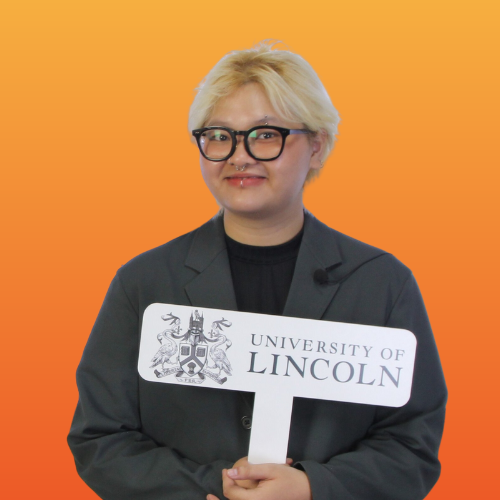
Đỗ Hoàng Quỳnh Hương
University of Lincoln cung cấp cho sinh viên các hỗ trợ vô cùng hữu ích, đặc biệt là cố vấn học tập. Em hy vọng rằng có thể tận dụng được hết các sự hỗ trợ này trong quá trình học tập của mình.

Trương Xuân Đạt
Dịch vụ sinh viên của nhà trường được đánh giá rất cao và quan trọng là mình thích kiến trúc của thành phố Lincoln. Đó chính là những lý do vì sao mình lại lựa chọn University of Lincoln.
Thư viện ảnh
Trường tương tự
Trường Đại học có lịch sử gần 200 năm với chất lượng đào tạo hàng đầu UK

Trường Đại học lớn với cộng đồng đa dạng bậc nhất UK

Trường chuyên ngành luật hàng đầu và lâu đời nhất ở Vương quốc Anh

Trường Đại học năng động và hiện đại hàng đầu Anh Quốc

Trường Đại học doanh nghiệp hàng đầu tại Vương Quốc Anh

Trường Đại học hiện đại có chất lượng đào tạo cao

Ngôi trường được xếp hạng Vàng về chất lượng giảng dạy

Trường đại học có chất lượng đào tạo được đánh giá cao

Trường Đại học đẳng cấp và hiện đại hàng đầu thế giới








Top 10 trường đại học tại Anh Quốc về chất lượng giảng dạy







Top 50 Đại học hàng đầu thế giới về triển vọng quốc tế







